- Meet the Team
- Work with Us
- Czech Republic
- Netherlands
- Switzerland
- Scandinavia
- Philippines
- South Korea
- New Zealand
- South Africa
- Budget Travel
- Work & Travel
- The Broke Backpacker Manifesto
- Travel Resources
- How to Travel on $10/day
Home » Southeast Asia » Travel Safety

Is Indonesia Safe for Travel? (2024 • Insider Tips)
Indonesia is a must-visit country.
There are thousands of islands to explore. It has some of the world’s best snorkelling and scuba spots.
Indo’s got great food, a genuinely interesting mix of cultures and different languages, a fascinating history AND an infectiously laid back lifestyle,.
You’ll also find international quality nightlife in Bali, spot giant lizards on Komodo, chill out in the Gili Islands and get lost in the megacity that is Jakarta.
However, Indonesia is not without its darker side. When visiting, there are quite a few things to consider.
There are violent protests, religious extremists, terrorist attacks and natural disasters such as devastating earthquakes and tsunamis. Then there is the threat of volcanic eruption, some harsh laws to keep in mind, poor air quality and occasional sinking ships!
So yes Indonesia can be bloody dangerous.
But thankfully, I’m here to help you navigate the cultural pitfalls, the petty crime, scams and sometimes scary natural world of this awesome archipelago.
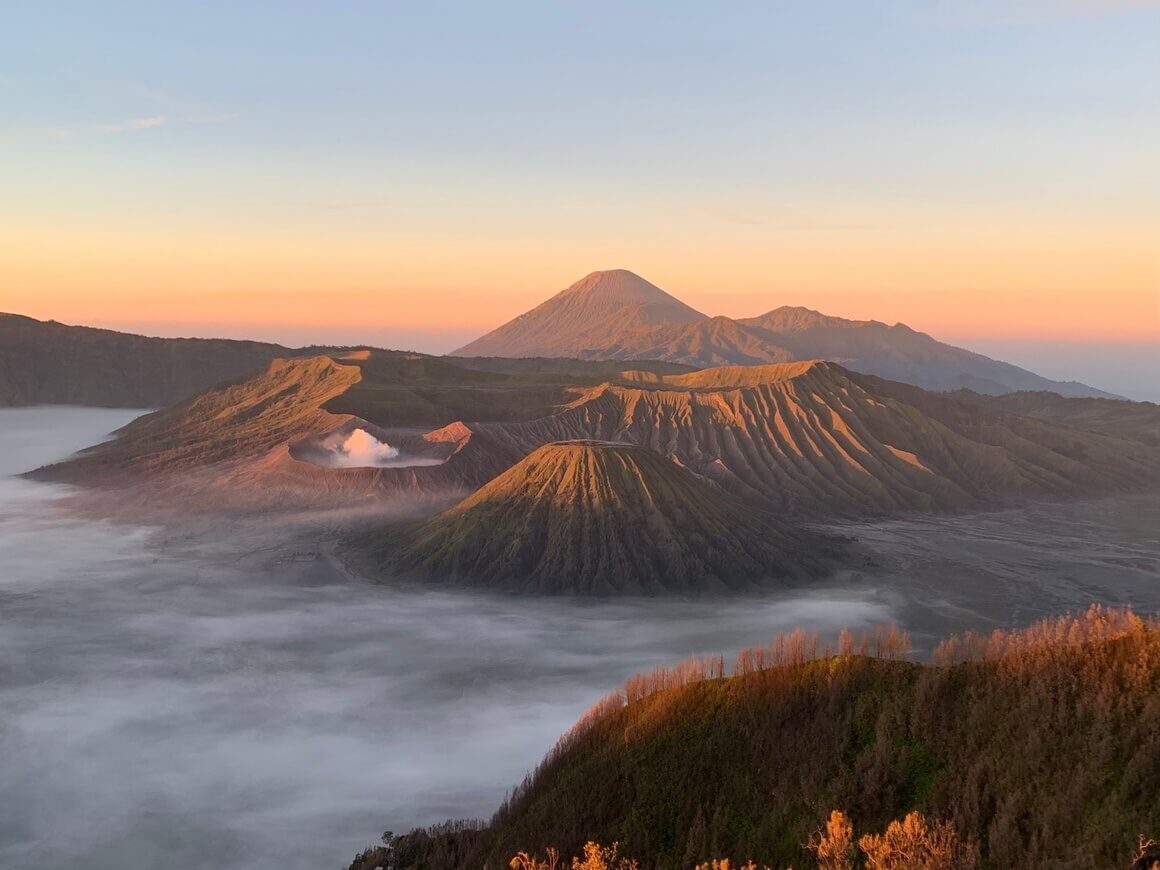
The Broke Backpacker is supported by you . Clicking through our links may earn us a small affiliate commission, and that's what allows us to keep producing free content 🙂 Learn more .
There is no such thing as a perfect safety guide, as things change quickly. The question of “Is Indonesia Safe?” will ALWAYS have a different answer depending on who you ask.
The information in this safety guide was accurate at the time of writing. If you use our guide, do your own research, and practice common sense, you will probably have a wonderful and safe trip to Indonesia.
If you see any outdated information, we would really appreciate it if you could reach out in the comments below. Otherwise, stay safe friends!
Updated December 2023

Unlock Our GREATEST Travel Secrets!
Sign up for our newsletter and get the best travel tips delivered right to your inbox.
Is Indonesia Safe to Visit Right Now?
Safest places in indonesia, top 10 safety tips for traveling to indonesia, is indonesia safe to travel alone, is indonesia safe for solo female travellers, where to start your travels in indonesia, is indonesia safe to travel for families, getting around indonesia safely, what to pack for your indonesia trip, getting insured before visiting indonesia, faq about staying safe in indonesia, so, is indonesia safe.
Much of Indonesia is safe to travel. Around 5,889,031 tourists arrived in the country by 2022 as stated in Indonesia’s statistical report , and travellers mostly had a positive experience.
Visiting Indonesia is fantastic – it’s an amazing place.
Made up of an awesome 17,508 islands, the archipelago that makes up Indonesia would take any traveller an age to explore. It’s a cultural wonderland that is the result of the melding of different traders and conquerors throughout the ages.
However, in this country, there are some issues. There are the standard travel woes of pickpockets and scammers and some of the worst air pollution in the world.
Add to this severe social disparities between rich and poor. Oh, and then there are also violent protests and the threat of terrorism to contend with.
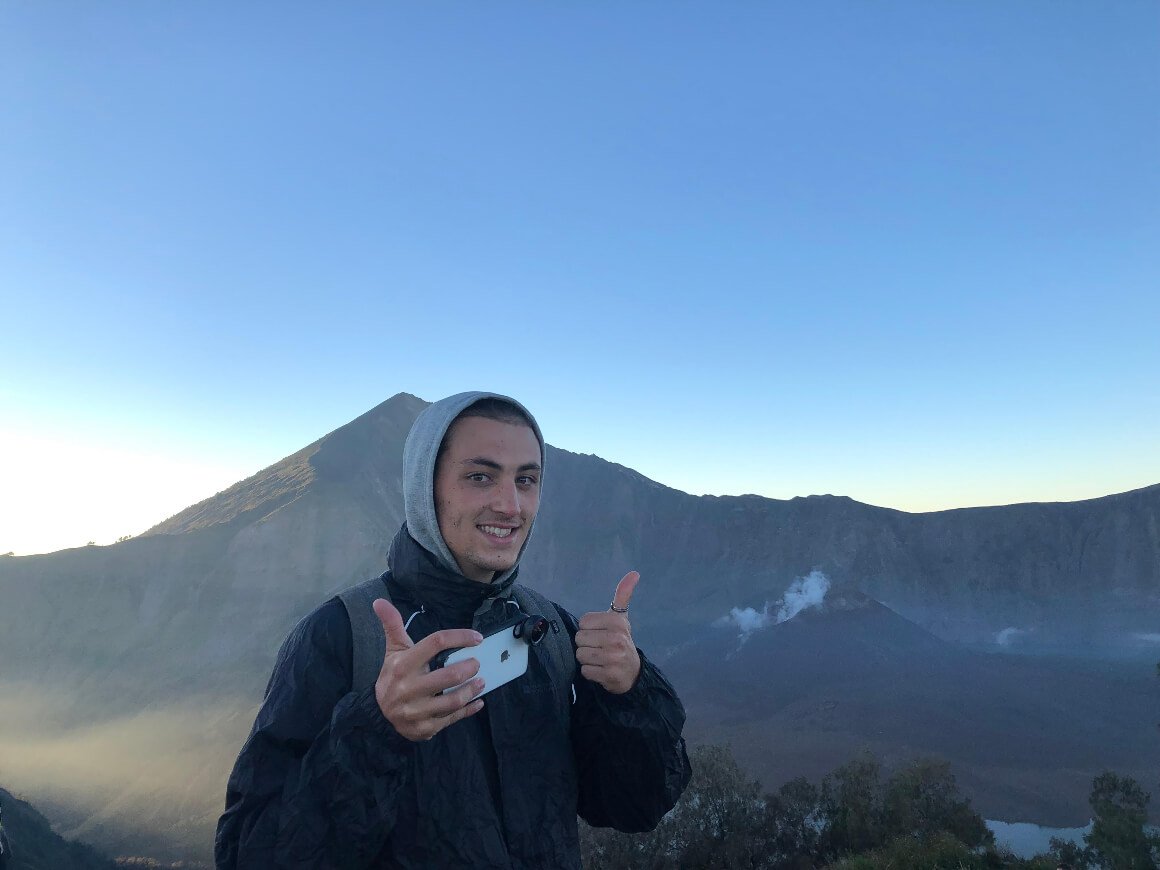
As if the human side of things in this vast nation wasn’t enough to deal with, there’s also nature to take into consideration here. There are many volcanoes in Indonesia like Bali’s Mount Agung (which has been simmering recently), as well as devastating earthquakes and recent tsunamis. It can be a scary prospect.
Generally, Indonesia is (or at least was) known more of a “backpacking” destination than one that’s primed for mass tourism. That said, tourism has been growing a crazy amount in this island nation – and the numbers speak for themselves.
With all this potential seeing these impressive numbers and rankings, the natural is to think, that Indonesia must be pretty safe. And whilst it generally is, learning how to travel safely is of utmost importance and relevance. Even in countries like Indonesia.
The likelihood of you coming into contact with something like a terrorist attack in Indonesia is very, very slim. You’re more likely to experience a seismic tremor.
So I’d definitely say that to answer the question of “ How safe is Indonesia to visit right now? ” would be… safe enough!
Check out our detailed where to stay guide for Indonesia so you can start your trip right!
When choosing where you’ll be staying in Indonesia, a bit of research and caution is essential. You don’t want to end up in a sketchy area and ruin your trip. To help you out, I’ve listed the safest areas to visit in Indonesia below.
Let’s start out with the crown jewel of backpacking in Indonesia – Bali. It’s probably THE safest place in Indonesia, thanks to incredibly friendly locals and a laid-back vibe.
Although it may look tiny on the map, there are many places to stay in Bali as it’s actually quite a large island with many different areas to explore. There’s much more to it than the beaches, including terraced rice fields, several lakes, and a couple of active volcanoes.
The buzzing digital nomad scene has triggered a whole load of coworking spaces to pop up all over the island. In the bubbly town of Pererenan is Tribal , an epic hostel and coworking spot!
Lombok is another Indonesian Island but offers a completely different vibe than Bali. While you can still do adventures like climbing the active volcano Rinjani (it’s a sketchy 2-day climb), Lombok is all about white sand beaches and relaxation.
Apart from the natural disaster threats like earthquakes, especially if you’re staying in good hostels in Lombok , it’s incredibly safe as well.
The only threat you’ll have to face in Flores is being eaten by a Komodo Dragon (which is VERY unlikely). Or, getting a sunburn while exploring the white sand beaches with its incredibly clear water. Flores might not have much to offer for adventure, but it’s the ideal getaway if you want to relax for a couple of days.
Places to Avoid in Indonesia
- Jakarta – Jakarta is a GREAT city to visit and pretty safe as well. But the air quality is definitely not ideal. Smog and dust pollute the air and traffic can be horrible.
- Canggu at night (Bali) – While Backpacking in Bali is totally safe during the day, travellers, especially females, have to take care of their valuables when walking or driving around here at night.
- Active volcanos – It’s not advisable to go within 4 kilometres of the Mount Agung crater in East Bali or within 7 kilometres of Mount Sinabung in Kalo Regency, North Sumatra. Local authorities have set up these exclusion zones due to increased volcanic activity and natural disasters.
- Drugs – not a place, but definitely something to completely avoid in Indonesia. Drugs are highly illegal and possession and use will be punished with the death sentence.
Keeping Your Money Safe in Indonesia
One of the most common things to happen to you whilst travelling is losing your money. And let’s face it: the most annoying way for this to actually occur is when it’s stolen from you.
Petty crime is pretty much a problem all over the world.
The best solution? Get a money belt.

Stash your cash safely with this money belt. It will keep your valuables safely concealed, no matter where you go.
It looks exactly like a normal belt except for a SECRET interior pocket perfectly designed to hide a wad of cash, a passport photocopy or anything else you may wish to hide. Never get caught with your pants down again! (Unless you want to…)
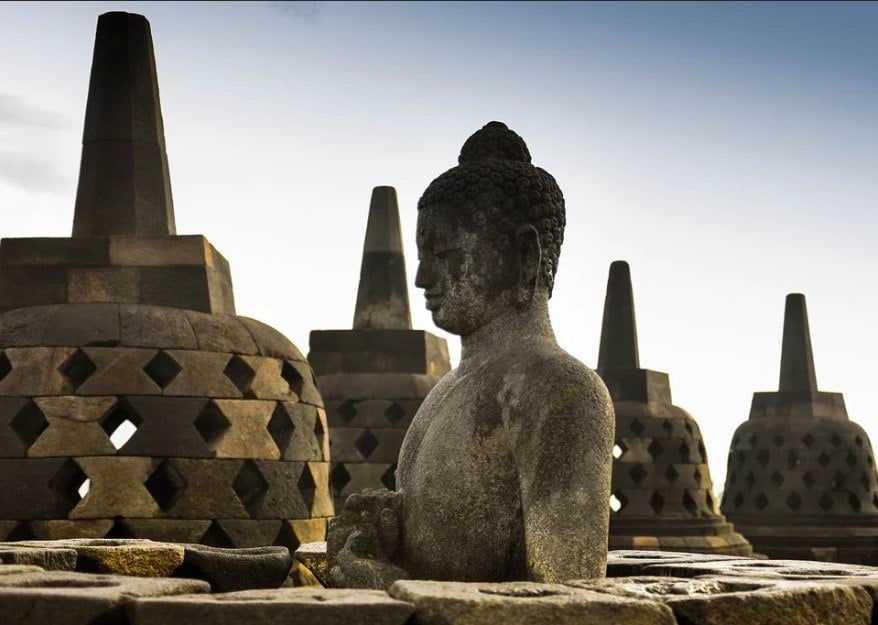
Just because tourism is everywhere in Indonesia, doesn’t mean that it’s always 100% safe.
To help keep yourself as safe and as secure as possible I’m sharing my best safety tips for travelling to Indonesia…
- Keep your belongings close to you and don’t walk around looking flashy – doing otherwise could easily make you a target of crime in Indonesia.
- Blend in – wear low-key, modest outfits, especially around religious sites and in more local areas
- Don’t leave your belongings unattended on the beach – they can easily go missing…
- Always keep an emergency stash of cash – Never keep all your cards/ currency in one place. And hide it all from thieves with a hidden money belt .
- Do not go swimming when you’re intoxicated – it seems like a good idea, but things can very easily go tragically wrong
- Be culturally aware – read up on what you should and shouldn’t do during Ramadan and Balinese New Year
- Muslims and non-Muslims have to abide by Sharia law in Aceh Province – any rules will also apply to you!
- Only use ATMs that look legitimate – and watch your back when you’re withdrawing money
- Keep away from drugs altogether – there’s a zero-tolerance policy her, DON’T RISK IT!
- Take a good medical kit with you – you never know when you might need it!
- Protect yourself against mosquitoes – there is a risk of dengue virus, amongst other things
- Know what to do in the event of volcanic or seismic activity – Keep up to date with local authorities, on local media and with official Indonesian government news .
Indonesia is a fantastic place to go and explore but, as you can see, it’s not always the easiest place to travel around.
The potential for natural disasters and petty crime in Indonesia shouldn’t be ignored.
Volcanic eruptions or other natural disasters can occur with little to no warning. Indonesian authorities are on top of this (for the most part).
If you’re sensible with how you travel, personal safety shouldn’t be an issue- you’ll be fine.
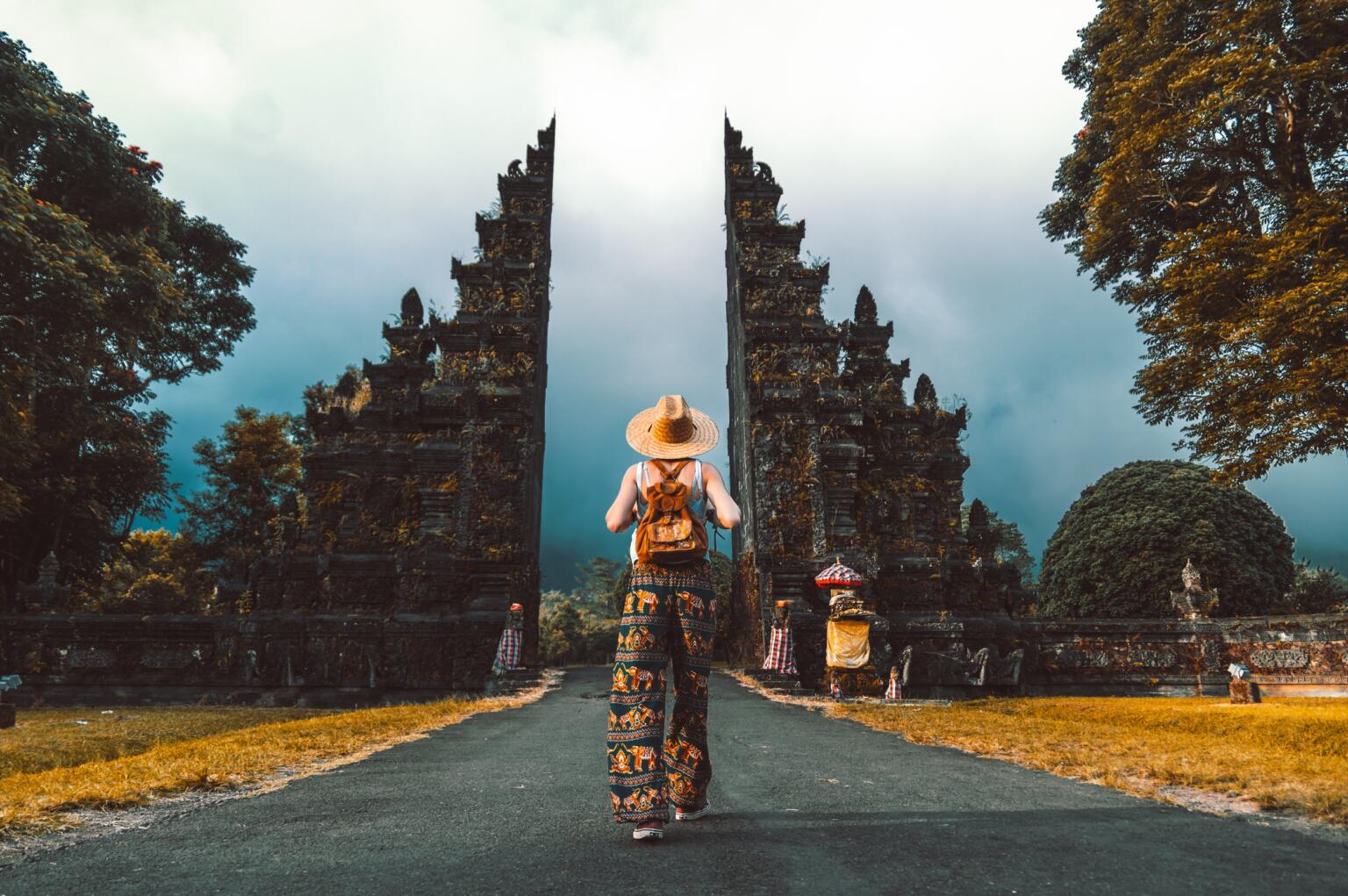
I solo travelled to Indonesia as a teenager. It was awesome. And, I survived!
Whilst solo travel is epic, it can be daunting. I hear you, I’ve been there.
Luckily Indonesia is a pretty good place for solo travellers. It’s been known for a while as a backpacking destination. Certain islands, like Bali, are strongholds of all sorts of travellers.
Indo can be easy to travel. That said, there are still a few things you should consider…
- There are a ton of hostels and homestays spread across the islands of Indonesia. This is a good way to make friends and maybe even get yourself a travel buddy; it’s a good way to start your trip. Make sure you do your research, however, and that places are rated highly by other solo travellers.
- Ask the local friends you’ve made, your taxi driver, or the staff at your accommodation for their insider knowledge .
- Carry around only the money that you need .
- Have different ways of accessing your money . Make sure you’ve got money set aside, stashed in a day pack etc.
- Don’t get really wasted . Not only women but also men can get into dangerous situations by losing their senses and good judgement by being completely drunk.
- Keep in touch with people back home – your mum will thank you!
- Travel light .
Solo travel in Indonesia is super fun. It is definitely worth your time exploring all the islands and finding the right places for you. Still, you will have to make sure you keep your wits about you, as you’ll be the only one looking out for you.
Make sure you stay aware of local customs and laws, too, and most importantly… TRAVEL SENSIBLY! You’ll be fine.
Psssst…. Searching for your Tribe?
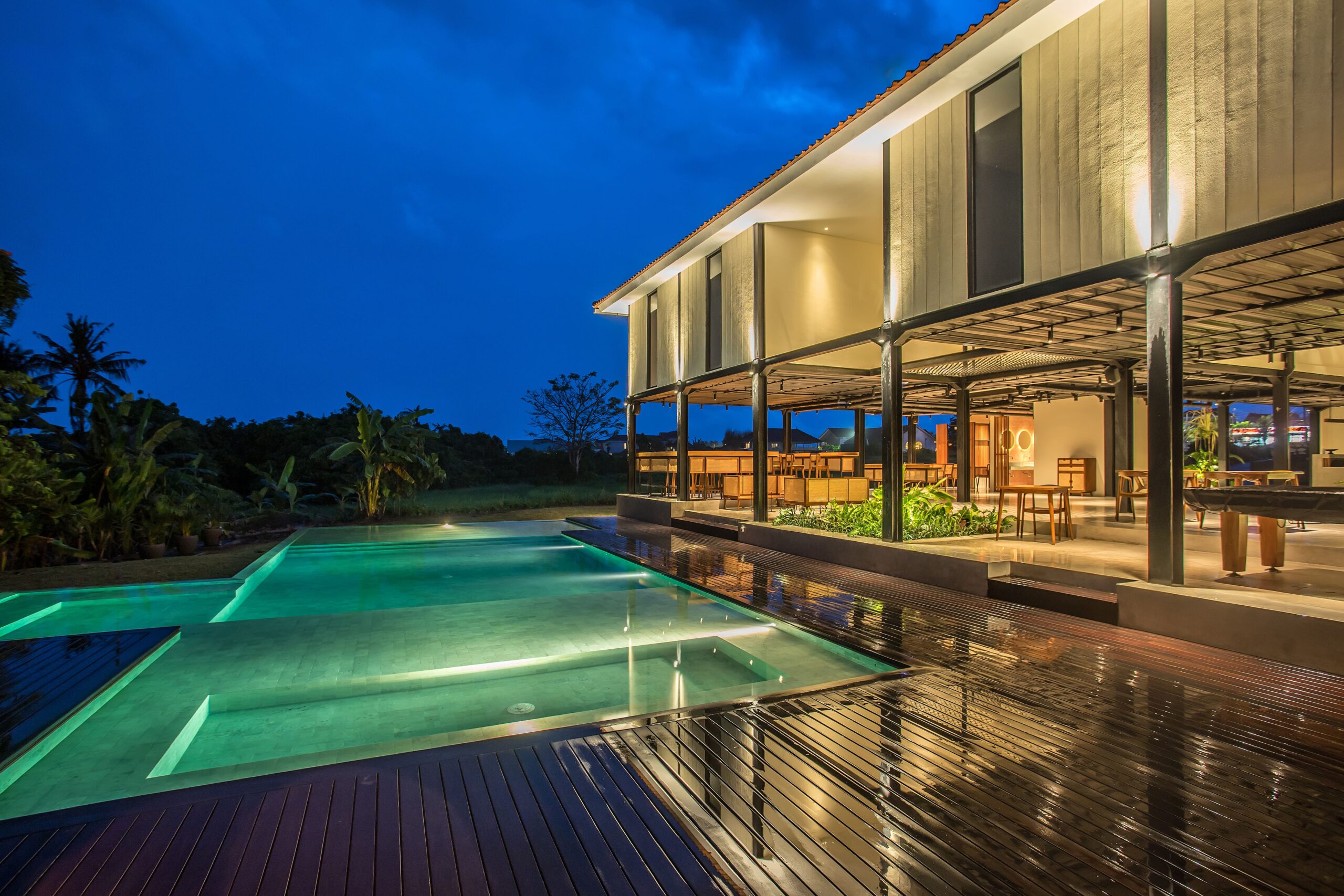
Tribal Hostel – Bali’s first purpose-built co-working hostel and perhaps the greatest hostel in the world!
An ideal hub for Digital Nomads and backpackers, this very special hostel is now finally open…
Come on down and enjoy amazing coffee, high-speed wifi and a game of pool 😉
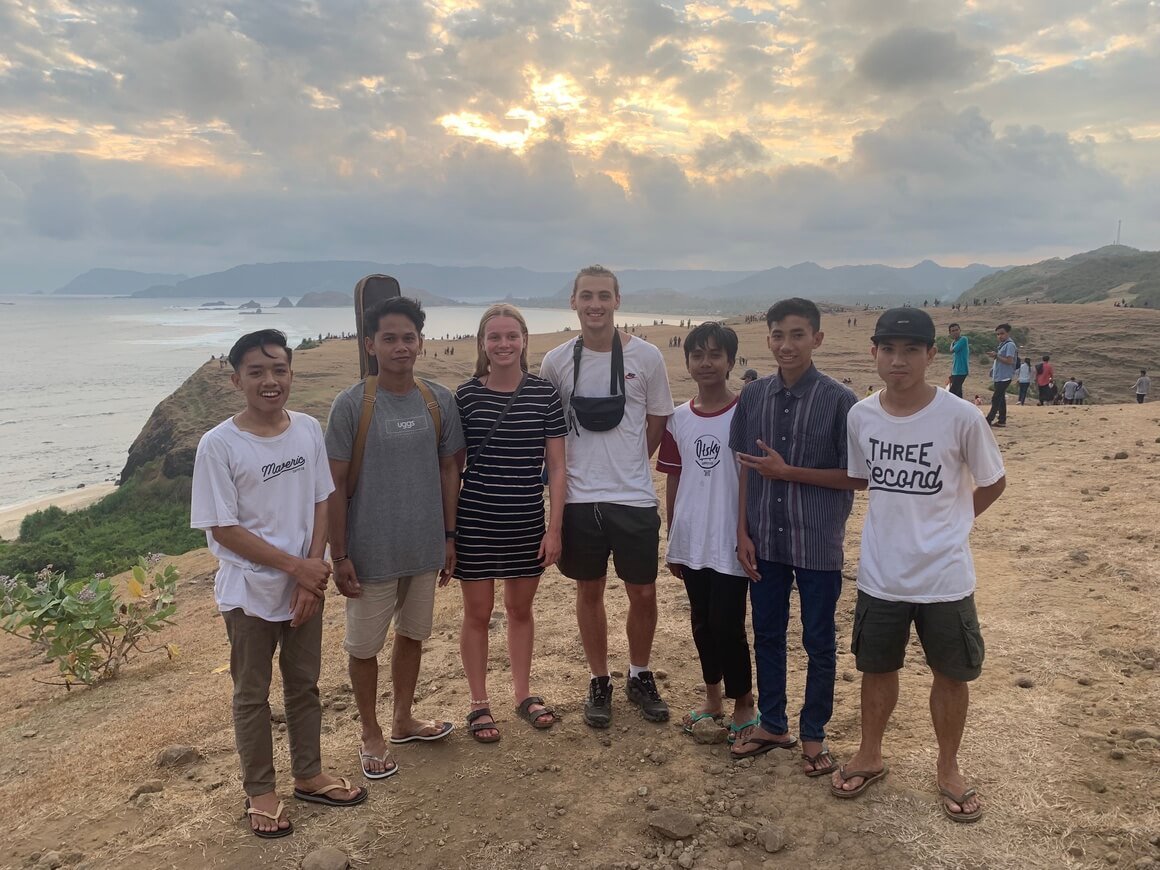
Is Indonesia dangerous for solo female travellers? Possibly. But generally not.
There are some important conversation topics here…
Even for female travellers, Indonesia is a fun place to travel. Solo female travellers flock to places like Bali to enjoy the beauty of the island.
In some areas of the country, you will need to pay more caution than in others. So, here are my tips for solo female travellers in Indonesia.
- Knowing what to wear , as well as where and when wearing certain clothes is appropriate, is important when you are travelling around Indonesia.
- In Aceh , for better or worse, Sharia law is in place. Women have to, by law, cover their hair with a headscarf, and cover their arms and legs.
- Horn honking and catcalling from Indonesian men does happen, unfortunately. When or if it does occur, it’s best just to ignore it and walk on.
- If someone is asking too many questions about where you’re staying, you’re itinerary or if you’re married, just lie. You don’t have to tell them the truth.
- Look up the places you will be staying at before you start out on your trip.
- Beware of drink spiking . This does happen and the best way to avoid is to keep an eye on your drink.
- There is nothing wrong at all with hiring a guide – just make sure the guide, or tour company, is well-reviewed (especially by other female travellers) and trustworthy.
Like everywhere in the world, women travelling by themselves in Indonesia are more at risk than their male counterparts. The usual rules apply, the same things you might do in your hometown anyway: trust your gut and don’t wander around at night by yourself.

Bali is one of the world’s travel hotspots at the moment. It’s a very safe island with an incredible amount of things to do and see. From stunning nature and action to white-sand beaches and digital nomad cafes, Bali a top place to visit.
Indonesia might not be the atypical destination to take your children on holiday, but why not?!
I met lots of families on my recent trip to Indonesia. It’s not always going to be straightforward though (depending on how you travel).
In fact, if you feel like dipping your toe into the diverse country of Indonesia and its myriad cultures – and want your children to be able to safely lap it all up – then Bali is a great starting point. Safety in Bali is significantly greater than in other of the country’s major cities or tourist destinations.
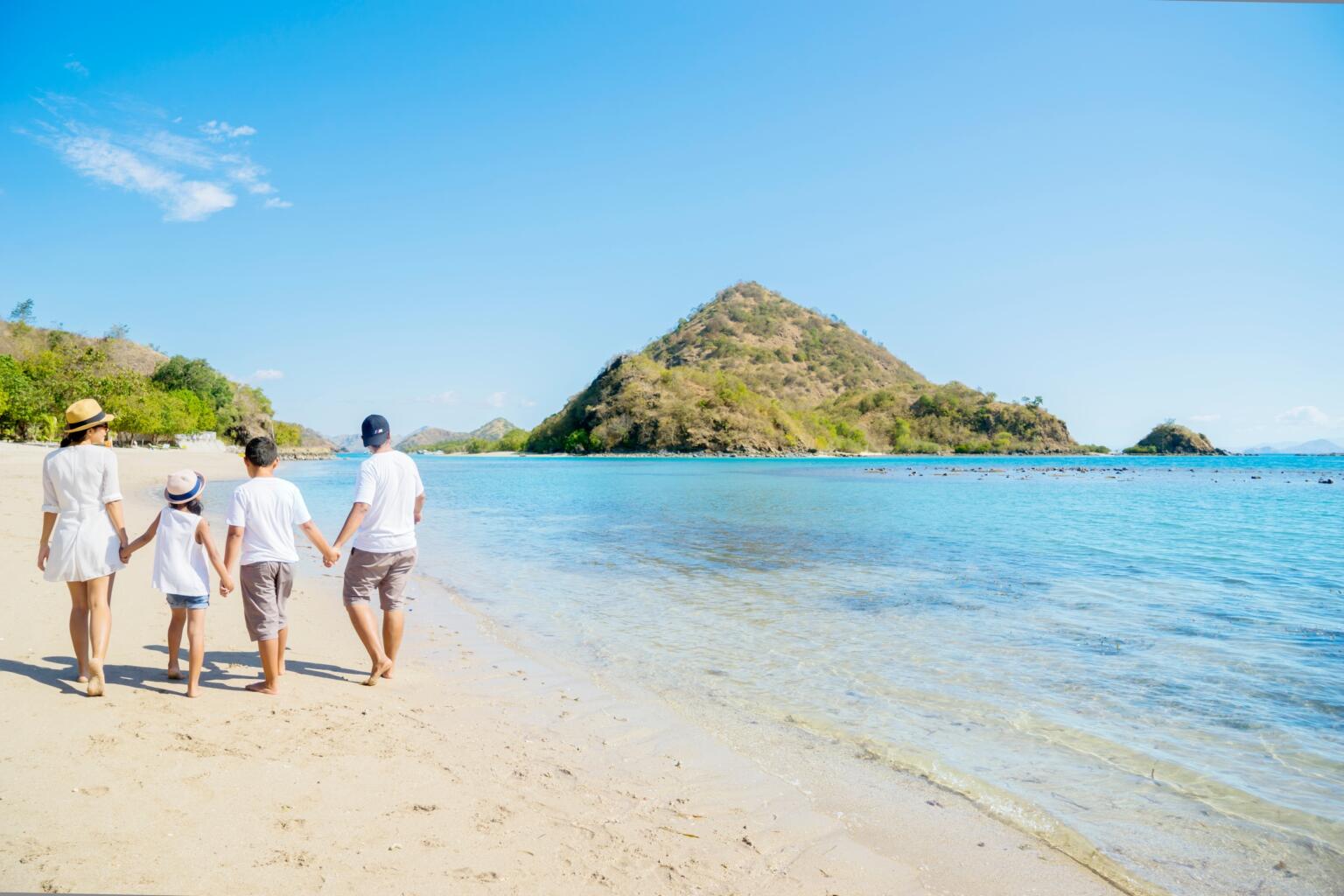
Here you will find a host of child-friendly facilities all across the island that will cater towards families. There are resorts and hotels in the southern part of the island and clean cafes with good food on offer.
In other parts of Indonesia, however, these kinds of child-friendly specialities are much harder to come by.
If you’re travelling with younger children, it’s best to bring some sort of carrier as opposed to a pram. This is the done thing in this part of the world anyway, plus getting a pram around on the non-existent pavements is just not going to be fun at all.
When it comes to breastfeeding, don’t do it in public, especially in more conservative places. It’s best to see what other local ladies are doing and follow suit.
Though it probably will be a challenge (unless you stay in a lovely resort or luxury accommodation in Bali ), Indonesia will be a rewarding place to travel with your children. It’s somewhere they aren’t likely to forget soon!
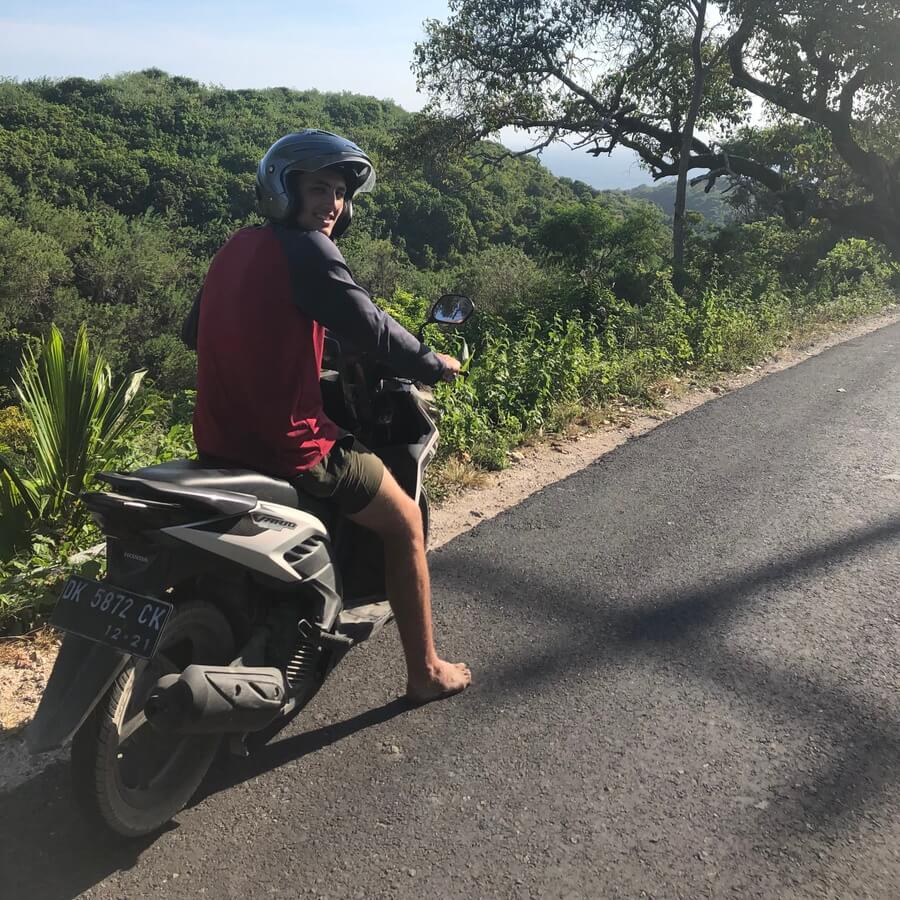
Indonesia can be a pretty… hair-raising place to drive.
Local drivers are not the best, the roads are not always the best, and the extreme weather that hits the islands can mean those roads only get worse – and more dangerous. Oh, and getting an international driving permit isn’t always a smooth experience.
People don’t always follow the traffic rules in Indonesia. This means that it can be a pretty stressful place to drive, especially if you have never driven in a place like this before.
Most people rent scooters or motorbikes when in Indonesia. I urge you to be careful when hiring a motorbike.
Make sure you have prior experience, know how to ride one, and that your travel insurance covers you in case of an accident. WEAR A HELMET!
Cycling in Indonesia is increasingly popular and a wonderful safer alternative.
Uber was but no longer is in operation in Indonesia. Instead, the Malaysia-founded, Singapore-based Grab moved in and got all the business.
Taxis are plentiful in Indonesia, normal to use, and are, in general, pretty safe to use. However, you should make sure that you only take journeys with a reputable taxi company; and definitely do not use unlicensed taxi drivers.
Buses come in all shapes and sizes in Indonesia. Large buses are mainly used as city transport on Java; Jakarta, for example, has a wide-reaching bus system that’s very cheap. It’s not always straightforward and can be plagued by pickpockets, so use it with caution.
Minibuses are the classic way to get around and are pretty ubiquitous. This is the mainstay for both locals and backpackers. They trundle both in and around cities, as well as between destinations. They go by many different local names, too.
Everyone’s packing list is going to look a little different, but here are a few things I would never want to travel to Indonesia without…
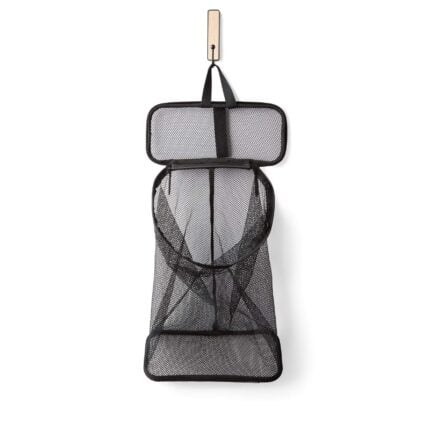
Hanging Laundry Bag
Trust us, this is an absolute game changer. Super compact, a hanging mesh laundry bag stops your dirty clothes from stinking, you don’t know how much you need one of these… so just get it, thank us later.

A decent head torch could save your life. If you want to explore caves, unlit temples, or simply find your way to the bathroom during a blackout, a headtorch is a must.

Yesim stands as a premier eSIM service provider, catering specifically to the mobile internet needs of travellers.

Monopoly Deal
Forget about Poker! Monopoly Deal is the single best travel card game that we have ever played. Works with 2-5 players and guarantees happy days.

This is a regular looking belt with a concealed pocket on the inside – you can hide up to twenty notes inside and wear it through airport scanners without it setting them off.
I always get asked “ Is Indonesia safe for tourists? ” If you’re worried about safety the best plan of action is to watch your own back by arming yourself with some good quality Indonesian travel insurance .
ALWAYS sort out your backpacker insurance before your trip. There’s plenty to choose from in that department, but a good place to start is Safety Wing .
They offer month-to-month payments, no lock-in contracts, and require absolutely no itineraries: that’s the exact kind of insurance long-term travellers and digital nomads need.

SafetyWing is cheap, easy, and admin-free: just sign up lickety-split so you can get back to it!
Click the button below to learn more about SafetyWing’s setup or read our insider review for the full tasty scoop.
Here are some quick answers to common questions about safety in Indonesia.
What should I avoid in Indonesia?
Avoid these things in Indonesia to stay safe: – Don’t disrespect the local culture – Keep your belongings close to you and don’t walk around looking flashy – Don’t keep your phone in your hand when walking on the street – Avoid using individual ATMs on the side of the road – opt for the ones inside shops and banks
Is Indonesia safe for solo female travellers?
If you use your common sense and don’t go looking for trouble, Indonesia can be very safe for solo female travellers. Local people are genuinely friendly and welcoming. Catcalling is hardly a thing but be prepared to be stared at quite a bit. Don’t worry, this is normal and no threat at all.
Is Indonesia safe to live in?
While it’s not easy to get the right visa, living in Indonesia can be a real treat and super safe if you adapt to the local culture – known for its cheap cost of living and laid back lifestyle. Nature will be the biggest safety concern, with mosquito-carried illnesses, earthquakes and tsunami threats.
What are the laws in Indonesia?
Laws and rules in Indonesia are strict. The number one aspect to be careful of is drugs. Many backpackers indulge in the occasional spliff or dosage of party powder. THIS IS A TERRIBLE IDEA IN INDONESIA! Gambling is also illegal. Indonesia is partly a Muslim country – and some regions such as Aceh Regiosn follow Sharia Law. If you’re unsure, dress modestly and look at Indonesian law websites or even better, investigate your own country’s or Indonesia’s Official Gov Website.
How much crime is in Indonesia?
There isn’t a great threat of organised violent crime from terrorist groups. It’s mainly petty crime such as pickpocketing. When visiting Indonesia, take caution to ensure personal safety, as crime is not popular here, but far from invisible. If you are suspicious or feel unsafe, alert local authorities or Indonesian authorities immediately.
Yup, Indonesia is definitely safe , especially if you follow my travel tips. The country isn’t completely without its issues but where isn’t? Your visit to Indonesia will most probably end safely and happily and you will be excited for your return.
Indonesia is one of my favourite places I’ve ever travelled to. Don’t let safety concerns discourage you from visiting what is truly a remarkable country. Just be sure to exercise caution and keep your wits about ya!
My final recommendation is to make sure you keep up to date with relevant government advice. I’m from the UK, so I always check the gov.uk website for travel advice, Wherever you’re from, your government should have its own alternative.
If you have any more questions or comments, feel free to drop them in the comments section below.
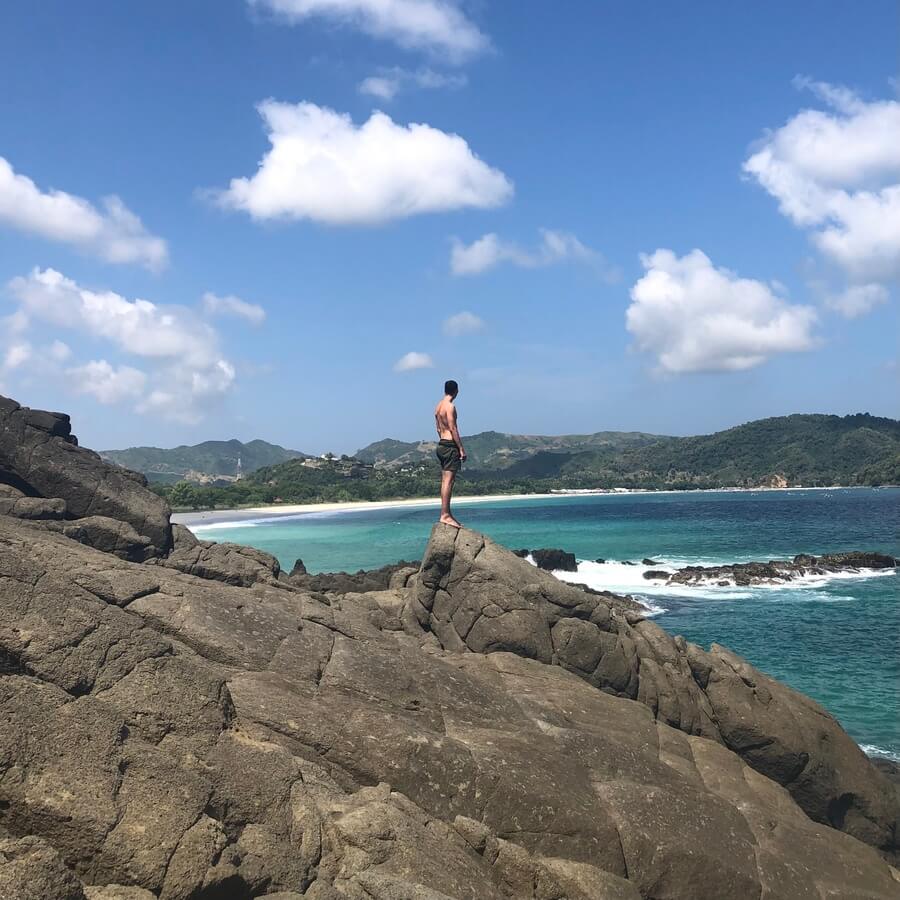
Looking for more info on traveling to Indonesia?
- Let me help you choose where to stay in Indonesia
- Swing by one of these fabulous festivals
- Check out my favorite Airbnbs in the centre of all the action
- Plan the rest of your trip with our fantastic backpacking Indonesia travel guide!
- Take a look at my expert travel safety tips learned from 15+ years on the road
Disclaimer: Safety conditions change all over the world on a daily basis. We do our best to advise but this info may already be out of date. Do your own research. Enjoy your travels!

Joe Middlehurst
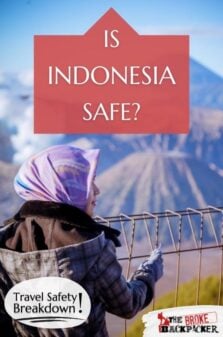
Share or save this post

This a great blog Rose. Very nice to see information on traveling as a solo female backpacker. I hope you can come to flores and Komodo. We have the only locally woman owned dive center. As well we do Komodo Tours. I have been learning about blog writing as well…but i am now where near as good as you are …hehe. I hope you can make it to flores, please stop by our office in Labuan bajo and say hello. You can find us at komodoislandtour
Leave a Reply Cancel reply
Your email address will not be published. Required fields are marked *
Save my name, email, and website in this browser for the next time I comment.
Notify me of followup comments via e-mail.
- English (EN)
- Español (ES)
- Português (BR)
Is Indonesia Safe? Crime Rates & Safety Report

- Indonesia : Safety by City
Indonesia is a transcontinental country, mainly located in Southeast Asia, with some territories stretching into Oceania too.
It is located between the Indian Ocean and the Pacific Ocean and has land borders with Malaysia to the north, East Timor and Papua New Guinea to the east, Australia to the south, and Palau, the Philippines, Vietnam, Singapore, and Thailand to the north.
It is geographically interesting since, with 18,110 islands, out of which around 6,000 are inhabited, Indonesia is the largest archipelago in the world.
It is the largest country in Southeast Asia, and astoundingly many people live in it: about 240 million people.
However, Indonesia’s islands and gorgeous beaches aren’t the only things attractive about this country: it offers vast tropical forests stretching days on end, although in the last couple of years, they are being endangered and cut down at an alarming speed.
You should also count in the big cities such as Jakarta and popular islands such as Bali, where the rich tourists enjoy basking in clear waters, or just shopping.
This country truly offers a variety of options for all kinds of tourists.
- Warnings & Dangers in Indonesia
OVERALL RISK: MEDIUM
Indonesia is mostly a safe country to travel to, though it still has its dangers from natural disasters to terrorism and petty theft. Be very cautious on the streets of Indonesia and plan your trip carefully.
TRANSPORT & TAXIS RISK: MEDIUM
Though public transport is significantly better than in its neighboring countries, you should always try to call your reliable taxi driver instead of hailing one on the streets. There are many taxi-related scams, where taxi drivers drive off before you get a chance to take your luggage or force you to collect money from an ATM. Keep in mind that road conditions and drivers' behavior are probably different from what you're used to.
PICKPOCKETS RISK: HIGH
Pickpocketing and bag snatching is a very common issue in Indonesia, especially in public and crowded places like bus and train stations and airports. Keep your belongings by your side at all times and try to leave all your valuables in a security deposit box of your hotel.
NATURAL DISASTERS RISK: MEDIUM
Since it is located on the Pacific Ring of Fire (which is the name of an area with a high degree of tectonic activity), Indonesia is especially susceptible to risks of volcanic eruptions, earthquakes, but also floods and tsunamis.
MUGGING RISK: MEDIUM
Mugging in Indonesia is generally rare, and foreigners are rarely targeted. Violent crime rates are not too high though you should still avoid dark and deserted areas.
TERRORISM RISK: HIGH
There is a high risk of this country being targeted for a terrorist attack. Recent ones involved suicide bombings and small-arms fire. The last one was performed on May 24th, 2017 when there were bomb explosions at the Kampung Melayu bus station in East Jakarta, killing three police officers.
SCAMS RISK: MEDIUM
Scams are an issue in Indonesia, like in most countries, and you should be very vigilant, decline all drinks sent by strangers (since drink spiking is very common in this country), double-check every information and negotiate everything in advance. The most common scams in Indonesia are credit card-related, so be careful when collecting your money.
WOMEN TRAVELERS RISK: MEDIUM
Indonesia is not the safest for solo female travelers. There is the risk of getting unwanted attention or even the risk of sexual assaults toward women. Avoid parts of cities that are filled with bars and clubs, and visiting them alone, since there is a higher chance of running into intoxicated people.
- So... How Safe Is Indonesia Really?
Indonesia is, for the most part, safe to visit, though you should keep in mind many dangers that may befall you if you plan on visiting this gorgeous country.
There are many threats that lurk in Indonesia, from natural disasters like earthquakes, tsunamis, and volcanoes, to social disturbances such as terrorism, attacks, corruption, and crime.
Though crime rates in this country aren’t the biggest issue, and it’s mostly non-violent, you should still take care and be extra cautious.
Muggings, petty theft, and pickpocketing still happen in Indonesia, especially in crowded places such as bus and train stations, markets and areas frequented by tourists.
Watch your laptops, cell phones, valuable cameras and money as thieves have been known to snatch them.
Also, be careful on public transport, since that’s where pickpockets operate and where you can encounter several forms of crime.
Be wary of people sending you drinks since drink spiking is an issue in this country.
Choose your taxis with precaution and always call a reliable driver instead of hailing one on the streets.
Another issue in Indonesia is the politics and the separatist movements that often clash in violent demonstrations and armed struggles in places like Aceh and Papua.
Bear in mind that political events such as elections in Indonesia are often the times of violent and messy demonstrations that you should avoid since they can become so violent that even Indonesian military has to apply violent measures in order to control the protesters.
- How Does Indonesia Compare?
- Useful Information
Many countries must obtain a visa from one of the Indonesian diplomatic missions, though there are some countries that do not need it at all for any stays shorter than 30 days. Make sure your passport is valid for 6 months and that you have at least two blank pages in your passport upon your arrival in Indonesia.
The Indonesian rupiah is the official currency in Indonesia. ATMs and money exchange offices are widely available in most of Indonesia's cities though they might be harder to find in rural areas.
Indonesia mostly has a tropical climate characterized by hot and humid weather during the entire year, with very high temperatures, especially along the coastlines. Cooler temperatures can be expected in the highlands of the country.
Soekarno–Hatta International Airport, commonly referred to as Soetta is the busiest and the primary airport in the Greater Jakarta area on the Indonesian island of Java. It is located at Benda, Tangerang, about 20 km northwest of central Jakarta.
Travel Insurance
Just like anywhere else, we recommend getting travel insurance when traveling to Indonesia, since it covers not only the costs of medical problems but also theft and loss of valuables.
Indonesia Weather Averages (Temperatures)
- Average High/Low Temperature
Indonesia - Safety by City
Explore indonesia.
- 10 Cheapest Places to Live in Indonesia
- 10 Most Dangerous Cities in Indonesia
- 9 Best Zoos & Aquariums in Indonesia
- 10 Best Flea Markets In Indonesia
- 10 Safest Cities in Indonesia
- 16 Pros and Cons of Living in Indonesia
- Where to Next?

29 Reviews on Indonesia
Thanks a lot for good information of Indonesia given by you. I think to travell to Indonesia, thailand, Malaysia, Hong kong, Brunei, etc countries of eastern side of the world.
the scam one is supposed to be high since the indonesians like to scam people
pretty weird, im indonesian and i never been scammed in my own territory
Not all indonesians
I visited Singapore recently and found it very safe to travel. It is really beautiful and clean. Although it is a bit costly but the beautiful Sentosa , universal studios, garden by the bay are worth the money paid. According to me, a person should visit Singapore once in his or her lifetime.
Ok, but this is not about Singapore but Indonesia…
Someone needs a geography lesson.
Best of all
My family in Jawa tengah…. Cause these virus corona…. I can’t go back to them…. When… When is the same time I want to go back.
I miss my family
YOUR GRAMMAR IS UNIQUE
Learn English
What a dumb reply. Not even a slightly clever troll
Thank you so much
This was very very use ful for my geography report on Jakarta thank you so much
So thank you and I have a lot of knowledge
It is very helpful on the safety part on my Geography Report on Indonesia
Amazingly Welcoming
I had an absolutely amazing time visiting this country. Everyone I personally met was extremely helpful and friendly and especially patient with me through a language barrier. Bottom line, this country will fail to disappoint and the best places, for me, were places off of the beaten tourist path to immerse yourself in the culture and really nice locals. And the folks there just have a generally greeting nature and vibe from everything I’d experienced. I’ll go back, for sure.
Asking for information
That is good to know. I am thinking of visiting there too. Is there camping and outdoor stuff to do? Thank you
Indonesia is cool in full of the beautfuls girls ever
I love indonesia girls
You can’t expected before you coming, all people are welcome always smile make a positive energy when you going place to place. so someday i hope can coming again.
BTW If your lgbtq dont go I almost got put to death :/
Stay the hell away!
DANGER! BEWARE! Terrorists could be lurking around anywhere…don’t risk your life.
They can be anywhere in Europe, also.
Just because Indonesia is Muslim doesn’t mean it’s ridden with terrorists.
Then whats the point of going there and thanks I know what to right about Indonesia and that they are scammers, terrorists, rapist etc
Cheap and good
Been to Indonesia many times. My wife love to shop there Before Christmas. Is safe to travel there, the people are helpful and polite. other countries we went, wasn’t as good as Indonesian hospitality.
Not sure about the other parts, but Bali is pretty safe. Only thing to watch out for is when you are shopping, people often try to rip you off, and try really hard to sell their products, so try not to be pressured into buying things you don’t need. Other than that Bali is very safe.
Life in Indonesia
I lived in Malang Indonesia for about 8 years. During my entire time in the country, I only had – 1 maid that we caught stealing. She was stealing the money out of my bedside table but never removed any of it from our home, she hid it in her room. I found the local people to be truly polite and helpful in any way possible. Health care is extremely poor and their Doctors are the least educated and the worst in the world.
I spent 30 years working and traveling to different countries of the world so I speak about medical care from experience, in addition, I am a Paramedic from the USA and people in the USA get better and more advanced care thru EMS in the USA than a major hospital in Indonesia.
In Malang, their biggest and most advanced hospital had 1 cardiac monitor for the entire hospital of about 300 beds. With dengue fever and Malaria being major health risks I found this totally unacceptable by Western standards. I actually saw medical mistakes take many lives when living there and if I became ill. I went to Singapore.
Other than health care I love Indonesia and since I have now retired I am really thinking about moving back there. The cost of living is pennies compared to the USA and I personally would trust an Indonesian before almost any American I know. If you travel there you will really feel welcome and enjoy yourself immensely.
Good Outline
I am an Indonesian and have been living in Indonesia with occasional travels abroad. Having been travelling within Indonesia, I would say the travel safety outline is almost 100% correct. Larger cities are less safe and smaller towns are mostly very safe. With the exception of certain provinces which have seen conflicts.
Your warning about public transportation is unfortunately correct, particularly in Jakarta. Almost everyone who uses public transportation experiences encounter with pickpockets, some more than one time. I am included.
One thing to add (if appropriate), traffic safety. Please be reminded, bad driving manner is persistent not only amongst motorists. You have to be very careful with practically every vehicle nearby.
Idk indonesia Jamie is. creep
Share Your Experience Cancel reply
Your Review
Title of your review
Article Contents
- Overall Risk
- Transport & Taxis Risk
- Pickpockets Risk
- Natural Disasters Risk
- Mugging Risk
- Terrorism Risk
- Women Travelers Risk
- Weather Averages (Temperatures)
- User Reviews
- Share Your Experience
Popular Destinations

Safety Index
Recent reviews & comments.
- Wade Andrews on Dodge City
- Kevin Wright on Dodge City
- Drew Jones on Dodge City
- Patrick Brown on Mackinac Island
- Dwayne Ford on Mackinac Island
Popular US States
- Pennsylvania
Security Alert May 17, 2024
Worldwide caution, update may 10, 2024, information for u.s. citizens in the middle east.
- Travel Advisories |
- Contact Us |
- MyTravelGov |
Find U.S. Embassies & Consulates
Travel.state.gov, congressional liaison, special issuance agency, u.s. passports, international travel, intercountry adoption, international parental child abduction, records and authentications, popular links, travel advisories, mytravelgov, stay connected, legal resources, legal information, info for u.s. law enforcement, replace or certify documents.
Before You Go
Learn About Your Destination
While Abroad
Emergencies
Share this page:
Travel Advisory July 24, 2023
Indonesia - level 2: exercise increased caution.
Reissued with obsolete COVID-19 page links removed.
Exercise increased caution in Indonesia due to terrorism and natural disasters. Some areas have increased risk. Read the entire Travel Advisory.
Do Not travel to:
- The provinces of Central Papua (Papua Tengah) and Highland Papua (Papua Pegunungan) due to civil unrest.
Terrorists continue plotting possible attacks in Indonesia. Terrorists may attack with little or no warning, targeting police stations, places of worship, hotels, bars, nightclubs, markets/shopping malls, and restaurants.
Natural disasters such as earthquakes, tsunamis or volcanic eruptions may result in disruptions to transportation, infrastructure, sanitation, and the availability of health services.
Demonstrations occur frequently and have the potential to become violent. Avoid demonstrations and crowds.
Indonesia’s revised criminal code, which takes effect January 2026, includes penalties for defamation, blasphemy, cohabitation, and sex outside of marriage. It is unclear how Indonesian authorities will implement the revised criminal code.
Read the country information page for additional information on travel to Indonesia.
If you decide to travel to Indonesia:
- Monitor local media for breaking events and be prepared to adjust your plans.
- Visit the websites for Badan Geologi (Indonesian Geological Agency, Indonesian language only) for the latest information from the Government of Indonesia on current natural disasters.
- Review the CDC’s suggestions on how to prepare for natural disasters.
- Be aware of your personal safety and security at all times.
- Enroll in the Smart Traveler Enrollment Program ( STEP ) to receive alerts and make it easier to locate you in an emergency.
- Ensure your passport is valid for at least six months beyond your intended stay.
- Follow the Department of State Facebook and Twitter . Follow the U.S. Embassy Jakarta on Facebook , Instagram , and Twitter .
- Review the Country Security Report for Indonesia.
- Prepare a contingency plan for emergency situations. Review the Traveler’s Checklist .
Central Papua and Highland Papua– Level 4: Do Not Travel
In Central Papua and Highland Papua, violent demonstrations and conflict could result in injury or death to U.S. citizens. Avoid demonstrations and crowds. Armed separatists may kidnap foreign nationals.
The U.S. government has limited ability to provide emergency services to U.S. citizens in Central Papua and Highland Papua as U.S. government employees must obtain special authorization before traveling to those areas.
Embassy Messages
View Alerts and Messages Archive
Quick Facts
Six months beyond arrival date. Indonesia does not accept the 12-page U.S. emergency passport for entry into Indonesia.
Two blank visa pages required for entry stamp
Yes, Visa or Visa on Arrival
100,000,000 Indonesian rupia (approx. $7,000 USD)
Embassies and Consulates
U.s. embassy jakarta.
Jl. Medan Merdeka Selatan No. 3 - 5 Jakarta 10110, Indonesia Telephone: +(62)(21) 5083-1000 Emergency After-Hours Telephone: +(62)(21) 5083-1000 ext. 0 (operator) Email: [email protected]
U.S. Consulate General Surabaya Jl. Citra Raya Niaga No. 2 Surabaya 60217 Indonesia Telephone: +(62)(31) 297-5300 Emergency After-Hours Telephone: +(62)(811) 334-183 Email: [email protected]
U.S. Consular Agency Bali Jalan Hayam Wuruk 310, Denpasar, Bali Telephone: +(62)(361) 233-605 Emergency After-Hours Telephone: Please contact the U.S. Consulate in Surabaya:+(62)(811) 334-183 Email: [email protected]
American Consulate Medan, Sumatra Uni Plaza Building 4th Floor (West Tower) Jl. Let. Jend. MT Haryono A-1 Medan 20231, Indonesia Telephone: +(62)(61) 451-9000 Emergency After-Hours Telephone: +(62)(61) 451-9000 Email: [email protected]
The U.S. Consulate in Medan provides only emergency assistance to U.S. citizens and does not offer routine consular services.
Destination Description
See the Department of State’s Fact Sheet on Indonesia for information on U.S.- Indonesia relations.
Entry, Exit and Visa Requirements
Entry Requirements: To enter Indonesia, your passport must have at least two blank pages and be valid for at least six months beyond the date of your arrival in Indonesia. If your passport does not meet these requirements, you will be denied entry into Indonesia. The Government of Indonesia will not admit travelers holding the 12-page U.S. emergency passport, issued by U.S. embassies and consulates overseas.
Visa-on-Arrival: If you meet the requirements, you can apply for a visa on arrival at some international airports, seaports, or land crossings. To apply for the visa on arrival, you must have an ordinary (non-emergency) passport with at least 6 months of validity from the date you plan to enter and the date you plan to leave Indonesia and a return or onward flight booking to another country. There is a 500,000 Indonesian Rupiah fee (about $35). The visa on arrival is valid for up to 30 days. You may extend a Visa-on-Arrival once at the immigration office one week before it expires for an additional 30 days for a maximum of 30 additional days, for another 500,000 Rupiah.
- Official visit or government duties;
- Business meeting;
- Procurement of goods;
- Official meeting; or
Electronic Visa-On-Arrival: You may also apply for an electronic Visa on Arrival (e-VOA) in advance if you are entering Indonesia at Soekarno-Hatta International Airport in Jakarta or Ngurah Rai International Airport in Bali. Check the e-VOA requirements from Indonesian Immigration before applying. To apply for an e-VOA see https://molina.imigrasi.go.id/ .
Visa: Travel for more than 30 days and travel for non-VOA purposes, including employment and journalism, requires that the appropriate visa be obtained from an Indonesian embassy or consulate before arrival. If you are traveling on an emergency passport, you must obtain a visa before arrival in Indonesia.
If you overstay your visa, you are subject to a fine of 1 million Indonesian rupiah (about $70 USD at current exchange rates; fees may change at any time) per day and may be detained and deported. U.S. citizens have been jailed for visa overstays or entering the country on the wrong visa class for their purpose of travel . Travelers coming to Indonesia for non-tourism purposes are strongly encouraged to consult Indonesian Immigration’s website. Travelers should generally carry a copy of their passport with them whenever possible to establish their identity and proof of Indonesian visa.
You must exit Indonesia using the same passport that you used to enter. If this passport is replaced for any reason before you depart Indonesia, you must apply with Immigration to obtain a “special pass” (exit permit) in your new passport prior to departing.
Dual-Nationality: Indonesia has laws that prohibit Indonesian citizens from holding additional nationalities. If you are an Indonesian with dual nationality, you could be compelled to renounce your Indonesian nationality through a formal act of renunciation. Please research Indonesian nationality laws and consult with a local attorney regarding any specific circumstance.
The U.S. Department of State is unaware of any HIV/AIDS entry restrictions for visitors to or foreign residents of Indonesia. The Government of Indonesia screens incoming passengers in response to reported outbreaks of pandemic illnesses.
Find information on dual nationality , prevention of international child abduction , and customs regulations on our websites.
Safety and Security
Terrorism: Terrorist groups and those inspired by such organizations are intent on attacking U.S. citizens abroad. Terrorists are increasingly using less sophisticated methods of attack – including knives, firearms, and vehicles – to target crowds. Frequently, their aim is unprotected or vulnerable targets, such as:
- High-profile public events (sporting contests, political rallies, demonstrations, holiday events, celebratory gatherings, etc.)
- Hotels, clubs, and restaurants frequented by tourists
- Places of worship
- Shopping malls and markets
- Public transportation systems (including subways, buses, trains, and scheduled commercial flights)
Extremists in Indonesia aspire to carry out violent attacks against Indonesian and foreign targets, and police have arrested more than 1,200 individuals on terrorism-related charges since 2018. Extremists may target both official and private establishments, including government offices, hotels, bars, nightclubs, shopping areas, restaurants, and places of worship. Be aware of your personal safety and security at all times.
Recent incidents of extremist violence include a December 2022 suicide bombing at a police station in Bandung, West Java that killed one police officer, a March 2021 bomb attack against a church in Makassar, South Sulawesi which injured 20 civilians, and May 2018 bomb attacks against three churches in Surabaya, East Java which killed 15 civilians and injured 50.
Demonstrations are very common in Jakarta, Surabaya, and other large cities, but less common in Bali. You should avoid demonstrations and other mass gatherings, since even those intended to be peaceful can become violent. U.S. citizens have been detained for participating in protests. Demonstrations may become more frequent ahead of the Indonesian general elections scheduled for February 2024.
Currently, travel by U.S. government personnel to the provinces of Central Papua (Papua Tengah) and Highland Papua (Papua Pegunungan) is restricted to mission-essential travel that is approved in advance by the Embassy. Papuan separatists have kidnapped foreigners in the past and a New Zealand national was kidnapped by a separatist group in Nduga Regency in February 2023.
For more information, see our Terrorism page.
Crime: In the last year several American citizens were victims of violent and serious crimes in Indonesia, particularly in Bali. As with any major tourist destination, U.S. citizens traveling in Indonesia are especially encouraged to always remain vigilant of their surroundings and read the following advisories carefully. Take sensible measures to protect yourself and your belongings. Closely monitor bags and luggage and carry only essential items. Take particular care of your passport and bank cards and avoid traveling alone.
Police presence and responsiveness is less than it is in the United States, making it more difficult to report crimes quickly and receive police attention. U.S. citizens often cite language barriers as a major hindrance when reporting crimes.
Pickpocketing, sexual assault, vehicle theft, armed car-jacking, snatch and grab robberies of cell phones and purses, and residential break-ins are common. Avoid traveling to isolated areas late at night. Be aware of your surroundings, particularly vehicles or individuals that might be following you.
Use a reputable taxi company or hire a taxi either at a major hotel or shopping center and ensure the driver’s identity card is visible. If you are booking a car via a mobile app, always ensure that the driver is the same as the person on the app, share your journey with a friend via the in-app option, and know the contact information for the app’s security center. Be aware of drivers falsely claiming to be registered with online ride hailing apps.
Credit card fraud is a common problem in Indonesia. Criminals have “skimmed” credit/debit cards to access and drain bank accounts. Use an ATM in a secure location, such as a major bank branch, and check the machine for evidence of tampering. Monitor your account statements regularly.
Tourists and Indonesians have suffered from serious illness and have even died from "drink-spiking” and drink poisoning incidents, particularly in clubs and nightspots in urban and tourist areas. There have been reports of sexual assaults and drink spiking in Bali, Lombok, and the Gili Islands. Make sure drinks are prepared in your sight and be careful about accepting drinks from strangers at clubs and parties or leaving drinks unattended. Tourists have also been robbed after taking visitors to their hotel rooms, and in some cases have found that their drinks were spiked. There have also been deaths and serious illnesses caused by drinking alcoholic drinks contaminated with methanol. These cases have occurred in bars, shops, and hotels in popular tourist areas like Bali, Lombok, the Gili Islands, and Sumatra.
Sexual Assault: Women travelling alone may be subject to harassment and verbal abuse. Sexual assault, harassment, and rape occur. To minimize the risk, avoid travelling alone, especially at night; remain particularly vigilant in less populous areas; and be careful when dealing with strangers or recent acquaintances. Never leave food or drinks unattended or in the care of strangers. Be wary of accepting snacks, beverages, gum, or cigarettes from new acquaintances. These items may contain drugs that could put you at risk of sexual assault and robbery. Local authorities may not respond adequately to reports of sexual violence and harassment. If you are the victim of a sexual assault, you should report it immediately to local authorities and to the U.S. Embassy or U.S. Consulate General.
Demonstrations occur frequently. They may take place in response to political or economic issues, on politically significant holidays, and during international events.
- Demonstrations can be unpredictable. Avoid areas around protests and demonstrations.
- Past demonstrations have turned violent.
- Check local media for updates and traffic advisories.
- Participating in demonstrations on a tourist visa can lead to deportation.
International Financial Scams: See the Department of State and the FBI pages for information.
Internet romance and financial scams occur in Indonesia. Scams are often initiated through Internet postings/profiles or by unsolicited emails and letters. Scammers almost always pose as U.S. citizens who have no one else to turn to for help. Common scams include:
- Romance/Online dating
- Money transfers
- Lucrative sales
- Gold purchase
- Contracts with promises of large commissions
- Grandparent/Relative targeting
- Free Trip/Luggage
- Inheritance notices
- Work permits/job offers
- Bank overpayments
Victims of Crime:
Sexual assault: U.S. citizen victims of sexual assault should seek prompt medical assistance, contact the Embassy or nearest Consulate, and call the local police at 112. For a criminal investigation to be initiated by the police, the victim must make a full statement to the local police, in person. Remember that local authorities are responsible for investigating and prosecuting crime. U.S. citizen victims of sexual assault may choose to be accompanied by a translator.
See our webpage on help for U.S. victims of crime overseas .
- Help you find appropriate medical care
- Assist you in reporting a crime to the police
- Contact relatives or friends with your written consent
- Explain the local criminal justice process in general terms
- Provide a list of local attorneys
- Provide our information on victim’s compensation programs in the U.S.
- Provide an emergency loan for repatriation to the United States and/or limited medical support in cases of destitution. Follow this link for more information
- Help you find accommodation and arrange flights home
- Replace a stolen or lost passport
Domestic Violence: U.S. citizen victims of domestic violence are encouraged to contact the Embassy for assistance.
Tourism: The tourism and recreational activity industries are unevenly regulated, and safety inspections for equipment and facilities do not commonly occur. Hazardous areas/activities are not always identified with appropriate signage, and staff may not be trained or certified either by the host government or by recognized authorities in the field. Water sports, especially diving, can be hazardous in Indonesia with operators lightly regulated and hyperbaric chambers available only in Bali and Ambon. Traffic is hazardous in Indonesia and U.S. citizens are frequently injured while riding rented motorbikes. Wearing a helmet is required by law. In the event of an injury, appropriate medical treatment is typically available only in/near major cities, and only basic stabilization may be available. Serious injuries require medical evacuation to another country. First responders are generally unable to provide urgent medical treatment or to access areas outside of major cities. Boat and ferry incidents are frequent; vessels rarely carry appropriate sizes and numbers of safety vests; passengers are encouraged to bring their own. U.S. citizens are strongly encouraged to purchase medical evacuation insurance. See our webpage for more information on insurance providers for overseas coverage ( http://travel.state.gov/content/passports/en/go/health/insurance-providers.html ).
Please note: The U.S. Embassy and Consulates do not pay the medical expenses of private U.S. citizens in Indonesia. It is the traveler’s responsibility to ensure adequate medical insurance coverage or funds for medical expenses.
Local Laws & Special Circumstances
Criminal Penalties: You are subject to Indonesian laws. If you violate local laws, even unknowingly, you may be expelled, arrested, or imprisoned. Criminal cases can take months or even years to resolve, and suspects can be held without charges for up to 60 days, and in many cases longer. Indonesia‘s revised criminal code, which takes effect January 2026, includes penalties for defamation, blasphemy, cohabitation, and sex outside of marriage. Enroll in the Smart Traveler Enrollment Program (STEP) to stay up-to-date.
If you are convicted of possession, use, or trafficking of illegal drugs in Indonesia, you may be subject to heavy fines, long jail sentences, and even the death penalty. Some prescription medications that are available in the United States are illegal in Indonesia. Some drugs used to treat attention deficit hyperactivity disorder (ADHD) are illegal in Indonesia. Marijuana, Cannabis, hash, “edibles,” and products containing CBD or THC remain illegal in Indonesia, including for medicinal purposes. A medical prescription does not make it legal. If you take such products to Indonesia or purchase or use them in Indonesia, you can be arrested and face imprisonment, fines, deportation, or the death penalty. Illegal drug convictions often result in lengthy prison sentences, even at the simple possession level. Indonesian prison conditions are harsh and do not meet U.S. standards. Many prisons are overcrowded and provide minimal services. The costs of basic services, including healthcare, often must be borne by the prisoner.
Individuals establishing a business or practicing a profession that requires additional permits or licensing should seek information from the competent local authorities prior to practicing or operating a business.
Furthermore, some laws are also prosecutable in the United States regardless of local law. For examples, see our website on crimes against minors abroad and the Department of Justice website.
Arrest Notification: If you are arrested or detained, ask police or prison officials to notify the U.S. Embassy immediately. See our webpage for further information.
Counterfeit and Pirated Goods: Although counterfeit and pirated goods are prevalent in many countries, they may still be illegal according to local laws. You may also pay fines or have to give them up if you bring them back to the United States. See the U.S. Department of Justice website for more information.
Faith-Based Travelers: See the following webpages for details:
- Faith-Based Travel Information
- nternational Religious Freedom Report – see country reports
- Human Rights Report – see country reports
- Hajj Fact Sheet for Travelers
- Best Practices for Volunteering Abroad
LGBTQI+ Travelers: LGBTQI+ status or conduct is not illegal, but local authorities sometimes take legal action against, or tolerate harassment of people engaging in LGBTQI+ relationships or openly expressing LGBTQI+ identity. Some local governments have passed laws criminalizing LGBTQI+ relationships. Same-sex marriages or civil unions recognized as valid in other countries are not legally recognized in Indonesia. The Indonesian Parliament revised the criminal code to include penalties for cohabitation and sex outside of marriage. These revisions, however, will not come into force until January 2026, and how they will be implemented is unclear.
See our LGBTQI+ Travel Information page and section 6 of our Human Rights report for further details .
Sharia Law: Sharia law is enforced in Aceh province and may exist unofficially or through local legislation in other areas. The law is intended for Muslims and should not apply to non-Muslims or foreign visitors. You should be respectful of local traditions, mindful of social norms, and seek guidance from local police if confronted by Sharia authorities.
Earthquakes and Tsunamis: There are approximately 4,000 earthquakes per year in Indonesia, or more than 10 per day on average. While most earthquakes are mild, some cause significant destruction and can trigger tsunamis. Tsunami warning systems may not be operable, or reports of tremors and tsunamis may be delayed. Local construction standards are lower than in the United States, and many structures including hotels and malls are prone to damage or collapse in an earthquake. Access to disaster-affected areas is often difficult and assistance from the U.S. Embassy may be limited.
If a major earthquake or landslide occurs close to shore, you should follow the instructions of local authorities, bearing in mind that a tsunami could arrive within minutes. The Indonesia Tsunami Early Warning Centre issues tsunami warnings when a potential tsunami with significant impact is imminent or expected.
Volcanoes: There are 127 active volcanoes in Indonesia. Eruptions frequently cause travel delays, displace local populations, and disrupt economic activities.
Environmental Quality: Air quality in Indonesia’s major cities can range from "unhealthy for sensitive groups" to "unhealthy." Current air quality data for Jakarta can be found on the Embassy’s Air Quality page. Tap water is not potable throughout Indonesia and should not be consumed.
Mountain Hiking: When hiking in mountainous areas, obtain current information on local conditions, travel with a reputable guide, have overseas medical insurance, and carry a local mobile phone. Never go hiking or climbing alone. Particularly dangerous trails may not be clearly labeled as such. Hikers on Puncak Jaya in Papua should have realistic primary and backup plans for climbing down the mountain. Tour operators have abandoned climbers. Taking shortcuts through private property is considered trespassing and is not a safe or legal alternative to a proper plan. If possible, ensure your hiking plans are registered and known to local authorities and/or tourism operators, as this helps identify your presence in these areas in the event of an emergency.
Dual Nationality: Indonesian law does not recognize dual nationality for adults over 18 years of age. U.S. citizens who are also Indonesian nationals may be required to renounce their Indonesian citizenship and may also be deported. Please visit our Dual Nationality page .
Travelers with Disabilities: Persons with disabilities will face severe difficulties in Indonesia as most public places and transportation facilities do not accommodate disabled people. The law in Indonesia prohibits discrimination against persons with mental and physical disabilities, but the law is seldom enforced. Social acceptance of persons with disabilities in public is not as prevalent as in the United States. Expect accessibility to be extremely limited in public transportation, lodging, communication/information, and general infrastructure.
Students: See our Students Abroad page and FBI travel tips .
Women Travelers: Women traveling alone may be subject to harassment and verbal abuse. Sexual assault, harassment, and rape occur. To minimize the risk, avoid travelling alone, especially at night; remain particularly vigilant in less populous areas; and be careful when dealing with strangers or recent acquaintances. Never leave food or drinks unattended or in the care of strangers. Be wary of accepting snacks, beverages, gum, or cigarettes from new acquaintances. These items may contain drugs that could put you at risk of sexual assault and robbery. While domestic violence is illegal in Indonesia, these laws are rarely enforced. Local authorities may not respond adequately to reports of sexual violence and harassment. If you are the victim of a sexual assault, you should report it immediately to local authorities and to the U.S. Embassy or U.S. Consulate General and seek medical attention. See our travel tips for Women Travelers .
The Government of Indonesia requires all non-Indonesian citizens entering the country to be fully vaccinated against COVID-19.
Medical Care: For emergency services in Indonesia dial 112.
Sanitation and health care conditions in Indonesia are far below U.S. standards. Routine medical care is available in all major cities, although most expatriates leave the country for all but the most basic medical procedures. Physicians and hospitals often expect payment or sizable deposits before providing medical care, even in emergency and/or life-threatening situations. See our Embassy's website for a list of English-speaking doctors and hospitals, but keep in mind that even in large cities the quality of English-speaking medical personnel will vary and there are often communication difficulties. In remote areas there may be no English-speaking medical personnel. Psychological and psychiatric services are limited, even in the larger cities, with hospital-based care only available through government institutions.
Ambulance services are not widely available, and training and availability of emergency responders may be below U.S. standards. Ambulances are not staffed with trained paramedics and often have little or no medical equipment. Injured or seriously ill travelers may prefer to take a taxi or private vehicle to the nearest major hospital rather than wait for an ambulance.
We do not pay medical bills. Be aware that U.S. Medicare/Medicaid does not apply overseas. Most hospitals and doctors overseas do not accept U.S. health insurance.
Medical Insurance: Make sure your health insurance plan provides coverage overseas. Most care providers overseas only accept cash payments. See our webpage for more information on insurance providers for overseas coverage. Visit the U.S. Centers for Disease Control and Prevention for more information on type of insurance you should consider before you travel overseas.
We strongly recommend supplemental insurance to cover medical evacuation, which can exceed over $100,000 per person.
Always carry your prescription medication in original packaging, along with your doctor’s prescription. Be aware that Indonesian authorities may consider some prescription drugs as illegal narcotics. The Indonesian government does not publish a list of which pharmaceuticals are considered contraband, and these decisions may be arbitrary.
U.S. citizens are advised against mailing or shipping by courier any medications to Indonesia. Indonesian authorities pay close attention to packages containing pharmaceuticals and may detain or arrest recipients of both prescription and over the counter medications. Even if a medication is legal or has been prescribed in the United States, it may be considered an illegal narcotic in Indonesia. U.S. citizens are advised to only hand carry prescription medications into the country, in the original packaging with a copy of any prescription. The U.S. Embassy and Consulates cannot assist you with the importation and/or release of medications.
Marijuana, Cannabis, hash, “edibles,” and products containing CBD or THC remain illegal in Indonesia, including for medicinal purposes. A medical prescription does not make it legal.
Local pharmacies carry a range of products of variable quality, availability, and cost. Counterfeit pharmaceuticals are a significant risk; patronize only reputable pharmacies. Malaria, dengue, Japanese encephalitis, and Zika virus are mosquito borne diseases in Indonesia. Prevention of mosquito bites is strongly encouraged; malaria preventive medication is needed in some areas. Pregnant women should be aware that Indonesia is a CDC Zika risk area and that Zika can be spread by mosquitos as well as sexual contact . Diarrheal diseases are very common throughout Indonesia and food and water precautions are recommended. Rabies is prevalent in animals and animal contact should be avoided.
Vaccinations: Be up-to-date on all vaccinations recommended by the U.S. Centers for Disease Control and Prevention.
Further health information:
- World Health Organization
- U.S. Centers for Disease Control and Prevention (CDC)
Air Quality: Visit AirNow Department of State for information on air quality at U.S. Embassies and Consulates. See the OPTIONAL stock language below for additional suggestions.
The U.S. Embassy maintains a list of doctors and hospitals. We do not endorse or recommend any specific medical provider or clinic.
Medical Tourism and Elective Surgery
- Visit the U.S. Centers for Disease Control and Prevention website for information on Medical Tourism, the risks of medical tourism, and what you can do to prepare before traveling to Indonesia.
- We strongly recommend supplemental insurance to cover medical evacuation in the event of unforeseen medical complications.
- Your legal options in case of malpractice are very limited in Indonesia.
Pharmaceuticals
- Exercise caution when purchasing medication overseas. Pharmaceuticals, both over the counter and requiring prescription in the United States, are often readily available for purchase with little controls. Counterfeit medication is common and may prove to be ineffective, the wrong strength, or contain dangerous ingredients. Medication should be purchased in consultation with a medical professional and from reputable establishments.
- U.S. Customs and Border Protection and the Food and Drug Administration are responsible for rules governing the transport of medication back to the United States. Medication purchased abroad must meet their requirements to be legally brought back into the United States. Medication should be for personal use and must be approved for usage in the United States. Please visit the U.S. Customs and Border Protection and the Food and Drug Administration websites for more information.
Water Quality
- Tap water is not potable. Bottled water and beverages are generally safe, although you should be aware that many restaurants and hotels serve tap water unless bottled water is specifically requested. Be aware that ice for drinks may be made using tap water.
Adventure Travel
- Visit the U.S. Centers for Disease Control and Prevention website for more information about Adventure Travel .
General Health Language
The following diseases are prevalent:
- Tuberculosis
- Chikungunya
- Use the U.S. Centers for Disease Control and Prevention recommended mosquito repellents and sleep under insecticide-impregnated mosquito nets. Chemoprophylaxis is recommended for all travelers even for short stays.
- Visit the U.S. Centers for Disease Control and Prevention website for more information about Resources for Travelers regarding specific issues in Indonesia.
Air Quality
- Air pollution is a significant problem in several major cities in Indonesia. Consider the impact smog and heavy particulate pollution may have on you and consult your doctor before traveling if necessary. People at the greatest risk from particle pollution exposure include:
- Infants, children, and teens
- People over 65 years of age
- People with lung disease such as asthma and chronic obstructive pulmonary disease (COPD), which includes chronic bronchitis and emphysema
- People with heart disease or diabetes
- People who work or are active outdoors
Travel and Transportation
Road Conditions and Safety: Traffic in Indonesia is hazardous, congested, and undisciplined. Traffic signals are frequently ignored and often in disrepair. Motor vehicles share the roads with other forms of transportation such as pedicabs and pushcarts. Buses and trucks are often dangerously overloaded and travel at high speeds. Accidents between a car and a motorcycle are viewed as the fault of the driver of the car. Consider these risks before driving your own vehicle, especially if you are unaccustomed to Indonesian road conditions. When an accident results in personal injury, Indonesian law requires both drivers to await the arrival of a police officer to report the accident.
Public Transportation: Air, ferry, and road accidents that result in fatalities, injuries, and significant damage are common. While all forms of transportation are regulated in Indonesia, oversight is spotty, maintenance may not be properly performed, and rescue and emergency capacity are limited. Indonesia has experienced several fatal plane crashes and non-fatal runway overruns in recent years. Also in recent years, several ferry accidents and a train collision resulted in dozens of fatalities and even more injuries because of over-crowding and unsafe conditions.
See our Road Safety page for more information. Also, visit Indonesia's national tourist office online for road safety information.
Aviation Safety Oversight: The U.S. Federal Aviation Administration (FAA) has assessed the government of Indonesia’s Civil Aviation Authority as being in compliance with International Civil Aviation Organization (ICAO) aviation safety standards for oversight of Indonesia’s air carrier operations. Further information may be found on the FAA’s safety assessment page .
Since 2014, several private pilots have inadvertently crossed into Indonesian airspace and have been detained and paid heavy fines. If you intend to fly on private aircraft through Indonesian airspace, get clearances from Indonesian aviation authorities before you depart.
Maritime Safety and Security: Inter-island travel by boat or ferry can be dangerous: storms can appear quickly, vessels may be over-crowded and lack basic safety equipment, and safety standards vary. Ferries have sunk, resulting in loss of life. The Indonesian Search and Rescue Agency records boat and ferry accidents resulting in injuries and deaths yearly. Boats and ferries used in tourism or general transportation frequently break down, stranding passengers or capsizing; not all boats are equipped with adequate life vests. Make sure you are satisfied with safety equipment and life jackets before travelling.
Piracy: Maritime piracy and other related crimes in and around Indonesian waters continue. Recent reports include thefts of valuables or cargo from boats that are in port and out at sea. Before traveling by sea, especially in the Strait of Malacca between Riau Province and Singapore, and in the waters north of Sulawesi and Kalimantan, review the current security situation with local authorities. Be vigilant, reduce opportunities for theft, establish secure areas on board, and report all incidents to the coastal and flag state authorities.
Maritime Travel: Mariners planning travel to Indonesia should also check for U.S. maritime advisories and alerts on the Maritime Administration website . Information may also be posted to the websites of the U.S. Coast Guard and the National Geospace Intelligence Agency (select “broadcast warnings”).
In recent years, private vessels have inadvertently anchored in Indonesian waters, especially near Singapore, and have been detained and paid heavy fines.
For additional travel information
- Enroll in the Smart Traveler Enrollment Program (STEP) to receive security messages and make it easier to locate you in an emergency.
- Call us in Washington, D.C. at 1-888-407-4747 (toll-free in the United States and Canada) or 1-202-501-4444 (from all other countries) from 8:00 a.m. to 8:00 p.m., Eastern Standard Time, Monday through Friday (except U.S. federal holidays).
- See the State Department’s travel website for the Worldwide Caution and Travel Advisories .
- Follow us on Twitter and Facebook .
- See traveling safely abroad for useful travel tips.
Review information about International Parental Child Abduction in Indonesia . For additional IPCA-related information, please see the International Child Abduction Prevention and Return Act ( ICAPRA ) report.
Travel Advisory Levels
Assistance for u.s. citizens, indonesia map, learn about your destination, enroll in step.

Subscribe to get up-to-date safety and security information and help us reach you in an emergency abroad.
Recommended Web Browsers: Microsoft Edge or Google Chrome.
Make two copies of all of your travel documents in case of emergency, and leave one with a trusted friend or relative.
Afghanistan
Antigua and Barbuda
Bonaire, Sint Eustatius, and Saba
Bosnia and Herzegovina
British Virgin Islands
Burkina Faso
Burma (Myanmar)
Cayman Islands
Central African Republic
Cote d Ivoire
Curaçao
Czech Republic
Democratic Republic of the Congo
Dominican Republic
El Salvador
Equatorial Guinea
Eswatini (Swaziland)
Falkland Islands
France (includes Monaco)
French Guiana
French Polynesia
French West Indies
Guadeloupe, Martinique, Saint Martin, and Saint Barthélemy (French West Indies)
Guinea-Bissau
Isle of Man
Israel, The West Bank and Gaza
Liechtenstein
Marshall Islands
Netherlands
New Caledonia
New Zealand
North Korea (Democratic People's Republic of Korea)
Papua New Guinea
Philippines
Republic of North Macedonia
Republic of the Congo
Saint Kitts and Nevis
Saint Lucia
Saint Vincent and the Grenadines
Sao Tome and Principe
Saudi Arabia
Sierra Leone
Sint Maarten
Solomon Islands
South Africa
South Korea
South Sudan
Switzerland
The Bahamas
Timor-Leste
Trinidad and Tobago
Turkmenistan
Turks and Caicos Islands
United Arab Emirates
United Kingdom
Vatican City (Holy See)
External Link
You are about to leave travel.state.gov for an external website that is not maintained by the U.S. Department of State.
Links to external websites are provided as a convenience and should not be construed as an endorsement by the U.S. Department of State of the views or products contained therein. If you wish to remain on travel.state.gov, click the "cancel" message.
You are about to visit:
- Skip to main content
- Skip to "About this site"
Language selection
Search travel.gc.ca.
Help us to improve our website. Take our survey !
COVID-19: travel health notice for all travellers
Indonesia travel advice
Latest updates: Editorial change
Last updated: June 5, 2024 06:24 ET
On this page
Safety and security, entry and exit requirements, laws and culture, natural disasters and climate, indonesia - exercise a high degree of caution.
Exercise a high degree of caution in Indonesia due to political and social tensions and the threat of terrorism throughout the country.
Indonesian Papua - Avoid non-essential travel
Avoid non-essential travel to all the provinces of Indonesia Papua due to the regular occurrence of violent incidents, threats made against foreigners by militant groups and risk of kidnapping.
Back to top
- Indonesian Papua
Political tension and regular violent incidents continue to occur in Indonesian Papua.
In February 2023, militant groups threatened to attack and take hostages, specifically referencing foreigners. You may also face increased threats of violence or kidnapping if you travel to Indonesian Papua.
Labour disputes at the Freeport-McMoRan mine near Timika have led to demonstrations, public transportation disruptions and violence.
Fatal attacks have occurred on roads near the mine. Foreigners have been targeted by local militants.
There is a heightened police and military presence in this area.
There is a threat of terrorism in Indonesia.
While effective counterterrorism measures by Indonesian authorities are in place, terrorist cells are active and have the capacity to carry out attacks throughout the country.
Attacks have targeted:
- military and government facilities
- tourist attractions and popular public places
- nightclubs and entertainment venues
- public transportation
Further attacks are likely, and terrorists may also target:
- crowded places
- places with high pedestrian traffic and where foreigners may gather
- commercial establishments
- local government offices
- public transit stations
- busy streets
- long lineups at tourist attractions
- places of worship
Stay at hotels that have robust security measures, including metal detectors, guards and security cameras. Keep in mind, however, that even the most secure locations cannot be considered completely free of risk.
Be particularly vigilant during religious holidays and other public celebrations, as terrorists have used such occasions to mount attacks.
- Always be aware of your surroundings when in public places and identify ways to leave the area in case of emergency
- Monitor local media
- Follow the instructions of the local authorities
Violent crime
Violent crime, such as armed robberies, occurs regularly. Be particularly cautious on the road from Banda Aceh to Medan, where armed robberies have occurred.
Foreigners travelling alone and those travelling at night are at particular risk.
Standards of police services differ considerably from those in Canada.
- Avoid showing signs of affluence
- Ensure that your personal belongings, including your passport and other travel documents, are secure at all times
- If you’re travelling by car, keep valuable belongings out of sight, windows closed and doors locked
Petty crime
Petty crime, such as pickpocketing and purse snatching, occurs throughout Indonesia, specifically in tourist areas, such as Bali and Lombok. Criminals sometimes force people to withdraw cash from ATMs.
Merchants don’t always honour pricing agreements. Use good judgment in engaging services of tourist guides, especially in places that tourists rarely visit.
There is a threat of kidnapping, particularly in the provinces of Indonesian Papua and Aceh province. Foreign travellers have been kidnapped and killed. Terrorist groups have also kidnapped tourists in East and West Kalimantan.
- Be extra vigilant if travelling in these areas
- Avoid travelling alone and after dusk
- Use varied routes and schedules when moving from one place to another
Women's safety
Women travelling alone may face some forms of harassment and verbal abuse.
Advice for women travellers
Demonstrations
Demonstrations take place from time to time. Even peaceful demonstrations can turn violent at any time. They can also lead to disruptions to traffic and public transportation.
- Avoid areas where demonstrations and large gatherings are taking place
- Follow the instructions of local authorities
- Monitor local media for information on ongoing demonstrations
Mass gatherings (large-scale events)
Political and social tension
There are long-standing sectarian and social tensions throughout Indonesia, particularly in the provinces of:
- Central Sulawesi, in Palu, Poso and Tentena
- Maluku, especially in Ambon
Sectarian violence targeting civilians has occurred. The potential for violence remains, despite ongoing security operations efforts from local authorities. Be aware of your surroundings.
There is a very high rate of credit and debit card fraud in Indonesia, including online fraud.
When using debit or credit cards:
- pay careful attention if other people are handling your cards
- use ATMs located in public areas or inside a bank or business
- avoid using card readers with an irregular or unusual feature
- cover the keypad with one hand when entering your PIN
- check for any unauthorized transactions on your account statements
Romance scams
If you’re travelling to Indonesia to meet someone you’ve only met online, keep it mind that you may be the victim of a scam. Be wary of unsolicited emails or requests for a wire transfer.
Don’t send money to someone you have never met in person.
Overseas fraud
Spiked food and drinks
Even if the wrapping or container appears intact, snacks, beverages, gum and cigarettes may contain drugs that could put you at risk of sexual assault and robbery.
- Be wary of accepting these items from new acquaintances
- Never leave food or drinks unattended or in the care of strangers
People have died after drinking methanol-adulterated alcohol. Counterfeits of well-known alcohol brands often contain dangerous amounts of methanol. Poisoning incidents have happened at hotels, bars, and shops in tourist areas like Bali, Lombok, the Gili Islands and Sumatra.
- Be cautious if you choose to drink alcohol
- Be wary of lesser-known or illegal brands
- Avoid buying alcohol from individuals
- Seek medical assistance if you begin to feel sick
Alcohol, drugs and travel
Road safety
Road conditions and road safety vary greatly throughout the country. Driving conditions may be hazardous during the rainy season.
Road travel in Indonesia can be very challenging due to:
- reckless driving
- perilous road conditions
- inadequate lighting
- poor signage
- high traffic congestion
If you plan to rent a car, consider hiring a driver.
Avoid driving after dark outside of major cities or major roads as some drivers do not use lights.
You may face mob anger if you are involved in an accident that causes serious injury. In such cases, remain in your vehicle and wait for a police officer to arrive.
Motorcycles and scooters
Motorcycle and scooter accidents are the main cause of death and serious injury among foreigners visiting many parts of Indonesia, including Bali.
Rental motorcycles are also often targeted and stolen. In such cases, you may have to pay the replacement cost for a new motorcycle.
Public transport
Public transport can be crowded and safety standards are poor. Many remote parts of Indonesia have poor transportation networks.
Crashes involving overcrowded buses are common. Large buses are generally available only on Java. Minibuses are available elsewhere.
If you choose to travel by bus,
- keep in mind that minibus drivers may try to overcharge foreigners
- keep your belongings secure due to pickpocketing
The condition of taxis varies. Foreign travellers using taxis have been victims of armed robbery, either by the driver or other passengers.
- Pre-arrange transportation with a safe and reliable taxi company
- Only use a taxi company whose vehicles are equipped with a meter
- Never enter a cab if it already has one or more passengers
- Don’t hail taxis off the street and avoid using unmarked taxi services
Reliable taxis are available from Bluebird, Thunderbird and Express. Be careful of “lookalike” taxis from competitors.
Ferry accidents are common and are often caused by poor safety practices or extreme weather conditions.
If you choose to travel by ferry:
- make sure the vessel you are boarding is carrying appropriate safety equipment and that life jackets are provided for all passengers and accessible at all times
- don’t board vessels that appear overloaded or unseaworthy
- verify the safety standards of ferries with your tour operator
We do not make assessments on the compliance of foreign domestic airlines with international safety standards.
Information about foreign domestic airlines
Every country or territory decides who can enter or exit through its borders. The Government of Canada cannot intervene on your behalf if you do not meet your destination’s entry or exit requirements.
We have obtained the information on this page from the Indonesian authorities. It can, however, change at any time.
Verify this information with the Foreign Representatives in Canada .
Entry requirements vary depending on the type of passport you use for travel.
Before you travel, check with your transportation company about passport requirements. Its rules on passport validity may be more stringent than the country’s entry rules.
Regular Canadian passport
Your passport must be valid for at least 6 months beyond the date of entry into Indonesia and must contain at least one blank page for the placement of the Indonesian visa or entry stamp.
Passport for official travel
Different entry rules may apply.
Official travel
Passport with “X” gender identifier
While the Government of Canada issues passports with an “X” gender identifier, it cannot guarantee your entry or transit through other countries. You might face entry restrictions in countries that do not recognize the “X” gender identifier. Before you leave, check with the closest foreign representative for your destination.
Other travel documents
Different entry rules may apply when travelling with a temporary passport or an emergency travel document. Before you leave, check with the closest foreign representative for your destination.
Useful links
- Foreign Representatives in Canada
- Canadian passports
Tourist visa: required Business visa: required Social-cultural visit visa: required
Indonesia strictly enforces its immigration and visa requirements. Foreign travellers have been detained in immigration detention centres for visa violations or overstays. Those in violation may be subject to substantial fines and deportation.
A round-trip or onward airline ticket is required to obtain all types of visas.
Tourist visa
If you are travelling for tourism with a regular Canadian passport, you may obtain a visa in advance or on arrival at select points of entry.
Business and social-cultural visas
If you are travelling to Indonesia for business or social-cultural purposes (e.g. volunteer work), you must obtain a visa prior to your arrival. You must provide a letter from both the sponsoring organization in Indonesia and the sending organization in Canada to obtain your visa.
A business or social-cultural single-entry visa is extendable from within Indonesia.
Aid workers
Aid workers must have a sponsor in Indonesia to obtain a visa. Those going to Aceh also require prior authorization from the Directorate General of Immigration in Aceh or Jakarta.
Journalists
Journalists visiting Indonesia for reporting and filming purposes must obtain authorization from the Directorate General of Immigration in Jakarta before applying for a visa.
Directorate General of Immigration – Ministry of Law and Human Rights of Indonesia
Restricted areas
You must obtain a permit to travel to Indonesian Papua.
Entry regulations and permission to remain in Indonesian Papua may change at any time.
Other entry requirements
Starting February 14, 2024, tourists entering Bali will be subject to a new tax, the Love Bali Tourist Levy. This fee will be in addition to the visa fees paid to enter Indonesia.
If your are travelling to Bali, you must pay directly though the Provincial Government of Bali website.
Levy for Foreign Tourists – Provincial Government of Bali
Customs officials may ask you to show them a return or onward ticket and proof of sufficient funds to cover your stay.
- Children and travel
Learn more about travelling with children .
Yellow fever
Learn about potential entry requirements related to yellow fever (vaccines section).
Relevant Travel Health Notices
- Global Measles Notice - 13 March, 2024
- Zika virus: Advice for travellers - 31 August, 2023
- COVID-19 and International Travel - 13 March, 2024
- Polio: Advice for travellers - 6 May, 2024
- Dengue: Advice for travellers - 6 May, 2024
This section contains information on possible health risks and restrictions regularly found or ongoing in the destination. Follow this advice to lower your risk of becoming ill while travelling. Not all risks are listed below.
Consult a health care professional or visit a travel health clinic preferably 6 weeks before you travel to get personalized health advice and recommendations.
Routine vaccines
Be sure that your routine vaccinations , as per your province or territory , are up-to-date before travelling, regardless of your destination.
Some of these vaccinations include measles-mumps-rubella (MMR), diphtheria, tetanus, pertussis, polio, varicella (chickenpox), influenza and others.
Pre-travel vaccines and medications
You may be at risk for preventable diseases while travelling in this destination. Talk to a travel health professional about which medications or vaccines may be right for you, based on your destination and itinerary.
Yellow fever is a disease caused by a flavivirus from the bite of an infected mosquito.
Travellers get vaccinated either because it is required to enter a country or because it is recommended for their protection.
- There is no risk of yellow fever in this country.
Country Entry Requirement*
- Proof of vaccination is required if you are coming from a country where yellow fever occurs.
Recommendation
- Vaccination is not recommended.
- Discuss travel plans, activities, and destinations with a health care professional.
- Contact a designated Yellow Fever Vaccination Centre well in advance of your trip to arrange for vaccination.
About Yellow Fever
Yellow Fever Vaccination Centre
* It is important to note that country entry requirements may not reflect your risk of yellow fever at your destination. It is recommended that you contact the nearest diplomatic or consular office of the destination(s) you will be visiting to verify any additional entry requirements.
There is a risk of hepatitis A in this destination. It is a disease of the liver. People can get hepatitis A if they ingest contaminated food or water, eat foods prepared by an infectious person, or if they have close physical contact (such as oral-anal sex) with an infectious person, although casual contact among people does not spread the virus.
Practise safe food and water precautions and wash your hands often. Vaccination is recommended for all travellers to areas where hepatitis A is present.
Measles is a highly contagious viral disease. It can spread quickly from person to person by direct contact and through droplets in the air.
Anyone who is not protected against measles is at risk of being infected with it when travelling internationally.
Regardless of where you are going, talk to a health care professional before travelling to make sure you are fully protected against measles.
Japanese encephalitis is a viral infection that can cause swelling of the brain. It is spread to humans through the bite of an infected mosquito. Risk is very low for most travellers. Travellers at relatively higher risk may want to consider vaccination for JE prior to travelling.
Travellers are at higher risk if they will be:
- travelling long term (e.g. more than 30 days)
- making multiple trips to endemic areas
- staying for extended periods in rural areas
- visiting an area suffering a JE outbreak
- engaging in activities involving high contact with mosquitos (e.g., entomologists)
Hepatitis B is a risk in every destination. It is a viral liver disease that is easily transmitted from one person to another through exposure to blood and body fluids containing the hepatitis B virus. Travellers who may be exposed to blood or other bodily fluids (e.g., through sexual contact, medical treatment, sharing needles, tattooing, acupuncture or occupational exposure) are at higher risk of getting hepatitis B.
Hepatitis B vaccination is recommended for all travellers. Prevent hepatitis B infection by practicing safe sex, only using new and sterile drug equipment, and only getting tattoos and piercings in settings that follow public health regulations and standards.
The best way to protect yourself from seasonal influenza (flu) is to get vaccinated every year. Get the flu shot at least 2 weeks before travelling.
The flu occurs worldwide.
- In the Northern Hemisphere, the flu season usually runs from November to April.
- In the Southern Hemisphere, the flu season usually runs between April and October.
- In the tropics, there is flu activity year round.
The flu vaccine available in one hemisphere may only offer partial protection against the flu in the other hemisphere.
The flu virus spreads from person to person when they cough or sneeze or by touching objects and surfaces that have been contaminated with the virus. Clean your hands often and wear a mask if you have a fever or respiratory symptoms.
Malaria is a serious and sometimes fatal disease that is caused by parasites spread through the bites of mosquitoes. There is a risk of malaria in certain areas and/or during a certain time of year in this destination.
Antimalarial medication may be recommended depending on your itinerary and the time of year you are travelling. Consult a health care professional or visit a travel health clinic before travelling to discuss your options. It is recommended to do this 6 weeks before travel, however, it is still a good idea any time before leaving. Protect yourself from mosquito bites at all times: • Cover your skin and use an approved insect repellent on uncovered skin. • Exclude mosquitoes from your living area with screening and/or closed, well-sealed doors and windows. • Use insecticide-treated bed nets if mosquitoes cannot be excluded from your living area. • Wear permethrin-treated clothing. If you develop symptoms similar to malaria when you are travelling or up to a year after you return home, see a health care professional immediately. Tell them where you have been travelling or living.
In this destination, rabies is commonly carried by dogs and some wildlife, including bats. Rabies is a deadly disease that spreads to humans primarily through bites or scratches from an infected animal. While travelling, take precautions , including keeping your distance from animals (including free-roaming dogs), and closely supervising children.
If you are bitten or scratched by a dog or other animal while travelling, immediately wash the wound with soap and clean water and see a health care professional. In this destination, rabies treatment may be limited or may not be available, therefore you may need to return to Canada for treatment.
Before travel, discuss rabies vaccination with a health care professional. It may be recommended for travellers who are at high risk of exposure (e.g., occupational risk such as veterinarians and wildlife workers, children, adventure travellers and spelunkers, and others in close contact with animals).
Polio (poliomyelitis) is an infectious disease that can be prevented by vaccination. It is caused by poliovirus type 1, 2 or 3. Circulating vaccine-derived poliovirus 2 (cVDPV2) is present in this country. Polio is spread from person to person and through contaminated food and water. Infection with the polio virus can cause paralysis and death in individuals of any age who are not immune.
Recommendations:
- Be sure that your polio vaccinations are up to date before travelling. Polio is part of the routine vaccine schedule for children in Canada.
- One booster dose of the polio vaccine is recommended as an adult .
Coronavirus disease (COVID-19) is an infectious viral disease. It can spread from person to person by direct contact and through droplets in the air.
It is recommended that all eligible travellers complete a COVID-19 vaccine series along with any additional recommended doses in Canada before travelling. Evidence shows that vaccines are very effective at preventing severe illness, hospitalization and death from COVID-19. While vaccination provides better protection against serious illness, you may still be at risk of infection from the virus that causes COVID-19. Anyone who has not completed a vaccine series is at increased risk of being infected with the virus that causes COVID-19 and is at greater risk for severe disease when travelling internationally.
Before travelling, verify your destination’s COVID-19 vaccination entry/exit requirements. Regardless of where you are going, talk to a health care professional before travelling to make sure you are adequately protected against COVID-19.
Safe food and water precautions
Many illnesses can be caused by eating food or drinking beverages contaminated by bacteria, parasites, toxins, or viruses, or by swimming or bathing in contaminated water.
- Learn more about food and water precautions to take to avoid getting sick by visiting our eat and drink safely abroad page. Remember: Boil it, cook it, peel it, or leave it!
- Avoid getting water into your eyes, mouth or nose when swimming or participating in activities in freshwater (streams, canals, lakes), particularly after flooding or heavy rain. Water may look clean but could still be polluted or contaminated.
- Avoid inhaling or swallowing water while bathing, showering, or swimming in pools or hot tubs.
Travellers' diarrhea is the most common illness affecting travellers. It is spread from eating or drinking contaminated food or water.
Risk of developing travellers' diarrhea increases when travelling in regions with poor standards of hygiene and sanitation. Practise safe food and water precautions.
The most important treatment for travellers' diarrhea is rehydration (drinking lots of fluids). Carry oral rehydration salts when travelling.
Typhoid is a bacterial infection spread by contaminated food or water. Risk is higher among children, travellers going to rural areas, travellers visiting friends and relatives or those travelling for a long period of time.
Travellers visiting regions with a risk of typhoid, especially those exposed to places with poor sanitation, should speak to a health care professional about vaccination.
There is a risk of schistosomiasis in this destination. Schistosomiasis is a parasitic disease caused by tiny worms (blood flukes) which can be found in freshwater (lakes, rivers, ponds, and wetlands). The worms can break the skin, and their eggs can cause stomach pain, diarrhea, flu-like symptoms, or urinary problems. Schistosomiasis mostly affects underdeveloped and r ural communities, particularly agricultural and fishing communities.
Most travellers are at low risk. Travellers should avoid contact with untreated freshwater such as lakes, rivers, and ponds (e.g., swimming, bathing, wading, ingesting). There is no vaccine or medication available to prevent infection.
Insect bite prevention
Many diseases are spread by the bites of infected insects such as mosquitoes, ticks, fleas or flies. When travelling to areas where infected insects may be present:
- Use insect repellent (bug spray) on exposed skin
- Cover up with light-coloured, loose clothes made of tightly woven materials such as nylon or polyester
- Minimize exposure to insects
- Use mosquito netting when sleeping outdoors or in buildings that are not fully enclosed
To learn more about how you can reduce your risk of infection and disease caused by bites, both at home and abroad, visit our insect bite prevention page.
Find out what types of insects are present where you’re travelling, when they’re most active, and the symptoms of the diseases they spread.
There is a risk of chikungunya in this country. The risk may vary between regions of a country. Chikungunya is a virus spread through the bite of an infected mosquito. Chikungunya can cause a viral disease that typically causes fever and pain in the joints. In some cases, the joint pain can be severe and last for months or years.
Protect yourself from mosquito bites at all times. There is no vaccine available for chikungunya.
Lymphatic filariasis , also known as elephantiasis, is caused by filariae (tiny worms) spread to humans through the bite of an infected mosquito. It can cause a range of illnesses. Risk is generally low for most travellers. Protect yourself from mosquito bites. There is no vaccine available for lymphatic filariasis although drug treatments exist.
- In this country, dengue is a risk to travellers. It is a viral disease spread to humans by mosquito bites.
- Dengue can cause flu-like symptoms. In some cases, it can lead to severe dengue, which can be fatal.
- The level of risk of dengue changes seasonally, and varies from year to year. The level of risk also varies between regions in a country and can depend on the elevation in the region.
- Mosquitoes carrying dengue typically bite during the daytime, particularly around sunrise and sunset.
- Protect yourself from mosquito bites . There is no vaccine or medication that protects against dengue.
Zika virus is a risk in this country.
Zika virus is primarily spread through the bite of an infected mosquito. It can also be sexually transmitted. Zika virus can cause serious birth defects.
During your trip:
- Prevent mosquito bites at all times.
- Use condoms correctly or avoid sexual contact, particularly if you are pregnant.
If you are pregnant or planning a pregnancy, you should discuss the potential risks of travelling to this destination with your health care provider. You may choose to avoid or postpone travel.
For more information, see Zika virus: Pregnant or planning a pregnancy.
Animal precautions
Some infections, such as rabies and influenza, can be shared between humans and animals. Certain types of activities may increase your chance of contact with animals, such as travelling in rural or forested areas, camping, hiking, and visiting wet markets (places where live animals are slaughtered and sold) or caves.
Travellers are cautioned to avoid contact with animals, including dogs, livestock (pigs, cows), monkeys, snakes, rodents, birds, and bats, and to avoid eating undercooked wild game.
Closely supervise children, as they are more likely to come in contact with animals.
Human cases of avian influenza have been reported in this destination. Avian influenza is a viral infection that can spread quickly and easily among birds and in rare cases it can infect mammals, including people. The risk is low for most travellers.
Avoid contact with birds, including wild, farm, and backyard birds (alive or dead) and surfaces that may have bird droppings on them. Ensure all poultry dishes, including eggs and wild game, are properly cooked.
Travellers with a higher risk of exposure include those:
- visiting live bird/animal markets or poultry farms
- working with poultry (such as chickens, turkeys, domestic ducks)
- hunting, de-feathering, field dressing and butchering wild birds and wild mammals
- working with wild birds for activities such as research, conservation, or rehabilitation
- working with wild mammals, especially those that eat wild birds (e.g., foxes)
All eligible people are encouraged to get the seasonal influenza shot, which will protect them against human influenza viruses. While the seasonal influenza shot does not prevent infection with avian influenza, it can reduce the chance of getting sick with human and avian influenza viruses at the same time.
Person-to-person infections
Stay home if you’re sick and practise proper cough and sneeze etiquette , which includes coughing or sneezing into a tissue or the bend of your arm, not your hand. Reduce your risk of colds, the flu and other illnesses by:
- washing your hands often
- avoiding or limiting the amount of time spent in closed spaces, crowded places, or at large-scale events (concerts, sporting events, rallies)
- avoiding close physical contact with people who may be showing symptoms of illness
Sexually transmitted infections (STIs) , HIV , and mpox are spread through blood and bodily fluids; use condoms, practise safe sex, and limit your number of sexual partners. Check with your local public health authority pre-travel to determine your eligibility for mpox vaccine.
Tuberculosis is an infection caused by bacteria and usually affects the lungs.
For most travellers the risk of tuberculosis is low.
Travellers who may be at high risk while travelling in regions with risk of tuberculosis should discuss pre- and post-travel options with a health care professional.
High-risk travellers include those visiting or working in prisons, refugee camps, homeless shelters, or hospitals, or travellers visiting friends and relatives.
Medical services and facilities
Heath care is inadequate.
Most medical staff don’t speak English or French. You may have to pay in advance, in cash, to obtain medical services.
Medical evacuation can be very expensive and you may need it in case of serious illness or injury.
Make sure you get travel insurance that includes coverage for medical evacuation and hospital stays.
Travel health and safety
You must abide by local laws.
Learn about what you should do and how we can help if you are arrested or detained abroad .
Overview of the criminal law system in Indonesia
Penalties for possession, use or trafficking of illegal drugs are severe. Convicted offenders can expect long jail sentences. They can also be detained for long periods, without the possibility of release on bail, while police conduct investigations prior to prosecution.
Police have arrested tourists after random drug testing throughout the country.
Drugs, alcohol and travel
Some prescription and over-the-counter medications that are legal in Canada, such as those containing morphine and codeine, are classified as controlled substances in Indonesia. It’s illegal to bring them into the country, even in small quantities, without prior permission from the Indonesian Ministry of Health and the required documentation.
If you attempt to bring banned pharmaceuticals into Indonesia without prior authorization and proper documentation, Indonesian authorities may confiscate them. You may also be subject to fines and imprisonment.
In some areas, Islamic practices and beliefs closely adhere to local customs, laws and regulations.
Religious police enforce sharia law in Aceh. Specific applications of sharia may differ by region and apply to non-Muslims as well.
Be aware of the relevant provisions specifically related to the region, regardless of your religion.
Dress and behaviour
To avoid offending local sensitivities:
- dress conservatively
- behave discreetly
- respect religious and social traditions
In 2025, the lunar month of Ramadan is expected to begin on or around February 28.
In public, between sunrise and sunset, be discreet when:
2SLGBTQI+ travellers
Indonesian national law doesn’t criminalize sexual acts or relationships between persons of the same sex. However, they are prohibited and punishable under local laws in some provinces.
In Aceh, Sharia law is enforced and sexual acts between Muslim individuals of the same sex is punished by caning. They could also face arrest under charges related to immoral behaviour, prostitution or social ills.
2SLGBTQI+ travellers could be discriminated against based on their sexual orientation, gender identity, gender expression or sex characteristics.
2SLGBTQI+ individuals should carefully consider the risks of travelling to Indonesia.
Travel and your sexual orientation, gender identity, gender expression and sex characteristics
Dual citizenship
Dual citizenship is not legally recognized in Indonesia.
If local authorities consider you a citizen of Indonesia, they may refuse to grant you access to Canadian consular services. This will prevent us from providing you with those services.
Indonesia allows minors to carry dual citizenship until the age of 18. After this time, they must choose between their Indonesian citizenship and foreign citizenship.
General information for travellers with dual citizenship
International Child Abduction
The Hague Convention on the Civil Aspects of International Child Abduction is an international treaty. It can help parents with the return of children who have been removed to or retained in certain countries in violation of custody rights. It does not apply between Canada and Indonesia.
If your child was wrongfully taken to, or is being held in Indonesia by an abducting parent:
- act as quickly as you can
- consult a lawyer in Canada and in Indonesia to explore all the legal options for the return of your child
- report the situation to the nearest Canadian government office abroad or to the Vulnerable Children's Consular Unit at Global Affairs Canada by calling the Emergency Watch and Response Centre
If your child was removed from a country other than Canada, consult a lawyer to determine if The Hague Convention applies.
Be aware that Canadian consular officials cannot interfere in private legal matters or in another country's judicial affairs.
- International Child Abductions: A guide for affected parents
- Canadian embassies and consulates by destination
- Request emergency assistance
Imports and exports
Local customs authorities may enforce strict regulations concerning temporary import or export of items such as audiovisual material.
Gambling is illegal in Indonesia.
Identification
You must carry adequate identification, such as your passport and your stay permit, at all times.
You may be detained and fined if you don’t have the original on you.
Traffic drives on the left.
You must carry an International Driving Permit along with your Canadian driver’s licence.
If you got your International Driving Permit outside of Indonesia, local authorities may ask to approve it.
If you’re involved in an accident, you must stop and exchange information with and provide assistance to other drivers.
- International Driving Permit registration – Traffic Police, Government of Indonesia (in Indonesian)
- More about the International Driving Permit
The currency is the rupiah (IDR).
Credit cards are not widely accepted outside of large urban centres and tourist areas.
Carry cash when visiting remote areas.
Climate change is affecting Indonesia. Extreme and unusual weather events are becoming more frequent. Indonesia is located in a very active seismic zone and is prone to natural disasters such as:
- earthquakes
- volcanic eruptions
Monitor local news to stay informed on the current situation.
Earthquakes and tsunamis
Each year, Indonesia experiences thousands of earthquakes. Some trigger tsunamis and cause significant damage. Deaths and injuries occasionally occur.
A tsunami can occur within minutes of a nearby earthquake. However, the risk of tsunami can remain for several hours following the first tremor. If you're staying on the coast, familiarize yourself with the region's evacuation plans in the event of a tsunami warning.
- Earthquakes - What to Do?
- Tsunami alerts - U.S. Tsunami Warning System
Indonesia has 129 active volcanoes and periodically experiences major volcanic events that can be dangerous, even life-threatening. Ash clouds can disrupt air travel, including on the island of Bali, and cause or worsen respiratory problems.
Active volcanoes are monitored to provide residents with an early warning should unusual activity occur. Local authorities can raise alert levels and order evacuations on short notice.
If you are near active volcanoes:
- take official warnings seriously and respect exclusion zones
- monitor local media to stay up-to-date on latest developments
- follow the advice of local authorities, including evacuation orders
- be prepared to modify your travel arrangements or even evacuate the area on short notice
- National Disaster Management Authority
- Map of active volcanoes in Indonesia – MAGMA Indonesia
Rainy season
The rainy season extends from November to March, but heavy rains are common throughout the year. Flooding and landslides can occur with little warning, especially in remote areas where extensive deforestation is common, but also in major cities, including Jakarta. Such incidents have led to fatalities and destruction of property.
Seasonal flooding can hamper overland travel and reduce the provision of essential services. Roads may become impassable and bridges damaged.
- Be aware of health risks associated with flood waters
- Keep informed of regional weather forecasts as well as road closures or detours
- Avoid disaster areas
- Follow the advice of local authorities
Tornadoes, cyclones, hurricanes, typhoons and monsoons
Air pollution
Unrestricted burning in Sumatra and Kalimantan sometimes causes air pollution to rise to unhealthy levels, especially from June to October.
Monitor air pollution levels closely, as they change quickly.
During periods of high pollution:
- limit your activities outdoors
- monitor local media
- follow the instructions of local authorities
Local services
In case of emergency, dial 110 for police.
Research and carry contact information for local medical facilities.
Consular assistance
Timor-Leste
There is no Canadian government office in Bali. You can obtain consular assistance from the Australian Consulate General of Australia, in Bali, under the Canada-Australia Consular Services Sharing Agreement.
Sign up to receive email updates from the Australian government on situations and events that could affect your safety while in Bali.
Smartraveller - Australian travel advice
For emergency consular assistance, call the Embassy of Canada to Indonesia, in Jakarta, and follow the instructions. At any time, you may also contact the Emergency Watch and Response Centre in Ottawa.
The decision to travel is your choice and you are responsible for your personal safety abroad. We take the safety and security of Canadians abroad very seriously and provide credible and timely information in our Travel Advice to enable you to make well-informed decisions regarding your travel abroad.
The content on this page is provided for information only. While we make every effort to give you correct information, it is provided on an "as is" basis without warranty of any kind, expressed or implied. The Government of Canada does not assume responsibility and will not be liable for any damages in connection to the information provided.
If you need consular assistance while abroad, we will make every effort to help you. However, there may be constraints that will limit the ability of the Government of Canada to provide services.
Learn more about consular services .
Risk Levels
take normal security precautions.
Take similar precautions to those you would take in Canada.
Exercise a high degree of caution
There are certain safety and security concerns or the situation could change quickly. Be very cautious at all times, monitor local media and follow the instructions of local authorities.
IMPORTANT: The two levels below are official Government of Canada Travel Advisories and are issued when the safety and security of Canadians travelling or living in the country or region may be at risk.
Avoid non-essential travel
Your safety and security could be at risk. You should think about your need to travel to this country, territory or region based on family or business requirements, knowledge of or familiarity with the region, and other factors. If you are already there, think about whether you really need to be there. If you do not need to be there, you should think about leaving.
Avoid all travel
You should not travel to this country, territory or region. Your personal safety and security are at great risk. If you are already there, you should think about leaving if it is safe to do so.

Indonesia Travel Guide
Last Updated: August 23, 2023
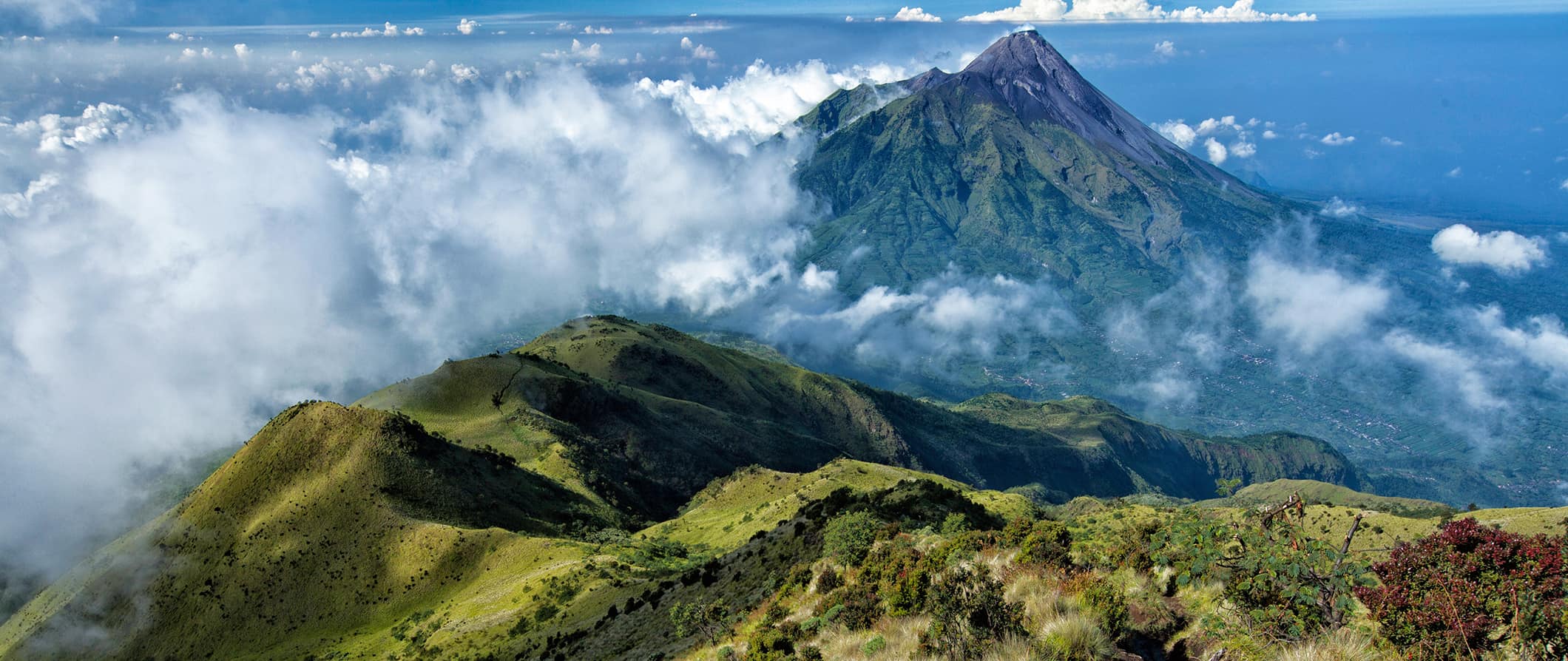
With over 17,000 islands, Indonesia is the world’s largest island country. Home to over 261 million people, it boasts stunning landscapes, incredible beaches, amazing food, and affordable prices.
While most people just visit Bali, backpacking further afield in the country is an underrated activity. With so much on offer, it can take months to see everything because there is just so much to see and do here: hectic and chaotic cityscapes, cool white sand beaches, and violent volcanoes. Indonesia has it all.
And it’s easy to visit Indonesia on a budget too. It’s extremely inexpensive and your money goes far here.
While most travelers fly to Bali and visit the Gili Islands or head to Lombok, I encourage you to try to get to the less touristy destinations and off the beaten path. Find dragons in Flores, go hiking, see the historic ruins of Java, and go to Sumatra. You’ll find even cheaper prices and far fewer crowds once you escape the digital nomad hub of Bali.
This Indonesia travel guide can help you plan your trip, save money, and make the most of your time in this island paradise!
Table of Contents
- Things to See and Do
- Typical Costs
- Suggested Budget
- Money-Saving Tips
- Where to Stay
- How to Get Around
- How to Stay Safe
- Best Places to Book Your Trip
- Related Blogs on Indonesia
Click Here for Destination Guides
Top 5 things to see and do in indonesia.
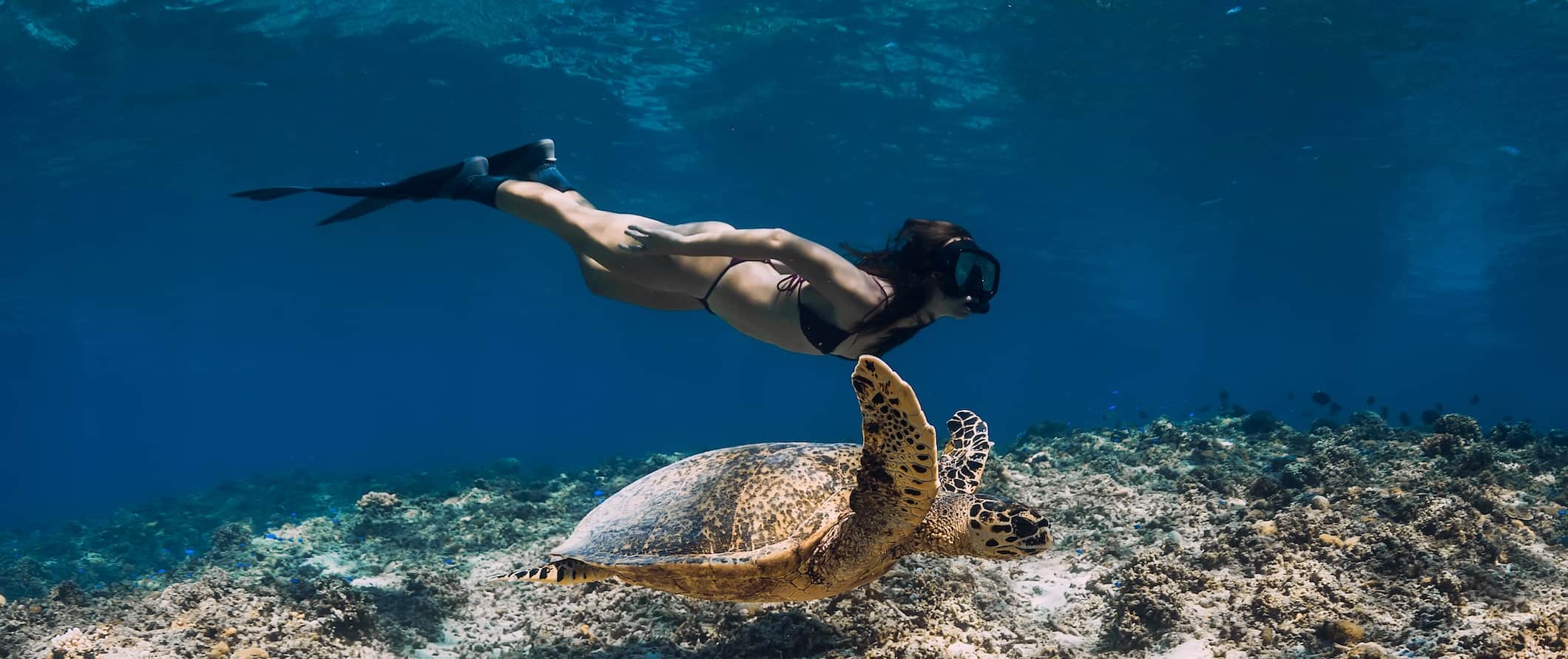
1. Relax in Bali
Bali is probably the most famous of Indonesia’s islands. Although often crowded with travelers, there is no escaping the fact that this place is beautiful. Try some surfing at Bingin Beach or visit the Pura Besakih, the Mother Temple, which is truly stunning to behold. Make sure you see some traditional Balinese dancing in Ubud too. You can also join a yoga retreat pretty much anywhere on the island and cooking classes are also plentiful and make for a great souvenir.
2. Dive in the Gili Islands
For a true sense of an island paradise, head to the Gili Islands . There are excellent (and cheap) scuba and snorkel facilities as well as great nightlife on Gili Trawangan. These islands are super popular with backpackers thanks to their super cheap accommodation and food, party scene, and stunning beaches for lazing around all day.
3. Admire Borobudur
Borobudur is a the world’s biggest Buddhist temple complex, dating from the 8th and 9th centuries. With 2,672 reliefs meant to highlight Buddhist teachings, it’s made from blocks of volcanic rock. Each level is supposed to describe the stages of life. It is said you can’t move on to the top until you discover the meaning of each relief. Admission for foreign adults is around 380,000 IDR.
4. See Komodo dragons
The subject of more nature documentaries than any other lizard, the Komodo dragon is a force to be reckoned with. Komodo National Park, part of the Lesser Sunda Islands, is the only place to see the world’s largest lizard in the wild, which grows up to 10 feet long and weighs over 135 kilograms (300 pounds). Admission is 150,000 IDR during the week, with prices rising to 250,000 IDR on Sundays and holidays (just note that there are additional fees for other activities including ranger fees, hiking fees, diving fees, and so on). The only way to really visit Komodo National Park is on a tour since the islands are over an hour away from Labuan Bajo port on Flores Island.
5. Visit Bromo-Tengger-Semeru National Park
Bromo-Tengger-Semeru National Park covers a total of 800 square kilometers (308 square miles) at the center of East Java and is the largest volcanic region in the province. Get up early to catch one of the most memorable sunrises of your life from the top of Mount Bromo or Mount Semeru. The easiest way to get here is from Probolinggo, through the village of Ngadisari. Although it doesn’t take long to get to the summit (around 45 minutes up a sandy slope) and access to the trail is free, a number of tour operators run guided trips through the park, which includes transport to and from the park.
Other Things to See and Do in Indonesia
1. explore hindi prambanan.
There are 244 temples at this 9th-century UNESCO World Heritage Site, with the central compound being the main attraction. There are eight minor temples and eight major temples here, with the tallest being 45 meters (150 feet) — which is actually taller than Borobudur. Located in Yogyakarta, there’s a lot to see, so schedule a full day here (it’s the second-largest temple complex in Southeast Asia, after Angkor Wat). Admission is around 380,000 IDR.
2. Wander Jakarta
Indonesia’s capital is a large, bustling city with a population of over 10 million. You could easily spend a few days here as there is a lot to see. Admire Istana Merdeka, the presidential palace (visitors are not allowed inside); see the Monas Tower, a symbol of Indonesia’s independence; check out Ancol Beach; visit the National Museum, and go shopping at the Jalan Surabaya Flea Market. For a moment of calm, people-watch from one of the cafes overlooking Fatahillah Square in the Old Batavia, the Dutch Quarter, where you can take in the historic architecture as you take in the local pace of life.
3. Snorkel or dive in Bunaken
The Bunaken National Marine Park is located in the Bay of Manado and it’s where you want to go if diving or snorkeling is your thing. These deep waters offer fantastic visibility and some of the world’s most biodiverse marine life. Keep an eye out for tuna, sharks, rays, turtles, sea snakes, and more. Entry to the marine park is 50,000 IDR per person, though children under 10 enter free.
4. Broaden your taste buds
Indonesia is home to 17,000 islands and over 260 million people. The country is brimming with diverse cultures, traditions, and beliefs. If you want some idea of how diverse this place is, there are over 700 languages spoken here! This diversity is very much reflected in the food. Javanese, Sundanese, Padang, and Balinese food are just some of your options. Hit the markets, participate in cooking classes, or take food tours to get a taste of what the country has to offer. Your tastebuds will thank you!
5. Visit Yogyakarta
Yogyakarta is Indonesia’s cultural hub and is a much less industrial city compared to Jakarta. There is an interesting blend of old customs with modern living here (the region still has a sultan/monarchy). It’s a hip place filled with street art, galleries, cafes, great nightlife, and a strong arts community. Yogyakarta is also a good jumping-off point for exploring the popular and picturesque Borobudur and Prambanan sites.
6. See the orangutans in Sumatra
A mysterious and rare primate, the orangutan finds its habitat on the Indonesian island of Sumatra. A visit to see these primates is a moving experience. And, given the rapid deforestation and fires in the area, you probably want to do this sooner rather than later as these animals are gravely endangered. If you go, make sure you’re traveling with an eco-friendly tour company. Reputable companies don’t let you get in close contact with the animals, as the risk of disease is too high. Even a common cold can knock out a baby orangutan. Nevertheless, seeing these majestic animals is an amazing and life-changing experience. Week-long guided treks cost around 20,000,000 IDR per person.
7. Experience village life in Kalibaru
Kalibaru is a small village on the southeastern side of Java. It’s quiet, secluded, and a great place to tour one of the many plantations (cacao, coffee, dragon fruit, rubber, and spices, among others) in the area on your way to or from Bali. It’s not as well-visited as many other places in Indonesia, meaning you can escape the crowds and get a chance to experience what local life is really like. You can stay here after a trip to Mount Bromo, or just visit on a day trip.
8. See the Bogor Botanical Gardens
Located 65 kilometers (40 miles) outside of Jakarta, the Bogor Botanical Gardens have over 200 acres of land and 15,000 species of plants and trees. The gardens are a lovely spot in which to lose yourself for a couple of hours with a book and some snacks. Admission is around 26,000 IDR. There is a commuter train between Bogor and Jakarta with a stop right next to the gardens.
9. See the Banyu Wana Amertha Waterfalls
These are some of the most beautiful waterfalls in Bali, and yet not many people make the trek here. They’re located about 90 minutes from Ubud, and then you have to hike through a banana plantation to reach the falls. It’s worth it as there are several sets of falls to explore. Just make sure to bring your swimsuit!
10. Explore the megaliths in Bada Valley
Near Lore Lindu National Park are 400 ancient stone megaliths scattered around the hills. No one really knows the origins of these structures, but they’re thought to be over 5,000 years old. No settlement remains or tools were ever found in the area. It’s best to hire a local guide here as the megaliths are not easy to find.
11. Visit the House of Danar Hadi
The House of Danar Hadi in Surakarta (Central Java) is considered one of the world’s best batik museums, with a handpicked selection of favorites from the owner’s collection of 11,000 pieces (batik is a cloth-dyeing method from Java). You have to take a tour to see it all, but it’s worth it. There are lots of antique and royal items on display. They also have batik demonstrations showcasing how these detailed pieces are made. Admission is 35,000 IDR.
12. See the lakes in Kelimutu National Park
Kelimutu National Park, on the island of Flores, is renowned for its tri-colored crater lakes. The crater lakes have continuously changed color over the years, likely due to the mineral makeup in the water. Sometimes they’re green, black, brown, red, blue, etc. The lakes are very sacred among the locals, who believe that they’re the final resting spots of departed souls. Moni is the closest town to the lakes; from there you can take public transportation to the park. Admission to the park is 150,000 IDR.
For more information on specific destinations in Indonesia, check out these guides:
- Bali Travel Guide
- Gili Islands Travel Guide
Indonesia Travel Costs
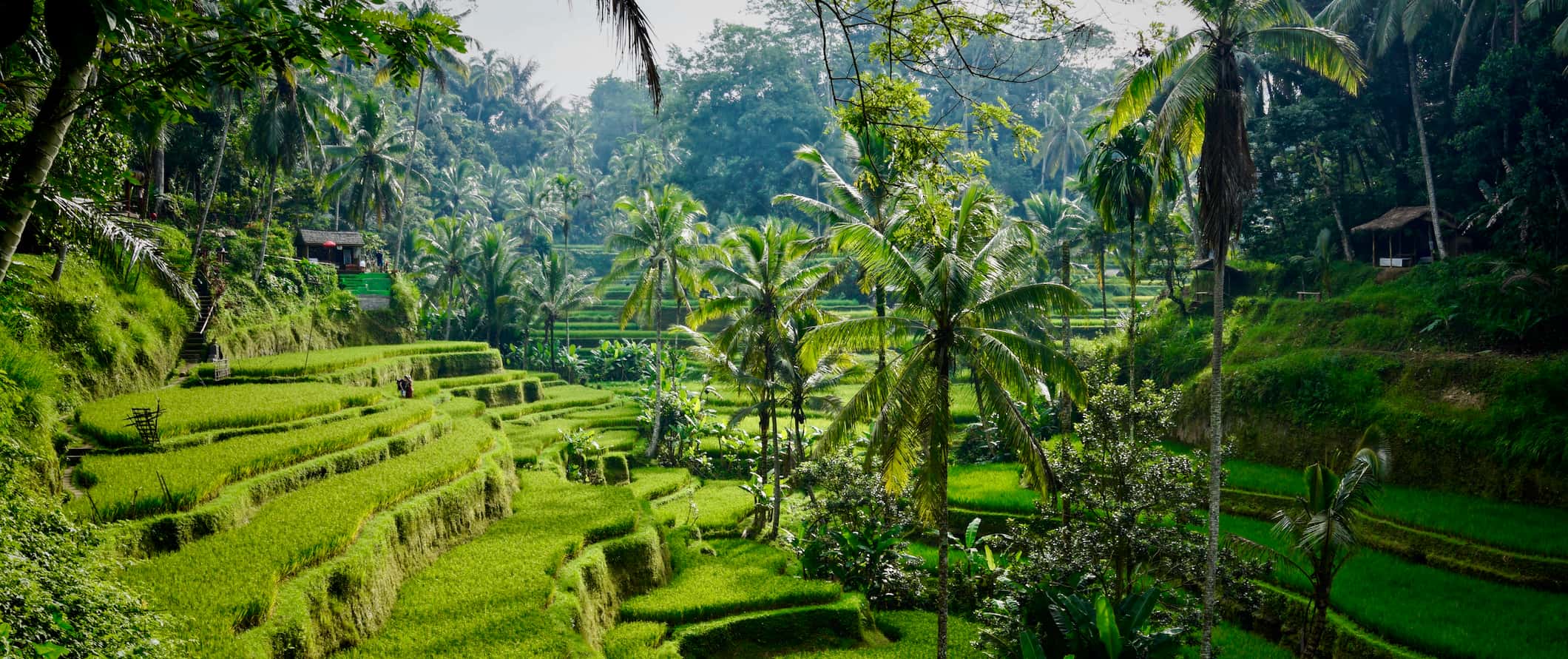
Accommodation – A bed in a dorm hostel dorm can cost as little as 55,000 IDR but most places are closer to 100,000 IDR. For a private double room, prices start around 175,000 IDR. Free Wi-Fi is standard and some hostels offer self-catering facilities and free breakfast.
Most budget hotels begin at 300,000 IDR per night for a double room that usually includes free Wi-Fi and breakfast. For a three-star hotel, prices begin around 400,000 IDR per night.
Airbnb is also widespread throughout the country, with private rooms starting from around 300,000 IDR per night. For entire apartments, expect to pay at least 400,000 IDR per night. Book early, however, or prices can double.
If you’re booking through Booking.com, keep in mind that many of the listings are actually homestays and private residences.
Since hostels and homestays are so cheap, camping is not very common unless you’re on a guided trek.
Food – Food in Indonesia is heavily influenced by a number of cultures, most notably Chinese, Indian and Malay cultures. Lots of dishes have a rice (nasi) or noodle (mie) base and, in some cases, that’s the whole dish, such as with nasi ayam (chicken rice). Be sure to try the Balinese take on satay (where the meat is minced and wrapped on skewers) and babi guling , a delicious suckling pig that is roasted for hours. Another popular choice is oxtail soup. Be mindful that the food here can be a little spicy.
The food here is extremely cheap by Western standards, with street food costing under 10,000 IDR. It’s also delicious in part because much of it is based on fresh spices and herbs. Expect rice and noodle-based dishes such as nasi goreng (stir-fried rice with chicken, egg, and vegetables) and mie goreng (a spicy fried noodle dish with garlic, onion, meat, egg, and vegetables) as well as gado gado (comprising of steamed vegetables, tofu, tempeh, sometimes egg, and peanut sauce), and lots of satay.
For an inexpensive meal at a local restaurant, expect to pay around 25,000 IDR. For a meal at a mid-range restaurant with table service, prices start at 125,000 IDR per person. Western food is much more expensive but is still relatively affordable at under 100,000 IDR for a meal. For the cheapest food and a fun experience, head to the night markets.
Fast food like Mcdonald’s costs around 50,000 IDR for a combo meal. A beer at the bar costs around 30,000 IDR.
If you plan on cooking your own meals, a week’s worth of groceries costs between 450,000-500,000 IDR. However, food in the country is very cheap and I would encourage you to eat out as often as possible as kitchens are hard to come by!
Backpacking Indonesia Suggested Budgets
On a backpacker budget of 425,000 IDR per day, you can stay in a hostel dorm, eat some street food, cook some meals, rent a bicycle to get around, and do mostly free activities like hiking and enjoying the beach. If you plan on drinking, add another 30,000-60,000 IDR to your daily budget.
On a mid-range budget of 1,100,000 IDR per day, you can eat out at more restaurants, stay in a budget hotel or a private hostel room, rent a scooter to get around, drink more, enjoy some massages, and go diving.
On a “luxury” budget of 2,350,000 IDR or more per day, you can stay at a nicer hotel or villa, take taxis or private minivans to get around, eat Western food, drink more, and do any adventure activities you want. This is just the ground floor for luxury, however. The sky is the limit!
You can use the chart below to get some idea of how much you need to budget daily, depending on your travel style. Keep in mind these are daily averages — some days you’ll spend more, some days you’ll spend less (you might spend less every day). We just want to give you a general idea of how to make your budget. Prices are in IDR.
Indonesia Travel Guide: Money-Saving Tips
While Indonesia is super affordable, it’s also easy to splash out here (especially in Bali). To help you save money, here are some specific ways you can keep your spending down while you’re here:
- Eat on the street – You can pick up tasty local fare for under 10,000 IDR. Street-side snacks, soups, and noodles are super affordable and super tasty.
- Bargain hard – Nothing is ever at face value in Indonesia. Bargain with sellers as most of the time the prices they quote aren’t the prices you end up paying if you bargain!
- Drink cheap – Save money on alcohol by heading to the local happy hours (or just buying your drinks at a local store instead of the bar). This is the cheapest way to drink!
- Book online in advance – If you’re planning on hitting up some of Indonesia’s most popular destinations, such as Bali, it’s actually cheaper to book your accommodations (and sometimes tours) online in advance rather than showing up and trying to strike a deal.
- Pay bus attendants directly – When you’re taking an intercity bus, don’t purchase a ticket from a ticket window. It’s cheaper to pay directly on the bus.
- Rent a bike – In many places, such as Bali and Gili, you can easily get around on two wheels. Rent a bike for as little as 40,000 IDR per day. It’s a great way to get around on the cheap.
- Take taxis – Taxis are essential for getting around in some parts of Indonesia, and they can be cheap. Just make sure the driver puts the meter on before you depart (or agree on a price before you get in).
- Bring a filtered water bottle – Indonesia has a ton of plastic waste. It has so much that a lot of it just gets burned. You’ll see — and smell — it during your visit. Bring a reusable water bottle with a filter to save both money and the environment. I personally like Lifestraw .
Where to Stay in Indonesia
Looking for a place to stay during your trip? Here are some of my favorite places to stay in Indonesia:
- PADI Backpackers House (Ubud)
- Kememai Hostel (Ubud)
- Warung Coco Hostel (Kuta)
- Tribal Bali (Canggu)
- Gili Beach Bum (Gili Trawangan)
- My Mate’s Place (Gili Trawangan)
- Wonderloft Hostel (Jakarta)
How to Get Around Indonesia
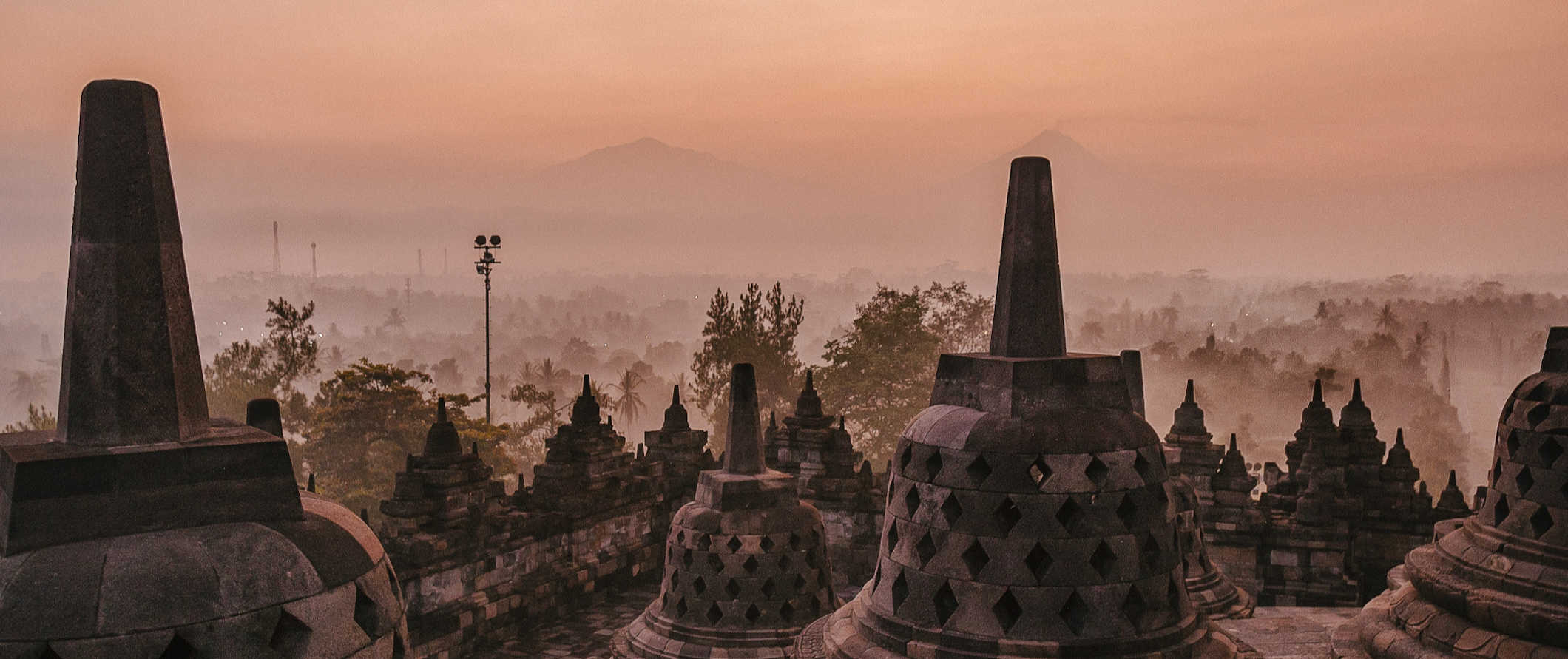
Public transportation – Public buses aren’t really used for city transport except on Java. There’s an extensive network in Jakarta, known as the Transjakarta Busway. Fares cost 3,500-9,000 IDR for any destination in the network. You have to pay with a card that costs 40,000 IDR (it comes with a 20,000 IDR credit) from station ticketing offices.
Otherwise, most people get around by becak , a three-wheeled pedal or motor-powered cart. You should negotiate your fare before you get in; ask your hotel/hostel staff for up-to-date price estimates.
Taxis are also affordable, and they’re metered in major cities. Bluebird Taxis is available in most places, and they’re the most dependable company for metered taxis and English-speaking drivers. There’s a smartphone app that makes it really easy to order taxis. The starting rate is around 7,500 IDR and then 5,300 IDR per kilometer.
Grab (an Uber offspring) is a household name in Southeast Asia. It is convenient but sometimes costs even more than a taxi. Gojek is a similar option. Be forewarned: if you order a Grab or Gojek, you might wind up on the back of a motorbike.
Ferry – For traveling between islands, ferries start around 15,000 IDR for a ticket from East Java to West Bali, and the rates go up from there for other routes. Bali to the Gili Islands is 175,000 IDR (one way) on a speedboat.
While it’s not necessary to book in advance it’s a good idea to do so during peak season or on more popular routes. You can buy tickets on the ferry company’s website or via a ticket agent like 12go.asia.
Bus – Buses are the main way for locals and tourists to get around Indonesia. It’s a good idea to book your long-distance tickets in advance, especially if you want an air-conditioned ride. You can buy a ticket from a travel agent, or visit the bus terminal. Your accommodation may also be able to arrange your transportation.
A 12-hour journey on a bus costs around 170,000 IDR. A short journey, like the one from Kuta Beach to Ubud, is less than 80,000 IDR and takes one hour.
If your ride is a shorter one, you might end up on a bemos (mini-bus). In this case, negotiate your fare beforehand.
Train – In Indonesia, the cities of Java are well linked by train, including Jakarta, Bandung, Surabaya, Probolinggo (for Mount Bromo), and Banyuwangi (the ferry terminal for Bali). Economy class from Jakarta to Surabaya takes 10.5 hours and costs about 190,000 IDR, while an 8-hour executive class trip can cost from 620,000 IDR. Surabaya to Probolinggo (for Mount Bromo) takes 2-3 hours and costs 27,000 IDR for economy or 240,000 IDR for executive class. Surabaya to Banyuwangi (for Bali) takes 6-7 hours and costs as little as 56,000 IDR for economy or 235,000 IDR for executive class. You can reserve your tickets at tiket.com.
Flying – Garuda Indonesia is the country’s main airline offering international service as well as domestic flights. Lion Air and AirAsia also offer plenty of domestic routes, although Lion Air’s safety record is spotty and I wouldn’t advise traveling with them.
Flights between Jakarta and Bali start around 900,000 IDR each way, while Jakarta to Lombok starts around 1,200,000 IDR. Lombok to Bali is around 1,100,000 IDR. However, this isn’t the cheapest way to travel and is only recommended if you have limited time.
When to Go to Indonesia
Indonesia has just two seasons: the wet season and the dry season. Dry season lasts from May to September while the rainy season occurs from October to April. The average daily temperature year-round is 28°C (80°F).
Overall, the best time of year to visit is between May and September when it’s dry and sunny. It’s still pleasant to visit during the rainy season, however, as rainfall usually comes as fast and intense downpours that only last a few hours.
The Nusa Tenggara region is more affected by the wet season which may sometimes result in flooding. The wet season may also be a problem if you’re looking to get off the beaten track in Indonesia, as muddy roads can sometimes keep you from getting around.
In Bali and Kalimantan, the extremes between seasons aren’t drastic. The dry season is the best time to climb the volcanoes, and the best time to dive is from April to September. (If you are expecting to do some climbing, remember to pack some warm layers. It gets cold at the top!)
How to Stay Safe in Indonesia
Indonesia is a safe place to backpack and travel. Violent crime is rare. Petty theft (including bag snatching) is the most common type of crime in Indonesia. It’s most common on public transit as it’s easy for thieves to grab your wallet or purse when you’re distracted by all the chaos around you. Staying alert and securing your valuables is the best way to prevent petty theft.
Credit card fraud is also common in Indonesia. To avoid this, it’s always best to pay with cash when possible. To avoid getting your information stolen at an ATM, enter a reputable bank to withdraw money from there.
There are a lot of small scams around the island and you can read about how to avoid these common travel scams here .
Solo female travelers should generally feel safe here but the standard precautions apply (never leave your drink unattended at the bar, never walk home alone intoxicated, etc.). The country is big and, while generally safe, there are certain spots you’ll want to stay more vigilant in. There are countless solo female travel blogs out there that can give you specific information on how to stay safe.
Earthquakes are common in Indonesia, owing to its location on the Ring of Fire (it experiences more earthquakes than any other country). Make sure you know where your exits are during an emergency. Also, download an offline map and languages translation pack in case you need it during an emergency situation where you don’t have mobile data/Wi-Fi.
If you experience an emergency, dial 112 for assistance.
When in doubt, always trust your instincts. If a taxi driver seems shady, get out. If your hotel or accommodation is seedier than you thought, go somewhere else. Make copies of your personal documents, including your passport and ID, in case of an emergency.
The most important piece of advice I can offer is to purchase good travel insurance. Travel insurance protects you against illness, injury, theft, and cancellations. It’s comprehensive protection in case anything goes wrong. I never go on a trip without it as I’ve had to use it many times in the past. You can use the widget below to find the policy right for you:
Indonesia Travel Guide: The Best Booking Resources
These are my favorite companies to use when I travel. They consistently have the best deals, offer world-class customer service and great value, and overall, are better than their competitors. They are the companies I use the most and are always the starting point in my search for travel deals.
- Skyscanner – Skyscanner is my favorite flight search engine. They search small websites and budget airlines that larger search sites tend to miss. They are hands down the number one place to start.
- Hostelworld – This is the best hostel accommodation site out there with the largest inventory, best search interface, and widest availability.
- Agoda – Other than Hostelworld, Agoda is the best hotel accommodation site for Asia.
- Booking.com – The best all around booking site that constantly provides the cheapest and lowest rates. They have the widest selection of budget accommodation. In all my tests, they’ve always had the cheapest rates out of all the booking websites.
- Get Your Guide – Get Your Guide is a huge online marketplace for tours and excursions. They have tons of tour options available in cities all around the world, including everything from cooking classes, walking tours, street art lessons, and more!
- SafetyWing – Safety Wing offers convenient and affordable plans tailored to digital nomads and long-term travelers. They have cheap monthly plans, great customer service, and an easy-to-use claims process that makes it perfect for those on the road.
- LifeStraw – My go-to company for reusable water bottles with built-in filters so you can ensure your drinking water is always clean and safe.
- Unbound Merino – They make lightweight, durable, easy-to-clean travel clothing.
Indonesia Travel Guide: Related Articles
Want more info? Check out all the articles I’ve written on Indonesia travel and continue planning your trip:

The 6 Best Hostels in Bali

Is Southeast Asia Safe for Travelers?

A Visitor’s Guide to the Jatiluwih Rice Terraces
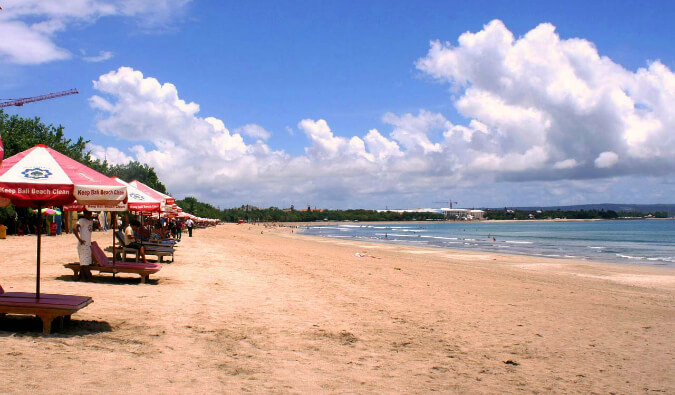
Kuta Beach: The Worst Place in Bali

How to Visit Borobudur in Indonesia
Get your free travel starter kit.
Enter your email and get planning cheatsheets including a step by step checklist, packing list, tips cheat sheet, and more so you can plan like a pro!

- Where To Stay
- Transportation
- Booking Resources
- Related Blogs
We’re sorry, this site is currently experiencing technical difficulties. Please try again in a few moments. Exception: request blocked
- Things To Do
- Entertainment
- Food Travel
- Travel Tips
- Travel News
Is Indonesia Safe? (How To Visit SAFELY)
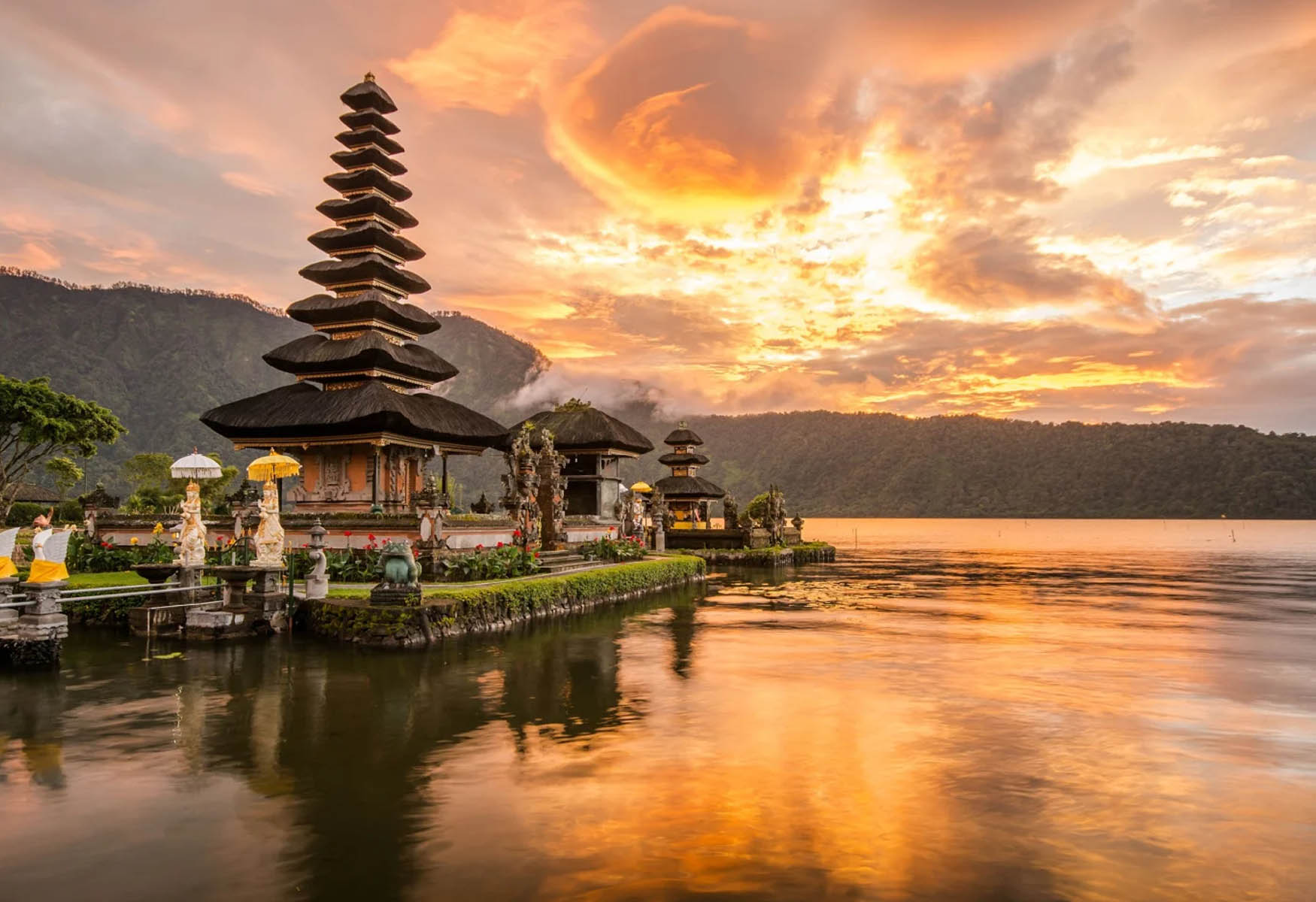
Introduction
Indonesia, with its breathtaking landscapes, vibrant culture, and warm hospitality, is a popular destination for travelers from all over the world. However, before embarking on a journey to this beautiful archipelago, it’s important to address a common concern: safety. Understanding and being prepared for potential risks can ensure a safe and enjoyable experience while exploring all that Indonesia has to offer.
Like any other country, Indonesia has its share of safety challenges. However, it’s crucial to note that the majority of visitors to Indonesia experience no safety issues. The key is to be well-informed, take necessary precautions, and exercise common sense to mitigate any risks.
In this article, we will explore various aspects of safety in Indonesia, including how to research potential risks and areas to avoid, how to prepare for a safe trip, and what measures to take to stay safe while in the country. By following these guidelines and using your own judgment, you can have a memorable and secure journey.
Understanding the Safety Situation in Indonesia
Before traveling to Indonesia, it’s important to have a clear understanding of the safety situation in the country. While Indonesia is generally a safe destination, it’s important to note that certain regions and areas may have higher risks than others. Conducting thorough research and staying informed is essential in order to make informed decisions about your travel plans.
One of the first steps in understanding the safety situation in Indonesia is to consult travel advisories issued by your government. These advisories provide detailed information about the security situation in specific regions and offer recommendations and precautions for travelers. It’s advisable to regularly check these advisories, as they are updated to reflect any changes in the safety situation.
It’s also important to research and understand the cultural and social norms in Indonesia. Familiarize yourself with the local customs, traditions, and laws to ensure that you respect the local culture and avoid inadvertently engaging in any activities that could potentially be perceived as disrespectful or offensive.
Another aspect to consider when understanding the safety situation in Indonesia is the potential for natural disasters. Indonesia is located in the Pacific Ring of Fire, making it prone to earthquakes, tsunamis, and volcanic activity. Familiarize yourself with emergency procedures and guidelines in case of such events, and stay informed about any ongoing developments or alerts from local authorities.
While it’s important to be aware of potential risks, it’s equally crucial to not let fear deter you from visiting Indonesia. By staying informed, being prepared, and exercising caution, you can mitigate risks and have a safe and enjoyable trip in this diverse and captivating country.
Researching Potential Risks and Areas
When planning a trip to Indonesia, it’s essential to research potential risks and areas that may have safety concerns. By understanding the specific risks associated with certain locations, you can make educated decisions about your travel itinerary and take necessary precautions.
Start by researching the overall security situation in Indonesia. Look for recent news articles, travel blogs, and forums to get a sense of any ongoing safety concerns or incidents in the country. Additionally, consult reliable travel websites and government advisories for up-to-date information on specific areas to avoid or exercise caution.
Pay attention to any travel warnings or alerts related to specific regions or cities in Indonesia. These warnings may be issued due to political unrest, terrorist threats, or civil disturbances. It’s important to take such advisories seriously and adjust your travel plans accordingly.
Furthermore, it’s recommended to research the local laws and regulations in the areas you plan to visit. Indonesia has stringent drug laws, and penalties for drug-related offenses can be severe. Understanding and respecting local laws can help you avoid any legal troubles during your stay.
Consider seeking advice from fellow travelers or locals who have recently visited Indonesia. Online travel forums can be a valuable resource for gathering information and gaining insights from firsthand experiences. These individuals can provide valuable recommendations and tips on specific areas to avoid or exercise caution.
Finally, consider consulting with a reputable travel agency or tour operator. They are familiar with the local conditions and can provide guidance on areas to visit that align with your safety preferences. They can also organize guided tours or arrange transfers, ensuring a more secure and hassle-free travel experience.
Taking the time to research potential risks and areas of concern before your trip to Indonesia will help you make informed decisions and take necessary precautions. By being well-prepared, you can minimize potential risks and focus on enjoying your time exploring the rich culture and natural beauty of this incredible country.
Preparing for a Safe Trip
Preparing for a safe trip to Indonesia involves taking proactive measures to ensure your well-being and security throughout your journey. By following these guidelines, you can minimize potential risks and enjoy a worry-free experience.
First and foremost, make sure to have comprehensive travel insurance that covers medical emergencies, trip cancellations, and theft or loss of personal belongings. It’s crucial to carefully review the policy and understand what is covered to ensure you have adequate protection throughout your trip.
Before traveling, check if you need any vaccinations or preventive medications for diseases prevalent in Indonesia. Consult a healthcare professional or visit a travel clinic to get the necessary vaccinations and follow any precautions related to food and water safety.
Make multiple copies of important travel documents such as your passport, visa, and itinerary. Keep one copy with you and leave another copy with a trusted friend or family member back home. It’s also a good idea to store digital copies in cloud storage for easy access if needed.
Research and pack appropriate clothing for the climate and cultural norms of the areas you plan to visit. Indonesia has a tropical climate, so lightweight and breathable clothing is recommended. However, it’s important to dress modestly in certain religious or conservative regions to respect local customs.
Invest in a quality travel lock to secure your luggage and hotel room. Use the lock to secure your bags during transit and in your hotel room when you’re away. Additionally, consider using a money belt or hidden pouch to keep your valuables safe while exploring.
Stay informed about local customs and etiquette. Learn a few basic phrases in Bahasa Indonesia, the official language, to show respect and facilitate communication. It’s important to be culturally sensitive and avoid behavior that may be considered disrespectful or offensive.
Finally, familiarize yourself with the transportation options in the areas you plan to visit. Research reputable taxi services or opt for ride-hailing apps like Gojek or Grab for secure and reliable transportation. If you plan to rent a vehicle, ensure you have proper documentation and drive responsibly.
By taking these steps to prepare for a safe trip, you can minimize potential risks and enjoy a smooth and secure journey throughout your time in Indonesia. Being proactive and well-prepared will give you peace of mind, allowing you to fully immerse yourself in the beauty and culture of this wonderful country.
Staying Safe While in Indonesia
While Indonesia is generally a safe destination, it’s important to remain vigilant and take necessary precautions to ensure your safety while traveling within the country. Here are some tips to help you stay safe during your time in Indonesia.
First and foremost, be aware of your surroundings and trust your instincts. If a situation feels uneasy or unsafe, remove yourself from it. Stay alert and mindful of your belongings, especially in crowded areas or while using public transportation.
Exercise caution when using ATMs and avoid using them in secluded or poorly lit areas. Skimming and card-related scams can occur, so it’s advisable to use ATMs located within reputable banks or in busy public areas.
When it comes to transportation, choose reliable and licensed providers. If using taxis, opt for well-known companies or ride-hailing services. Ensure that the driver is using the meter or agree upon a price before starting the journey. If possible, share your ride details with a friend or family member.
If you plan to use public transportation, be mindful of your belongings and keep them close to you. Avoid displaying expensive items or jewelry that might attract unwanted attention. It’s also a good idea to familiarize yourself with the local transport routes and schedules to avoid getting lost or being in unfamiliar areas at night.
While exploring tourist attractions or crowded places, be cautious of pickpockets. Keep your valuables secure, preferably in a crossbody bag or hidden pouch. Avoid carrying large amounts of cash and only use reputable money exchange services or withdraw money from trusted ATMs.
When it comes to your personal safety, trust your instincts and be cautious when interacting with strangers. Avoid traveling alone at night, especially in unfamiliar or poorly lit areas. It’s advisable to stick to well-lit and busy streets and take note of the location of nearby establishments or emergency services.
Respect local customs and traditions when visiting religious sites. Follow the dress code, remove your shoes when required, and avoid any behavior that may be considered disrespectful. It’s important to be mindful and show proper etiquette to the local community.
Lastly, stay updated on current events and developments in the areas you plan to visit. Keep an eye on local news or reach out to reliable sources for any potential safety concerns or recent incidents. It’s essential to be well-informed and adjust your travel plans accordingly to ensure your safety.
By following these tips and using your common sense, you can have a safe and enjoyable experience while traveling in Indonesia. Remember, safety should never compromise your exploration, so be prepared, stay informed, and embrace the wonders this enchanting country has to offer.
Emergency Contacts and Resources
Knowing the appropriate emergency contacts and having access to reliable resources is crucial for your safety during your stay in Indonesia. Familiarize yourself with the following contacts and resources:
1. Emergency Services: In case of immediate danger or emergencies, dial 112 for general emergencies or 110 for the police. These numbers can be reached from any mobile phone or landline throughout Indonesia.
2. Embassy or Consulate: It’s essential to have the contact information for your country’s embassy or consulate in Indonesia. They can provide assistance in case of lost passports, medical emergencies, or other related issues.
3. Local Authorities: Make note of the local police station nearest to your location. They can assist with non-emergency matters or incidents that require immediate attention.
4. Medical Assistance: Save the contact information for local hospitals or medical clinics in the areas you plan to visit. The emergency hotline for medical assistance is 118. Having the names of English-speaking doctors or medical facilities can also be helpful.
5. Travel Insurance Provider: Keep a copy of your travel insurance policy and the emergency contact number for your insurance provider. In case of any medical emergencies or other covered incidents, reach out to them for guidance and assistance.
6. Online Resources: Utilize reliable online resources to stay updated on the safety situation in Indonesia. Websites such as the official Indonesia Tourism website, local news outlets, and travel forums can provide valuable information on any recent developments or safety concerns.
7. Local SIM Card: Consider getting a local SIM card upon arrival in Indonesia. This will allow you to have a local phone number and access to local mobile networks, making it easier to contact emergency services or seek assistance if needed.
In addition to the emergency contacts and resources listed above, it’s also advisable to inform a trusted friend or family member of your travel plans. Share your itinerary, accommodation details, and contact information with them. This can be valuable in case of any unforeseen circumstances or emergencies.
Remember, being prepared and having access to the right contacts and resources is essential for your safety and well-being while in Indonesia. Stay vigilant, keep yourself informed, and trust your instincts to ensure a secure and enjoyable trip.
Indonesia is a stunning country with a rich culture and breathtaking landscapes that attracts travelers from around the world. While safety is a valid concern, with proper preparation and precautions, you can have a safe and enjoyable trip in Indonesia.
Understanding the safety situation in Indonesia by researching potential risks and areas to avoid is essential. Stay informed about the security situation by regularly checking travel advisories and consulting reputable sources. By being knowledgeable, you can make informed decisions about your travel plans and minimize potential risks.
Preparing for a safe trip involves taking proactive measures such as obtaining comprehensive travel insurance, obtaining necessary vaccinations, and making copies of important travel documents. It’s also essential to be aware of cultural norms, dress appropriately, and secure your belongings to mitigate any risks.
Staying safe while in Indonesia requires vigilance and common sense. Be aware of your surroundings, choose reliable transportation options, and protect your valuables. Knowing emergency contacts, including local police and medical services, embassy or consulate information, and having access to online resources, can provide you with the necessary support in case of an emergency.
In conclusion, while safety should always be a priority, it’s important not to let fear deter you from exploring the wonders of Indonesia. By being well-prepared, staying informed, and using your judgment, you can have a memorable and secure journey in this diverse and captivating country.
LEAVE A REPLY Cancel reply
Save my name, email, and website in this browser for the next time I comment.
- Privacy Policy
- Advertising
- Affiliate Disclosure
- EN - English
- PT - Portuguese
- ES - Spanish
- How it works
- Become a Host
- Download the app
Top Destinations
- United States
- United Kingdom
What type of experience are you looking for?
- Non-Profit School
- Permaculture project
- Eco Village
- Holistic Center
- Guest House
- How Worldpackers works

Learn from the most experienced travelers of the community
Traveling with worldpackers, planning and budgeting for travel, make a living while traveling as a lifestyle, travel with worldpackers.
- Using Worldpackers
- Work exchange
- Social impact
Plan your trip
- Women traveling
- Budget travel
- Solo travel
- Language learning
- Travel tips
- Get inspired
- Digital nomads
- Travel jobs
- Personal development
- Responsible travel
- Connect with nature
Top destinations
- South America
- Central America
- North America
- More destinations
- WP Life WP Life
- Exclusive discounts Discounts
- Explore the world
- Asia & Oceania
Is Indonesia safe?
Wondering if Indonesia is safe? Here are some tips and current events that you may want to know about so you can fully prepare for your trip to Indonesia and stay safe while you're there!
Gabrielle Budget Travel With Gabby
Jan 09, 2024
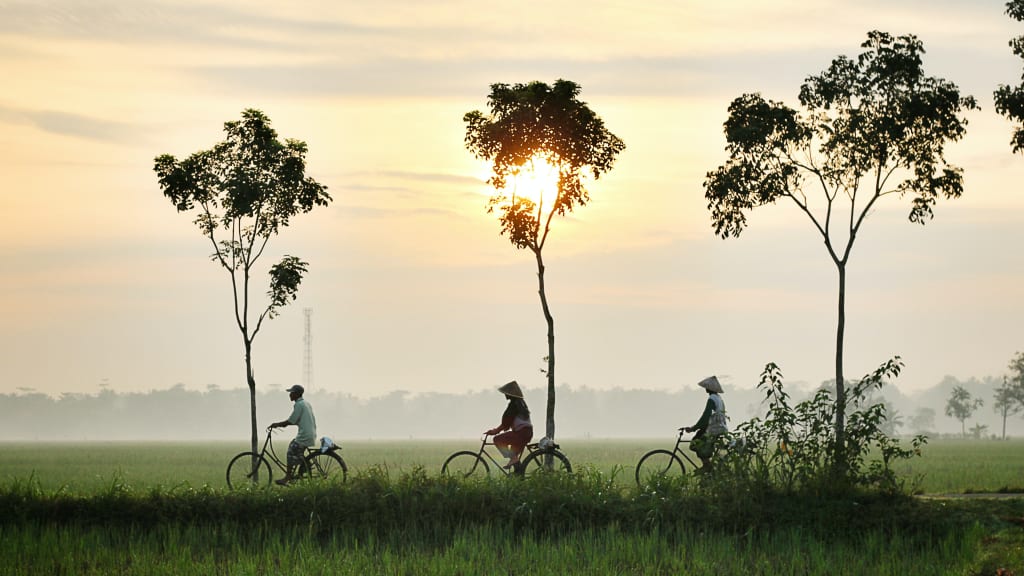
Indonesia is one of the most special places to visit in Southeast Asia .
Most well-known for its popular island of Bali, Indonesia is nestled in the Indian and Pacific Oceans and is composed of over 17,000 islands. With its idyllic beaches, impressive volcanoes, glittering temples, flavorful food, and welcoming locals, there are countless reasons to visit this beautiful and vibrant archipelago. However, the question remains: is Indonesia safe?
Like any country, Indonesia has its positives and negatives. Overall, it can be considered a safe travel destination . However, there are precautions that any traveler should take, and having the right knowledge is essential for staying safe throughout their trip.
If you do some research and are aware of any Indonesia travel restrictions and safety precautions, you can have an incredible trip there! You can also consider a Worldpackers work exchange to learn about the local culture and stay safe.
Whether you’re visiting the touristy haven of Bali , or you’re venturing to a lesser-known island such as Lombok, Sumatra, Komodo, or Flores, just be travel-smart and you can soak in all the beauty of this fascinating Southeast Asian country!
Is Indonesia safe for travel?
Though Indonesia is quite safe overall, there are a few safety risks you might want to be aware of.
But don’t let the possibility of crime or natural disaster scare you away from traveling! Bad things can happen anywhere in the world , and you shouldn’t let fear cripple you.
However, if you want to be a smart traveler , it can help to just be aware of your surroundings and be prepared. Here are some common safety risks that are known to occur in parts of Indonesia.
If planning a trip around Southeast Asia, you might also want to read: Is Vietnam safe to travel to? and Is Cambodia safe to visit?
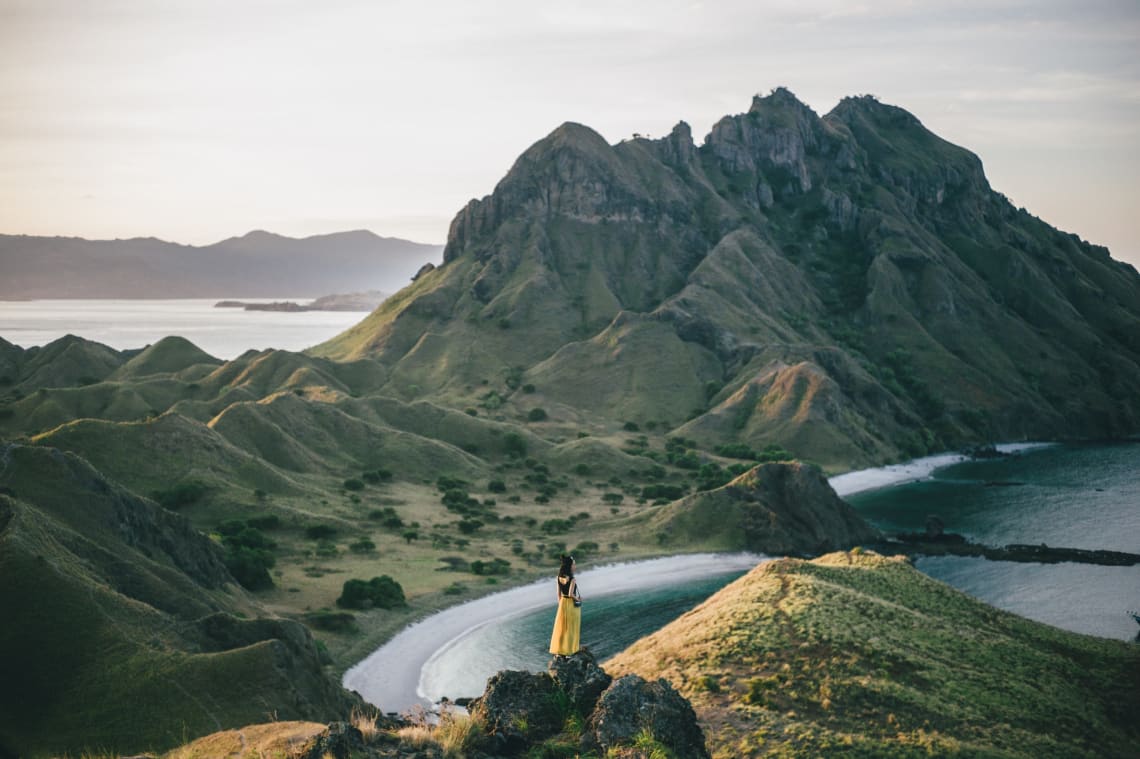
Crime and scams
Crimes and scams are quite common in Indonesia, but you can avoid them if you are expecting them and keep your wits about you!
The most common type of crime in the country is petty crime like pickpocketing. Crowded tourist areas, such as Bali, are full of pickpockets. To avoid becoming a victim, make sure you leave your valuables locked up at your accommodation and keep your bag close by while exploring.
Fraud and ATM scams can also happen. Avoid these by only using official ATMs inside banks or businesses. Use general caution, cover your PIN number, and monitor your bank account regularly to spot any scams.
Taxi scams may happen as well, so always call an official taxi driver instead of hailing a random one off the street.
Drink spiking can also happen in touristy areas, particularly if you’re a female. Never accept a drink from anyone! And if you’re a solo female traveler, avoid going out alone at night.
All of these crimes may seem scary, but again, they can happen anywhere and are easily avoided if you travel safely and use common sense.
Indonesia does have the occasional violent crime occurrence. Armed robberies and kidnappings may occur, but mainly in certain areas. The provinces of Papua and Aceh, as well as East and West Kalimantan have known violent crime, so just avoid these areas.
Natural Disasters and Health
Due to its location across various tectonic plates, Indonesia has a diverse island landscape that is prone to natural disasters.
Earthquakes, volcanic eruptions, tsunamis, and floods are all known to happen around the islands. The issue with natural disasters is that humans often don’t know they’re coming until it’s too late!
Nature is unpredictable, and we cannot always control it. But it's important not to let the fear of natural disasters disrupt your trip. Always check local alerts to stay informed of any potential risks . For example, currently, travelers should avoid traveling to Mount Agung in Bali due to possible volcanic eruptions.
In terms of health, make sure you avoid drinking tap water in Indonesia . Pollution is a problem, so stick to bottled water. That means avoiding brushing your teeth and washing produce with tap water, and avoiding ice in your drinks.
Also, make sure you are up to date on all vaccinations and have medications for various tropical diseases that may occur. Speak to your doctor about the best healthcare you may need to prepare for a trip to Indonesia !
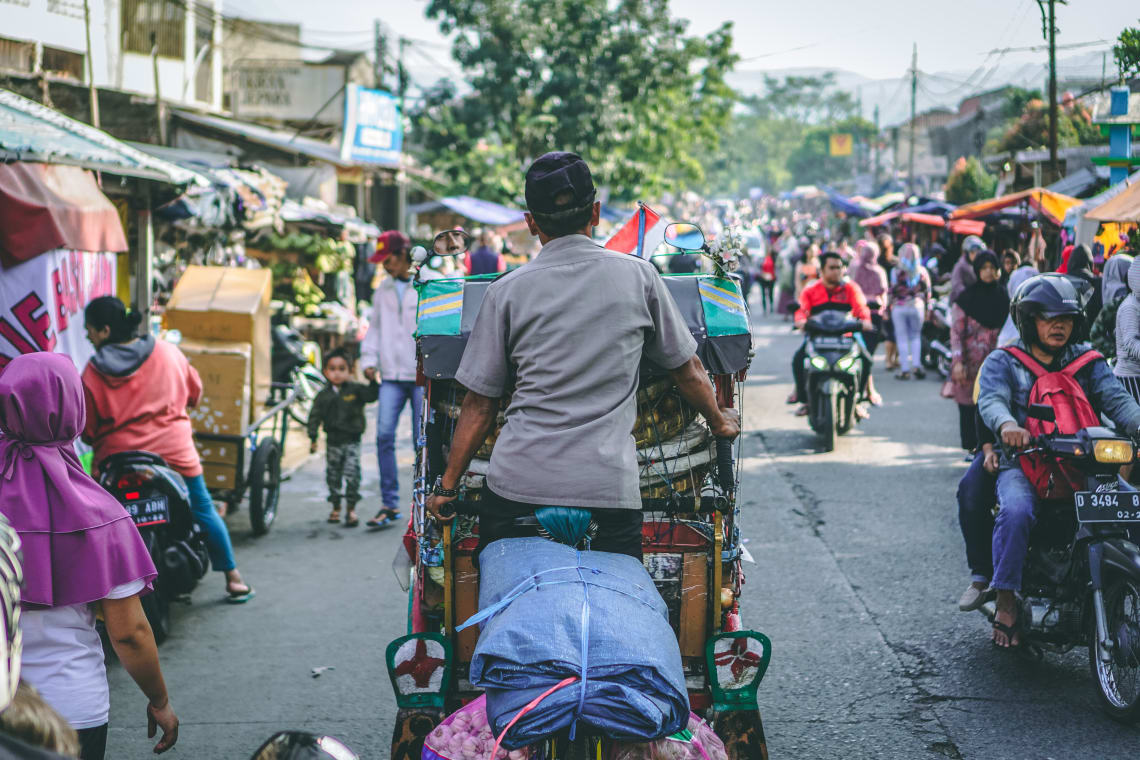
Currently, one of the biggest risks in Indonesia is terrorism. Anti-terrorism efforts are strong, but terrorist attacks have been known to happen around Indonesia and may still happen.
Terrorist attacks tend to target busy areas, including religious buildings, hotels, restaurants, bars, airports, public transport, tourist attractions, and markets. Celebrations and holidays are sometimes used to launch such attacks.
To minimize the risk of terrorism, it's important to always be alert and aware of your surroundings while exploring . Identify exit routes in public places and follow the guidance of local authorities. Also watch the local media to see if there are any hints of trouble.
Certain areas are more prone to terrorism and crime than others. Regions such as Central Papua, Highland Papua, Central Sulawesi, and Maluku have experienced increased social tension and civil unrest. Avoid these areas during your travels just to take extra precautions.
Tips to stay safe in Indonesia
Despite the issues we just listed, there are still ways to have a safe and successful trip to Indonesia. So if you’re still wondering, “Is it safe to travel to Indonesia”, it definitely is if you follow these steps and do your research!
Get travel insurance
Travel insurance is definitely a must-do when visiting Indonesia . You really should get travel insurance anywhere in the world, but definitely have it when visiting countries where theft, natural disaster, and tropical disease are more common.
Travel insurance backs you up if anything happens abroad! Depending on the type of plan you get, you can have financial security if you need to pay for medical bills, flight changes, bag loss, or any other type of problem.
Sometimes travel insurance can be expensive, but it will save you money in the long run. Just make sure you read your plan in-depth and ask your insurance provider any questions so you know exactly what you are covered for.

Do a work exchange
A work exchang e is another excellent way to stay safe while traveling. This is when you work in exchange for accommodation so you can have a more in-depth cultural experience .
This type of travel does save you money , but more importantly, it gives you a closer look into the local culture and way of life . You are often living and working alongside locals, so you can really get to know them and learn about how they live.
Having local insight can give you an extra boost of knowledge that many tourists don’t have. You can make local friends, understand the area, and learn about the best things to do off the beaten path.
Your host wants you to have a great experience in their country, so they will help direct you to the safest areas and make sure you feel comfortable during your travels.
Some examples of top work exchanges in Indonesia include:
- Volunteer at a sustainable tourism project
- Work at a local school and help teach English
- Help with multimedia and social media at a school and theme park in Java
- Teach yoga at a surf camp in Bali
- Help with gardening and English practice at a local farm
- Work as a yoga instructor at a hostel in the Gili Islands
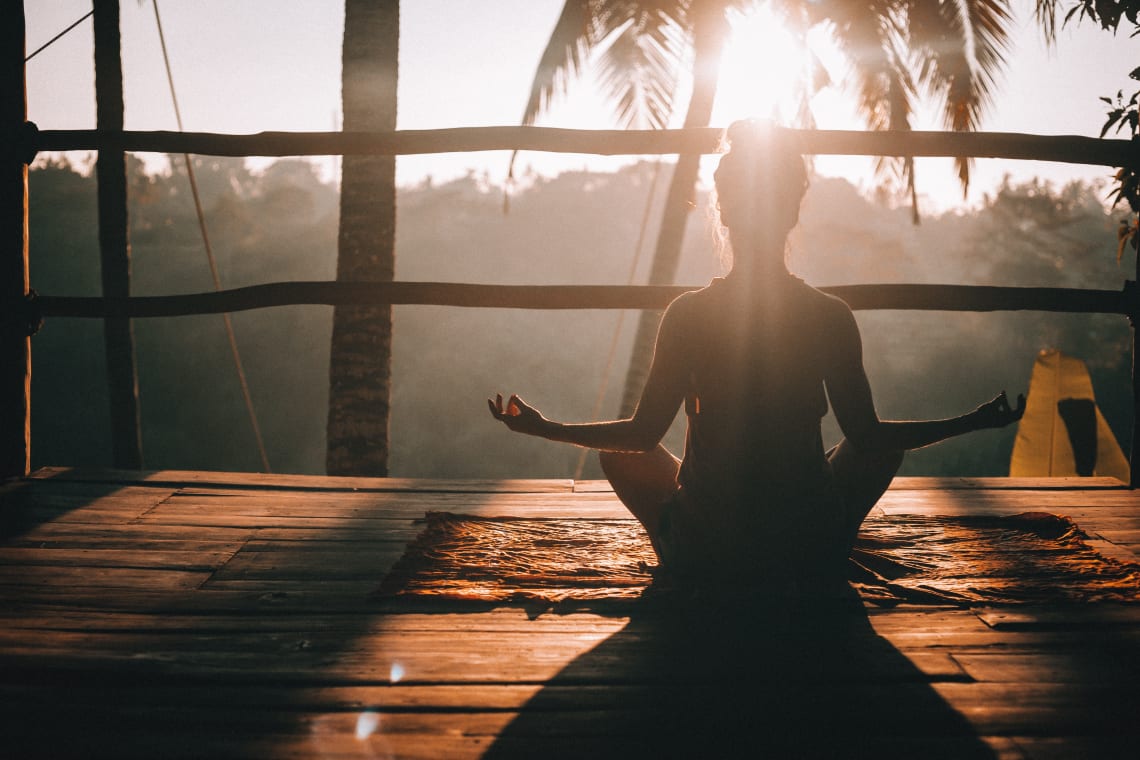
Other travel safety tips
In addition to trying a work exchange and having travel insurance , there are a few other habits you should adopt for traveling in Indonesia. Those wondering, “Is Indonesia safe?”, can confirm the safety of their trip by practicing smart travel tips . Most of these safety tips can apply to any destination!
Avoid going out alone at night
This is a safety tip that applies to anyone, in any country. Exploring alone at night is never a good idea! Explore alone during the day, or explore at night with a group. But venturing out alone in a foreign environment after dark can put you at risk.
Especially for solo female travelers , try to do all your sightseeing during the day. If you do want to go out at night for dinner or partying, make sure you’re with a trustworthy group of people who will have your back!
Get necessary vaccinations
When traveling to a country like Indonesia, visit your doctor before your trip to ensure you have the necessary vaccinations and medications. “Bali Belly” is a common term for food poisoning or upset stomachs in Indonesia, so get some medicine that can help. And make sure you’re vaccinated against diseases such as Yellow Fever, Dengue, Malaria, and other harmful conditions.
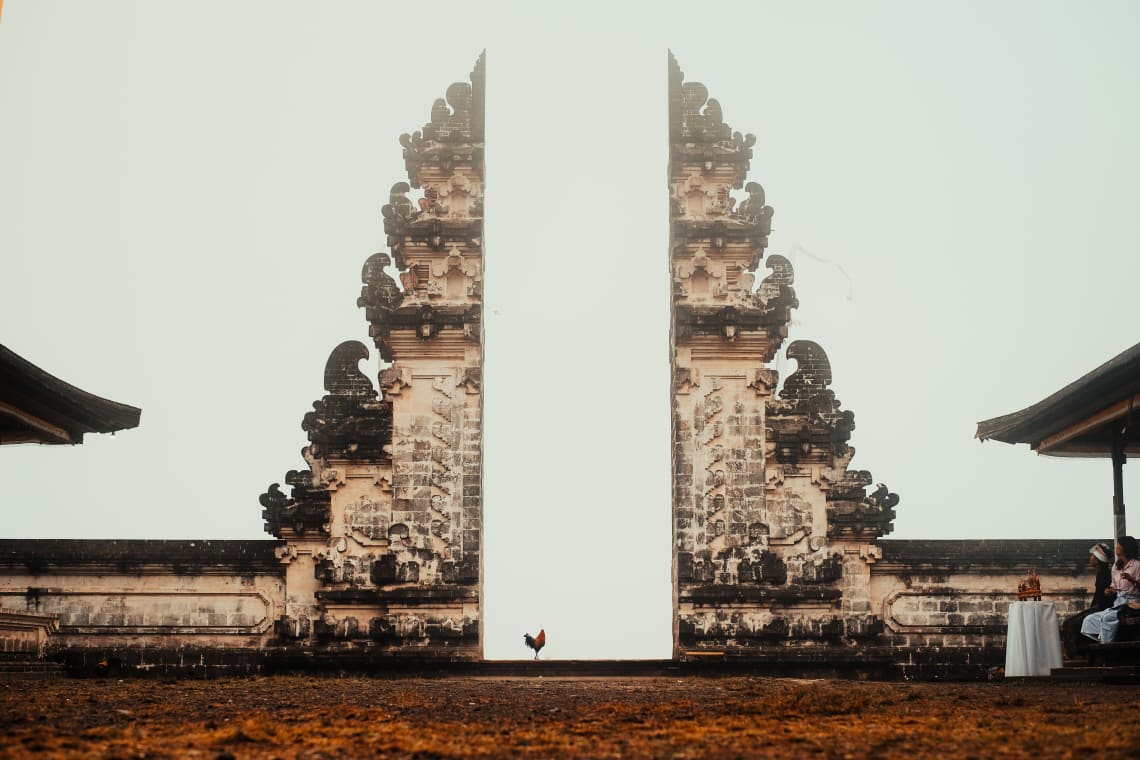
Dress appropriately
Make sure you learn about and respect the local cultures , traditions, and religions in any country. Much of Indonesia follows Islam, which has strict expectations for what people and women should wear. Try to blend in by wearing similar clothes to the locals and showing respect for the religious customs.
Don’t wear flashy clothes or jewelry
While out exploring, don’t make yourself a target for pickpockets by wearing flashy jewelry! Even carrying around an expensive phone or camera makes you look attractive to pickpockets. Keep valuables locked safely at your accommodation . If you need a phone, camera, or debit card while sightseeing, keep it securely stored in your bag, which you can have an eye or a hand on at all times.
Ensure you follow the local laws
Indonesia has very strict laws for things like drugs and certain behaviors. Check the local laws and make sure you abide by them. Punishments can be severe for misdemeanors, and it’s smart to keep yourself out of trouble while traveling.
Research your destination beforehand
No matter where you are traveling, good research can help keep you safe and prepared! All of the safety tips and precautions mentioned in this article will help you have a smooth trip.
Following local alerts, being prepared for natural disasters, and knowing which areas to avoid will help you stay safe in Indonesia! Showing up to a country with no information or knowledge can put you at risk, so it’s best to always do your research.
- Want to learn more about planning your trip to Indonesia? By subscribing to the WP pack plan you have unlimited access to +120 courses at Worldpackers Academy, the travel school made by travelers!
Join the community!
Create a free Worldpackers account to discover volunteer experiences perfect for you and get access to exclusive travel discounts!
Gabrielle Boucher
Budget Travel With Gabby
Hello! I am a 25 year old from the USA with a knack for traveling on a budget. I fell in love with traveling while studying in Europe, and that love grew even more when I started volunteering abroad in South America. Since then, I've worked odd jobs and volunteered all over the globe while cultivating passions for hiking, wildlife photography, food, wine, animals, permaculture, and more!

Be part of the Worldpackers Community
Already have an account, are you a host, leave your comment here.
Write here your questions and greetings to the author
May 13, 2023
Jun 01, 2023
Jul 18, 2023
Hello I'm India please come to india
I won't travel the world
Jade Chords
Aug 16, 2023
More about this topic

Discover India's top 3 best ecotourism destinations
Japan on a budget: live like a local and save your dollars
Australia travel tips for first-time travelers: when to visit and the best things to do, how do worldpackers trips work.
As a member, you can contact as many hosts and travel safely as many times as you want.
Choose your plan to travel with Worldpackers as many times as you like.
Complete your profile, watch the video lessons in the Academy, and earn certificates to stand out to hosts.
Apply to as many positions as you like, and get in contact with our verified hosts.
If a host thinks you’re a good fit for their position, they’ll pre-approve you.
Get your documents and tickets ready for your volunteer trip.
Confirm your trip to enjoy all of the safety of Worldpackers.
Have a transformative experience and make a positive impact on the world.
If anything doesn’t go as planned with a host, count on the WP Safeguard and our highly responsive support team!
After volunteering, you and your host exchange reviews.
With positive reviews, you’ll stand out to hosts and get even more benefits.

Search Smartraveller

Latest update
Exercise a high degree of caution in Indonesia overall due to security risks.
Higher levels apply in some areas.

Indonesia (PDF 699.19 KB)
Asia (PDF 2.21 MB)
Local emergency contacts
Fire services, ambulance and rescue services, medical emergencies.
Call 110 or 112.
Tourist Police, Bali
Call (+0361) 759 687.
Tourist Police, Jakarta
Call (+201) 526 4073.
Advice levels
Exercise a high degree of caution in Indonesia overall.
Reconsider your need to travel to the provinces of Papua (Papua), Papua Highlands (Papua Pegunungan), Central Papua (Papua Tengah) and South Papua (Papua Selatan).
Reconsider your need to travel to the provinces of Papua, Papua Pegunungan, Papua Tengah and Papua Selatan due to the risk of serious security incidents or demonstrations that may turn violent.
- There's an ongoing risk of terrorist attack in Indonesia. Be alert to possible threats. Take official warnings seriously and follow the advice of local authorities. Popular tourist areas may be the target of terrorist attacks.
- Public protests and events that draw large groups of people occur regularly and can turn violent with little notice. Expect traffic delays and restricted access to locations if there are protests. Avoid protests and demonstrations and monitor local media for the latest updates.
- Many of Indonesia's volcanoes are active and can erupt without warning. Adhere to exclusion zones around volcanoes, which can change at short notice, and follow the advice of local authorities. Domestic and international flights can be disrupted. Monitor Indonesia's Volcano Observatory Notice for the latest volcanic activity (Bahasa Indonesia and English), Global Disaster Alert and Coordination System and the Volcanic Ash Advisory Centre for updates.
- There's been tension, including demonstrations and violence, in certain towns in the provinces of Papua, Papua Pegunungan, Papua Tengah and Papua Selatan in recent years. Armed groups have stated that they're targeting foreigners, including Australians. Our ability to provide consular support in these provinces is limited. Armed groups have shot at aircraft, including commercial planes, in remote airports in Papua Pegunungan and Papua Tengah provinces.
- Petty and violent crime occurs in Indonesia. Opportunistic crime, such as pickpocketing occurs. Drinks may be spiked or mixed with toxic substances. Crimes involving taxis and taxi drivers occur. Solo women are at higher risk. Be alert in taxis, public transport, crowds, bars and nightclubs.
- Legal disputes over real estate are common, including in Bali. Before entering into an agreement or providing financial details, do your research and get legal advice.
- Natural disasters such as severe weather, floods, landslides, earthquakes, volcanic eruptions and tsunamis occur regularly. Weather conditions can change quickly during the wet season (October – April). Regularly check weather reports, monitor media and speak to your travel provider before continuing with planned activities. Follow the advice of local authorities.
- When undertaking adventure activities, ensure that functioning safety equipment is available, that you have travel insurance and that your policy covers you for these activities.
Full travel advice: Safety
- The standard of medical facilities in Indonesia is generally lower than in Australia. Many regional hospitals only provide basic facilities.
- Some medications, including prescription medications, drugs for attention deficit hyperactivity disorder (ADHD), all cannabis-based products including medicinal cannabis, cannabis-based oils and creams, hemp-based products, CBD, THC, hash and edibles, are illegal in Indonesia. Harsh penalties, such as arrest and jail time, can apply even if you have a prescription. Make sure your medication is legal in Indonesia .
- Purchasing prescription medication online or over the counter in Indonesia without an Indonesian prescription is illegal. Ensure you provide a valid prescription from an Indonesian doctor before purchasing prescription medication and confirm that it's accepted by the seller before your purchase.
Full travel advice: Health
- Indonesia has revised its criminal code, which includes penalties for cohabitation and sex outside of marriage. These revisions will not come into force until January 2026.
- Penalties for drug offences include heavy fines, long prison sentences and the death penalty. Police target tourist destinations.
- Some medications are illegal in Indonesia. Harsh penalties can apply even if you have a prescription. It is also illegal to purchase prescription medications online or over the counter without an Indonesian prescription. Ensure you have a valid Indonesian prescription. See ' Health '.
The death penalty exists for some crimes in Indonesia.
- Standards of dress and behaviour are conservative in many parts of Indonesia. Learn about local customs. Take care not to offend.
- Aceh province upholds aspects of sharia law. Sharia law applies to everyone, including travellers. Inform yourself about the laws, and be careful not to offend or break local laws. If in doubt, seek local advice.
Full travel advice: Local laws
- The Bali Provincial Government has introduced a new tourist levy of IDR 150,000 per person to foreign tourists entering Bali. The tourist levy is separate from the e-Visa on Arrival or the Visa on Arrival. Cashless payments can be made online prior to travel or on arrival at designated payment counters at Bali's airport and seaport. See the Bali Provincial Government's official website and FAQs for further information.
- If you're travelling to Indonesia for tourism, official government duties or business meetings, you can apply for an e-Visa on Arrival (e-VOA) online at least 48 hours before your travel to Indonesia. This also applies if you're transiting through Indonesia at international airports, seaports and land crossings. You can get a Visa on Arrival (VOA) at some international airports, seaports or land crossings.
- To apply for the e-VOA or VOA, you must have an ordinary (non-emergency) passport with at least 6 months of validity from the date you plan to enter (we also recommend having at least 6 months of passport validity from the date you plan to leave Indonesia, to avoid any issues for your departure or onward travel) and a return or onward flight booking to another country.
- You may need to apply for a visa in advance to enter Indonesia for purposes not covered by the e-VOA or VOA. Check the latest entry requirements with your travel provider or an Embassy or Consulate of Indonesia before travel. Entry, exit and transit conditions can change at short notice. Monitor media for the latest updates.
- You'll be required to complete an e-customs declaration for arrival. You can complete this within 3 days of departure to Indonesia.
- Travel requirements may change at short notice, including travel to Bali and Jakarta by air, land or sea. Contact your travel provider and monitor media for up-to-date details.
Full travel advice: Travel
Local contacts
- The Consular Services Charter tells you what the Australian Government can and can't do to help when you're overseas.
- For consular help, contact the Australian Embassy, Jakarta , the Australian Consulate-General, Bali , the Australian Consulate-General, Makassar or the Australian Consulate-General, Surabaya .
- To stay up to date with local information, follow the Embassy's social media accounts.
Full travel advice: Local contacts
Full advice
The terrorist threat in Indonesia is ongoing. Attacks could happen anywhere and anytime. This includes places that foreigners visit.
Be alert to possible threats. Take official warnings seriously and follow the advice of local authorities. Remain respectful of religious and local customs.
Indonesian authorities continue to investigate and disrupt terrorist groups in Indonesia, including Bali.
Terrorist attacks are motivated by extreme beliefs. Both local grievances as well as events in other parts of the world could motivate extremists in Indonesia towards violence.
Recent terrorist attacks
In December 2022, an explosion occurred at a police station in Bandung, Jawa Barat, killing 2 and injuring 11.
In March 2021, 2 suicide bombers attacked a church in Makassar, injuring dozens.
In the past, police have said that terrorist suspects remain at large and may seek Western targets.
Indonesian security agencies continue to conduct operations against terrorist groups.
Terrorists in Indonesia may carry out small-scale violent attacks with little or no warning.
Be alert in places of worship, especially during periods of religious significance.
Terrorists have targeted places of worship in:
As well as places of worship, other possible targets by terrorists include:
- Indonesian government facilities, premises and symbols associated with the Indonesian Government
- police stations and checkpoints
- bars, nightclubs, cafes and restaurants
- cinemas and theatres
- shopping centres, public transport and transport hubs
- airports and airlines
- clubs, including sporting clubs
- tourist areas and attractions, tour buses and tour groups
- outdoor recreation events
Supporters have committed additional acts of violence in response to high-profile extremists being detained or killed.
To protect yourself during a terrorist attack:
- leave the area as soon as it's safe
- follow the advice of local authorities
- don't gather in a group after an attack
- don't gather in a group if you're evacuated from a building
Security remains at a high level at:
- the Australian Embassy in Jakarta
- the Consulates-General in Bali, Makassar and Surabaya
More information:
Civil unrest and political tension
Most events are announced before they happen; however, protests may occur with little or no notice.
Protests and events are often held near major government buildings and embassies in Jakarta, including the Australian Embassy.
Protests may also occur at any of Australia's Consulates-General in Surabaya, Bali and Makassar, at government buildings, or the offices of international organisations in Indonesia.
You can expect traffic delays and restricted access to locations if there are protests.
Phone or email ahead for an appointment before going to the Embassy or the Consulates-General (see Local contacts ).
Demonstrations and acts of violence can happen when courts try and sentence extremists.
Conflict between different communities can sometimes occur, including in the provinces of Papua, Papua Pegunungan, Papua Tengah and Papua Selatan. Our ability to provide consular support in these provinces is limited.
Local violence can also be directed at minority groups in other parts of Indonesia, including in Java.
If you're found to endanger security or public order, you may be prosecuted under Indonesia's Immigration laws, which may result in imprisonment or deportation.
To protect yourself from possible violence:
- avoid protests and demonstrations
- monitor local media for the latest security updates
- plan your activities to avoid potential unrest on significant dates
- be prepared to change your travel plans
- Demonstrations and civil unrest
Armed conflict
The provinces of Papua, Papua Pegunungan, Papua Tengah and Papua Selatan experience regular violent clashes involving armed groups, civilians, Indonesian police, and the military. Armed groups have stated that they are targeting foreigners, including Australians. Our ability to provide consular support in these provinces is limited.
Many people have been killed and injured in clashes. This includes members of security forces, armed groups and civilians. Violent attacks have occurred in several areas of these provinces, including in and around Jayapura. There's a risk of more attacks.
On 23 February 2023, a riot broke out in Wamena, Papua Pegunungan, when a crowd attacked Indonesian security personnel following the arrest of two people accused of child kidnapping. 12 civilians and rioters were killed.
Violent attacks have occurred around the Freeport Mine in Papua Tengah.
Armed groups have:
- taken a New Zealand pilot hostage in Paro, Papua Pegunungan
- shot at aircraft, including commercial planes, at Beoga airport in Pupua Tengah province and Nop Goliat Dekai airport in Papua Pegunungan province.
- killed people in attacks, including one Australian
- attacked vehicles using the road between Grasberg and Timika
- killed people in violent attacks in Puncak Jaya District, Papua Tengah
- more attacks are possible and could target infrastructure and national institutions.
A range of crimes, including violent crime, occur in Indonesia. Crimes can happen in popular tourist locations in Bali.
To protect yourself from crime:
- be aware of your surroundings
- be alert in crowds
- understand the potential crime risks
Theft, robbery and bag and phone snatching have occurred. These crimes can sometimes involve violence. Opportunistic crime such as pickpocketing occurs.
Be careful of thieves:
- on motorcycles targeting pedestrians
- in upmarket shopping malls
- in crowded public transport
- at traffic lights targeting people in stopped cars
- at bars and nightclubs
- when entering accommodation, including villas in Bali
Keep bags and valuables out of sight in vehicles.
If you're travelling on foot, walk:
- on footpaths
- away from the curb
- with your bag held away from traffic
Sexual assault
If you're a victim of sexual assault :
- get immediate medical assistance. If you have any doubts about seeking medical assistance after a sexual assault, contact your nearest Australian Embassy or Consulate in Indonesia (see Local contacts ) as quickly as possible.
- make a full statement to local police, in person, so they can conduct a criminal investigation. You may wish to seek consular help before you visit the police station. Contact your nearest Australian Embassy or Consulate (see Local contacts ).
Local police can only investigate a crime after you've left Indonesia if you've reported it.
Your sworn statement, or statements by witnesses, can be used as evidence in criminal court proceedings.
You don't always need to be in Indonesia for trial. Neither do witnesses who live outside of Indonesia.
Counselling support
Should you wish to speak to a counsellor, you can call the 24-hour Consular Emergency Centre on +61 2 6261 3305 or contact your nearest Australian Embassy or Consulate (see Local contacts ). They can connect you to counselling hotlines and services.
- Reducing the risk of sexual assault
Bars and nightclubs
Be alert in bars and nightclubs. Drink-spiking and snatching of valuables may occur if you're not alert.
Drinks may be contaminated with drugs or toxic substances. See Health .
Don't leave your food or drinks unattended.
Never accept drinks, food, gum, cigarettes, vapes or e-cigarettes from people you've just met.
- Partying safely
Credit card and ATM fraud
Credit card, online banking and ATM fraud occurs in Indonesia.
Check your bank statements.
Make sure your bank doesn't block your cards. Tell your bank you'll be visiting Indonesia.
Never let your card out of your sight. This includes when you pay in restaurants.
Shield your PIN from sight.
Some vendors install hidden cameras and use card skimmers.
Don’t click on unknown links in WhatsApp or mobile phone text messages, particularly if your phone is linked to mobile banking.
Use ATMs at controlled and secure places, such as:
- shopping centres
Scams and confidence tricks
Beware of scams and confidence tricks.
Only exchange money at authorised money changers. Authorised money changers can also be found on the Bali Foreign Exchange website . Unauthorised money changers have been known to scam foreign tourists in Bali and elsewhere.
All types of gambling are illegal in Indonesia.
Australians have lost large sums of money in card game scams run by organised gambling gangs, particularly in Bali. See Local laws
Some tourists have been robbed or planted with drugs after taking new acquaintances back to their hotel rooms. In some cases, their drinks were spiked.
Legal disputes over the purchase of real estate are common, including in Bali, involving:
- holiday clubs and resorts
- timeshare schemes
Before entering into an agreement or providing financial details:
- thoroughly research the proposal
- get legal advice and know your rights, especially before you sign any documents
Using taxis
Only use licensed official metered taxis. Crimes involving unregistered taxis include:
- taxis departing before the passenger can take their baggage from the vehicle
- taxi drivers robbing or temporarily holding passengers, including in urban areas
- taxi drivers forcing passengers to withdraw money at ATMs before releasing them
Lone female travellers are at higher risk of crime.
If you're in an incident involving a taxi, leave the taxi and the immediate area if it's safe to do so.
To protect yourself from overcharging and scams:
- only travel in licensed taxis with signage, a "taxi" roof sign and meters working
- ensure the driver's identification card is visible
- book via your phone, on an official taxi company mobile app, from inside an airport, or at stands at major hotels
See Travel .
Cyber security
You may be at risk of cyber-based threats during overseas travel to any country. Digital identity theft is a growing concern. Your devices and personal data can be compromised, especially if you're connecting to Wi-Fi, using or connecting to shared or public computers, or to Bluetooth.
Social media can also be risky in destinations where there are social or political tensions, or laws that may seem unreasonable by Australian standards. Travellers have been arrested for things they have said on social media. Don't comment on local or political events on your social media.
- Cyber security when travelling overseas
Kidnapping occurs across the world with political, ideological and criminal motives. Foreigners, including Australians, have been kidnapped overseas while travelling. Kidnaps can happen anywhere, anytime, including destinations that are typically at lower risk.
On 7 February 2023, a New Zealand pilot was taken hostage by an armed group in Paro, Papua Pegunungan.
The Australian Government's longstanding policy is that it doesn't make payments or concessions to kidnappers.
Adventure activities
Many businesses don't follow safety and maintenance standards. This includes transport and tour operators, water sports providers, hotels, restaurants and shops.
It may affect adventure activities, such as:
- bungee jumping
- scuba diving and snorkelling
- chairlift or gondola rides
In the past, Australians have been seriously injured or died while participating in adventure activities. If you require intensive care medical treatment, emergency surgery or medical evacuation. The Australian Government won't pay for these costs.
If you plan to do an adventure activity :
- check if your travel insurance policy covers it
- ask about safety, search and rescue procedures
- ask about and insist on minimum safety requirements
- always use available safety gear, such as life jackets or seatbelts
- check with your travel provider on vessel capacity limits before embarking on sea, land or air travel
- check weather and ocean conditions, and whether the vessel has had any mechanical issues, on the day and before continuing with water activities or sea travel
- check where the nearest medical facilities are
If proper safety equipment isn't available or you're unsure of the provider's safety or maintenance procedures, use another provider.
Trekking and climbing
Some mountain treks suit only experienced climbers. Travel with a guide and check the level of difficulty beforehand.
Many trekking options may be on or around an active volcano. Many of Indonesia's volcanoes are active and can erupt without warning. Volcanic and seismic activity may continue for some time. Adhere to exclusion zones around volcanoes, which can change at short notice, and follow the advice of local authorities. If you're planning to travel to an area near an active volcano, check with local authorities before climbing and check:
- Bureau of Meteorology Volcanic Ash Advisory Centre
- MAGMA Indonesia (Bahasa Indonesia) for daily updates on status and alert levels
- National Disaster Management Authority (BNPB) (Bahasa Indonesia)
- Global Disaster Alert and Coordination System
Swimming safety
People have drowned in coastal areas, including in Bali, due to rough seas, strong currents, or from swimming, snorkelling or scuba diving in areas where there is frequent passage of boats, resulting in collisions.
Local beach rescue services may not be of the same standard as in Australia.
Saltwater crocodiles are in rivers throughout Indonesia. Avoid swimming around river estuaries and seek local advice in other locations.
If you plan to spend time in or on the water:
- regularly check weather reports as sea conditions can change rapidly
- take warnings seriously
- check media and local sources for information about potential dangers
- speak to your travel provider about safety equipment and weather conditions before continuing with planned activities
- take a friend or family member with you when you undertake swimming or water activities
- be careful when swimming, snorkelling or scuba diving near motor-powered boats or where there is frequent passage of boats
- ensure you have travel insurance and that your policy covers you for planned activities
Ensure you have travel insurance and that your policy covers you for planned activities.
Climate and natural disasters
Indonesia experiences natural disasters and severe weather , including:
- landslides and mudslides
- volcanic eruptions
- earthquakes
- storms resulting in turbulent sea conditions
- tsunamis and high wave events
If there's a natural disaster or severe weather:
- always carry your passport in a waterproof bag
- keep in contact with family and friends
- check the media and local sources for information
- don't undertake sea, land or air travel if it's not safe to do so
- Indonesian Meteorology, Climatology and Geophysics Agency (BMKG) (English and Bahasa Indonesia)
- BMKG Multi-Hazard Early Warning System app (English and Bahasa Indonesia)
Floods and mudslides
Floods , landslides and mudslides occur regularly during the wet season from October to April, with some severe events resulting in injury, displacement, death or damaged infrastructure.
Heavy rains can cause significant flooding in urban areas, including the greater Jakarta region, causing disruption to transportation. Monitor the local media for updates.
Walking and driving in flooded areas can be dangerous. Flood waters may hide uncovered drainage ditches.
Volcanic activity may escalate with little or no notice, leading to flight disruptions and airport closures, including in surrounding provinces. Contact your airline for the latest flight information.
There are 147 volcanoes in Indonesia. 76 of them are active volcanoes and could erupt at any time.
Volcanic alert levels and exclusion zones may rise quickly. You may be ordered to evacuate at short notice. Volcanic activity can disrupt domestic and international flights. There are 4 volcano alert levels in Indonesia; 1 - normal, 2 - advisory, 3 - watch, 4 - warning.
Before you travel to areas that are prone to volcanic activity, monitor media and ensure you read the Indonesian Government's latest advice on current volcanic activity, including:
- Volcanic Activity Report by Indonesia's Multiplatform Application for Geohazard Mitigation and Assessment (MAGMA) (Bahasa Indonesia)
- Volcano Activity and Observatory Notices (English and Bahasa Indonesia)
- MAGMA Indonesia Map of Latest Volcano Levels and Climate Information (Bahasa Indonesia)
- Bureau of Meteorology's Volcanic Ash Advisory Centre
If there's volcanic activity:
- avoid the area
- take official warnings seriously and adhere to exclusion zones
- follow the instructions and advice of local authorities
- follow evacuation orders
- read our advice on Volcanic eruptions while travelling
Volcanic ash can cause breathing difficulties. The risk is higher for people with chronic respiratory illnesses, including:
Recent and frequent volcanic activity has included:
- Mount Ile Lewetolok in East Nusa Tenggara (Nusa Tenggara Timur)
- Mount Lewotobi Laki Laki in East Flores Regency, Nusa Tenggara Timur
- Mount Marapi in West Sumatra
- Mount Anak Krakatau, to the south of Sumatra
- Mount Merapi, near Yogyakarta
- Mt Dukono in North Sulawesi
- Mount Semeru, near Malang, East Java
- Mount Agung in Bali
- Mount Sinabung in North Sumatra
Some trekking routes are on or near active volcanoes, including Mount Agung and Mount Batur in Bali, Mount Marapi in West Sumatra, Mount Merapi near Yogyakarta, Mount Rinjani in Lombok, Mount Bromo and Mount Ijen in East Java. See 'Trekking and climbing'.
If you're planning to travel to an area near an active volcano, make sure you have comprehensive travel insurance and check if any restrictions apply.
If a volcanic eruption occurs:
- make a backup plan in case you're affected
- contact your airline or travel insurer to confirm flight schedules and get help
- keep in touch with family and friends
- Learn more about volcanic eruptions (Geoscience Australia)
- See practical advice and information about volcanic eruptions (US CDC)
- See worldwide volcanic activity reports in real-time (GDACS)
Earthquakes
Indonesia is in an active earthquake region. It has a high level of earthquake activity, that sometimes triggers tsunamis.
There are approximately 4,000 earthquakes across Indonesia every year. Around 70 to 100 of these are over 5.5 magnitude.
Earthquakes can cause death, injury and significant damage to infrastructure.
Strong earthquakes can occur anywhere in Indonesia. They are less common in Kalimantan and south-west Sulawesi.
To stay safe during an earthquake:
- know the emergency plans at your accommodation
- take precautions to avoid exposure to debris and hazardous materials, including asbestos
- MAGMA Indonesia (Bahasa Indonesia)
- Indonesia's Meteorology, Climatology and Geophysics Agency (Bahasa Indonesia) or BMKG Multi-Hazard Early Warning System app (English and Indonesia)
- Indonesia's Centre for Volcanology and Geological Disaster Mitigation (Bahasa Indonesia)
- US Federal Emergency Management Agency advice on what to do before, during and after an earthquake (English)
Forest fires and smoke haze
During the dry season in April to November, widespread forest fires can cause smoke haze resulting in poor air quality across parts of Indonesia, particularly the Riau Islands, central Sumatra and Kalimantan.
Smoke haze could affect your health and travel plans.
Keep up to date with local information and seek medical advice on appropriate precautions.
- ASEAN Regional Haze Situation
- Smartraveller advice on Bushfires
Tsunamis and high wave events
The Indian and Pacific Oceans experience more frequent, large and destructive tsunamis than other parts of the world.
There are many large earthquakes along major tectonic plate boundaries and ocean trenches.
High wave events can happen throughout coastal regions and between islands. They're caused by strong weather conditions and storms.
If you plan to surf, undertake water activities or travel by sea, check local conditions regularly.
If there’s a tsunami or high wave event:
- don't travel by sea if it's not safe to do so
- Indonesia Tsunami Early Warning Centre issues warnings when a potential tsunami with significant impact is expected
- Indonesia's Meteorology, Climatology and Geophysics Agency with the latest list of earthquakes with a magnitude greater than 5.0 on the Richter scale (Bahasa Indonesia) or BMKG Multi-Hazard Early Warning System app (English and Bahasa Indonesia)
- US Federal Emergency Management Agency page on what to do before, during and after an earthquake
Piracy occurs in the coastal areas of Indonesia.
The International Maritime Bureau (IMB) issues weekly piracy reports.
If you decide to travel by boat in these regions:
- check IMB piracy reports
- get local advice
- arrange security measures
- Travelling by boat
- Going on a cruise
- International Maritime Bureau
Travel insurance
Get comprehensive travel insurance before you leave.
Your policy needs to cover all overseas medical costs, including emergency treatment and medical evacuation. The Australian Government won't pay for these costs.
If you can't afford travel insurance, you can't afford to travel. This applies to everyone, no matter how healthy and fit you are.
If you're not insured, you may have to pay many thousands of dollars up-front for medical care.
Before you travel, confirm:
- what activities and care your policy covers
- that your insurance covers you for the whole time you'll be away, including on all forms of transport you plan to take
- whether it covers medical evacuation in the event of hospitalisation or injury
- any exclusions to your policy
Physical and mental health
Consider your physical and mental health before you travel, especially if you have an existing medical condition.
See your doctor or travel clinic to:
- have a basic health check-up
- ask if your travel plans may affect your health
- plan any vaccinations you need
Do this at least 8 weeks before you leave.
If you have immediate concerns for your welfare or the welfare of another Australian, call the 24-hour Consular Emergency Centre on +61 2 6261 3305 or contact your nearest Australian Embassy, High Commission or Consulate to discuss counselling hotlines and services available in your location.
- General health advice
- Healthy holiday tips (Healthdirect Australia)
Not all medication available over the counter or by prescription in Australia is available in other countries. Some may even be considered illegal or a controlled substance, even if prescribed by an Australian doctor.
Some drugs used to treat attention deficit hyperactivity disorder (ADHD) are illegal in Indonesia.
If you plan to bring over-the-counter or prescription medication, check if it's legal in Indonesia by contacting the Indonesian Embassy in Canberra well in advance of your planned travel. Take enough legal medicine for your trip and carry it in its original packaging. Purchasing prescription medication online in Indonesia without an Indonesian prescription is illegal. Ensure you provide a valid prescription from an Indonesian doctor before purchasing prescription medication and confirm that it's accepted by the seller prior to your purchase.
Carry a copy of your prescription and a letter from your doctor stating:
- what the medicine is
- your required dosage
- that it's for medical treatment or use
If you're caught with illegal medicine, you could face detention, fines or harsher penalties. You could face charges even if an Australian doctor prescribed the medication.
Ask the Indonesian Embassy in Canberra for advice before you travel.
Medicinal cannabis and cannabis-based products
Cannabis-based products such as cannabis oil and creams, hemp, CBD, THC, hash and edibles remain illegal in Indonesia, including for medicinal purposes. A medical prescription does not make it legal. If you take such products to Indonesia or purchase or use them in Indonesia, you can be arrested and face imprisonment, fines, deportation or the death penalty.
- Medications
Health Risks
Critical care for Australians who become seriously ill, including in Bali, is significantly below the standard available in Australia. Medical evacuation may not be possible.
The Australian Government cannot guarantee your access to hospitals and other health services in Indonesia.
Medical evacuation to Australia for medical conditions, is possible but is very expensive and may not be covered by travel insurance. Check your policy before you travel.
Ban on sale of liquid/syrup medication
The Indonesian Ministry of Health (MoH) has advised local health workers and pharmacists to stop selling liquid/syrup medication, including commonly used medications containing paracetamol and cough syrups. MoH and the Indonesian Paediatrician Association (IDAI) received reports of a sharp increase in cases of Atypical Progressive Acute Kidney Injury (AKI) in children , especially under the age of 5 years.
Insect-borne illnesses
Insect-borne illnesses are common throughout the year.
To protect yourself from disease:
- research your destination
- ask locals for advice
- make sure your accommodation is mosquito-proof
- use insect repellent
- wear long, loose, light-coloured clothing
Dengue occurs throughout Indonesia, including Bali, Jakarta and other major cities.
Dengue is common during the rainy season.
Australian health authorities have reported an increase in dengue infections in people returning from Bali in recent years.
Consult your travel doctor for further information on available vaccines and their suitability for your individual circumstances.
Zika virus can occur in Indonesia.
Protect yourself from mosquito bites.
The Australian Department of Health and Aged Care advises pregnant women to:
- discuss any travel plans with their doctor
- consider deferring non-essential travel to affected areas
Malaria , including chloroquine-resistant strains, is widespread in rural areas, particularly in the provinces of Papua, Papua Pegunungan, Papua Tengah, Papua Selatan, Papua Barat Daya, Papua Barat, Maluku and Nusa Tenggara Timur. There is no malaria transmission in Jakarta.
- Consider taking medicine to prevent malaria.
Japanese encephalitis and filariasis
Japanese encephalitis and filariasis occur in Indonesia, especially in rural agricultural areas.
Japanese encephalitis has been present in Australian travellers returning from Indonesia, including Bali.
Vaccination is recommended for certain groups of travellers.
- Infectious diseases
Drink poisoning
People have been poisoned by alcoholic drinks contaminated with harmful substances, including methanol and arak (a traditional rice-based spirit). Locals and foreigners, including Australians, have died or become seriously ill from poisoned drinks.
Cases of drink poisoning have been reported in Bali and Lombok.
Contaminated drinks have included:
- local spirits
- spirit-based drinks, such as cocktails
- brand name alcohol
To protect yourself from drink poisoning:
- consider the risks when drinking alcoholic beverages
- be careful drinking cocktails and drinks made with spirits
- drink only at reputable licensed premises
- avoid home-made alcoholic drinks
Labels on bottles aren't always accurate.
Symptoms of methanol poisoning can be similar to drinking too much. However, they are usually stronger.
Symptoms of methanol poisoning include:
- vision problems
Vision problems may include:
- blindness, blurred or snowfield vision
- changes in colour perception
- difficulty looking at bright lights
- dilated pupils
- flashes of light
- tunnel vision
If you suspect that you or someone you're travelling with may have been poisoned, act quickly. Urgent medical attention could save your life or save you from permanent disability.
Report suspected cases of methanol poisoning to the Indonesian police.
Magic mushrooms
Don't consume magic mushrooms. They're illegal.
Australians have become sick or injured after taking magic mushrooms.
Australians have been in trouble with local police after taking magic mushrooms, particularly in Bali.
Magic mushrooms can cause major health problems, including:
- erratic behaviour
- severe hallucinations
Rabies is a risk throughout Indonesia, especially in:
- Nusa Tenggara Timur, including Labuan Bajo
- South Sulawesi
- West Kalimantan
- Nias, off the west coast of Sumatra
To protect yourself from rabies:
- avoid direct contact with dogs
- don't feed or pat animals
- avoid contact with other animals, including bats and monkeys.
Talk to your doctor about getting a pre-exposure rabies vaccination.
If bitten or scratched by an animal:
- immediately use soap and water to wash the wound thoroughly for 15 minutes
- seek urgent medical attention.
Rabies treatment in Indonesia may be limited, including the rabies vaccine and immunoglobulin availability. If you're bitten, you may need to return to Australia or travel to another country for immediate treatment.
You're at risk of contracting rabies if you visit a market where live animals and fresh food are sold because:
- live rabies-positive dogs may be present
- rabies-positive dog meat may be sold as food
Selling dog meat for human consumption is a breach of government disease control regulations.
Avoid contact with monkeys, even in places where you're encouraged to interact with them. This includes:
- popular markets
- tourist destinations
- sanctuaries
Legionnaires' disease
Cases of Legionnaires' disease have been reported in people who have travelled to Bali. Travellers who are unwell with flu-like symptoms within 10 days of returning from Bali are advised to consult their GPs.
- Legionnaires' disease warning for Bali travellers (Western Australian Government Department of Health)
- Legionnaires’ disease (Better Health Channel, Victorian Government Department of Health)
- Legionnaires' disease (World Health Organization)
Cases of poliovirus (type 1) have been reported in the provinces of Papua, Papua Pegunungan, Papua Tengah and Papua Selatan. Poliovirus (type 2) cases have been reported in the provinces of Aceh, East, West and Central Java. There may be unreported cases in other provinces in Indonesia.
Ensure that you're vaccinated against polio.
- Factsheet on poliovirus types (World Health Organization)
- Health emergencies information for Indonesia (World Health Organization)
Periodic outbreaks of measles continue to be reported in Indonesia, including Bali.
You need 2 doses of vaccine 4 weeks apart to be fully vaccinated against measles.
If you have symptoms of measles, seek medical attention.
Measles is highly infectious. Call before attending a healthcare facility.
Nipah Virus and Yellow Fever
There are no cases of Nipah virus or Yellow Fever in Indonesia. You may be temperature checked on arrival at international and domestic airports. If you have fever symptoms, you may be referred to the airport clinic for further tests and asked to seek medical treatment. See your doctor or travel clinic before you travel to plan any vaccinations you need.
HIV/AIDS is a risk for travellers. Take steps to reduce your risk of exposure to the virus.
Other health risks
Waterborne, foodborne, parasitic and other infectious diseases are widespread. These include:
- tuberculosis
Serious outbreaks sometimes occur.
To protect yourself from illness:
- boil drinking water or drink bottled water
- avoid ice cubes
- avoid raw food, such as salads
To minimise the risk of food poisoning, only eat meat from reputable suppliers.
Seek urgent medical attention if you suspect food poisoning or have a fever or diarrhoea.
Seafood toxins
You can become sick from naturally occurring seafood toxins, including:
- ciguatera fish poisoning
- scombroid (histamine fish poisoning)
- toxins in shellfish
Avoid temporary black henna tattoos. The dye often causes serious skin reactions.
Before you get any tattoo, check the hygiene and safety of your tattoo provider.
Medical care
Medical facilities.
The standard of medical facilities in Indonesia is generally lower than Australia. Many regional hospitals only provide basic facilities.
Hospitals expect families to provide support to patients, including all financial support.
Psychiatric and psychological services are limited in Indonesia. Hospital staff may use physical restraints on patients.
When diving in Indonesia, there is a risk that you may experience decompression illness. An illness may occur when a diver ascends to the water surface too quickly and may have severe consequences. Understand the risks before you dive.
Decompression chambers are available in various areas, including the following locations:
- Bali's Sanglah General Hospital
- Siloam Hospital in Labuan Bajo
- Hospitals in Jakarta, Balikpapan, Bintan, Medan, Makassar, Raja Ampat (Waisai), Maluku, Tual and Manado near popular dive sites
Before admitting patients, hospitals usually need:
- guarantee of payment from the patient or their next of kin (family or friend)
- confirmation of medical insurance
- deposit payment
There's no reciprocal healthcare agreement between Australia and Indonesia.
The Australian Government cannot provide guarantee of payment, confirmation of medical insurance or a deposit payment for services.
If you become seriously ill or injured, you may need to be evacuated to a place with better care. Medical evacuation can be very expensive. Check your insurance policy before you travel. The Australian Government won't pay for these costs. It's best to check with your travel provider on the location and functionality of decompression chambers and other medical facilities available in the area before undertaking remote travel.
You're subject to all local laws and penalties, including those that may appear harsh by Australian standards. Research local laws before travelling.
Indonesian Parliament has passed revisions to its criminal code, which includes penalties for cohabitation and sex outside of marriage. These revisions will not come into force until January 2026.
Indonesia has signed into law revisions to the Electronic and Information Transactions Law (ITE Law). Tough penalties apply for defamation, hate speech, spreading hoaxes and uploading immoral content to the Internet. The law applies both within and outside Indonesia.
If you're arrested or jailed, the Australian Government will do what it can to help you under our Consular Services Charter . But we can't get you out of trouble or out of jail.
- Arrested or jailed
Penalties for drug offences are severe. They include the death penalty.
You may face heavy fines or jail for consuming or possessing even small amounts of drugs, including marijuana. Cannabis-based products such as cannabis oil and cream, hemp, CBD, THC, hash and edibles remain illegal in Indonesia, including for medicinal purposes. A medical prescription does not make it legal. If you take such products to Indonesia or purchase or use them in Indonesia, you can be arrested and face imprisonment, fines, deportation or the death penalty.
Some prescription medications that are available in Australia are illegal in Indonesia. Purchasing prescription medication online or over the counter in Indonesia without an Indonesian prescription is illegal. Ensure you provide a valid prescription from an Indonesian doctor before purchasing prescription medication and confirm that it's accepted by the seller before your purchase.
Magic mushrooms are illegal. Indonesian police work to prevent their distribution.
Police target illegal drug use and possession across Indonesia. Police often target popular places and venues in Bali, Lombok and Jakarta.
- Carrying or using drugs
Local labour laws can change at short notice. This can affect expatriate workers.
Under Indonesian law, you must always carry identification. For example, your:
- Australian passport; and
- Resident's Stay Permit (if applicable)
Gambling is illegal.
Property laws are strict, seek legal advice before acquiring property in Indonesia.
It's sometimes illegal to take photographs in Indonesia. Obey signs banning photography. If in doubt, get advice from local officials. See Safety .
Australian laws
Some Australian criminal laws still apply when you're overseas. If you break these laws, you may face prosecution in Australia.
- Staying within the law and respecting customs
Local customs
Standards of dress and behaviour are conservative in many parts of Indonesia. Take care not to offend.
Find out what customs apply at your destination.
If in doubt, seek local advice.
LGBTQIA+ information
Same-sex relationships are legal in Indonesia, except in the province of Aceh. Same-sex relationships in Aceh may attract corporal punishment. Visible displays of same sex relationships could draw unwanted attention.
Some laws and regulations can be applied in a way that discriminates against the LGBTI community, including for pornography and prostitution.
- Advice for LGBTI travellers
The Islamic holiday month of Ramadan is observed in Indonesia. Respect religious and cultural customs and laws at this time.
During Ramadan, eating, drinking and smoking may be illegal in public during this time. If you're not fasting, avoid these activities around people who are. Seek local advice to avoid offence and follow the advice of local authorities.
Explore our Ramadan page to learn more, including dates for Ramadan.
Aceh is governed as a special territory, not a province, and has a degree of special autonomy.
Some aspects of sharia law are upheld. This includes regulations and punishments that don't apply in other parts of Indonesia.
Local sharia police enforce sharia law.
Sharia law applies to anyone in Aceh, including:
- foreigners (expats and travellers)
- non-Muslims
Sharia law doesn't allow:
- drinking alcohol
- prostitution
- same-sex relationships
- extra-marital sex
- co-habitation before marriage
It also requires a conservative standard of dress.
Learn about the laws in Aceh. If in doubt, seek local advice.
Dual citizenship
Indonesia doesn't allow dual nationality for adults, and you may be prosecuted by Immigration authorities should you be found to hold valid passports of two nationalities. If you entered Indonesia on your non-Australian citizenship passport, Indonesian Immigration will require you to exit Indonesia on that nationality's passport.
A child of Indonesian and Australian parents can maintain citizenship of both countries until the age of 18 years. Before a dual Australian-Indonesian citizen minor travels from Indonesia, additional identity documentation may be required from Indonesian Immigration. Check with Indonesian Immigration or the Indonesian Embassy in Canberra well in advance of your planned travel.
- Embassy and Consulate of Indonesia
- Information on limited dual citizenship
- Dual nationals
Visas and border measures
Every country or territory decides who can enter or leave through its borders. For specific information about the evidence you'll need to enter a foreign destination, check with the nearest embassy, consulate or immigration department of the destination you're entering.
Bali Tourism Levy
The Bali Provincial Government has introduced a new tourist levy of IDR 150,000 per person to foreign tourists entering Bali. The tourist levy is separate from the e-Visa on Arrival or the Visa on Arrival. Cashless payments can be made online prior to travel or on arrival at designated payment counters at Bali's airport and seaport. Exemption from payment of the levy applies to transit passengers and certain visa holders. See the Bali Provincial Government's official website and FAQs for further information.
e-Visa on Arrival and Visa on Arrival
You can apply for an e-Visa on Arrival (e-VOA) no later than 48 hours prior to travelling to Indonesia if you are travelling for tourism, business meetings, purchasing goods or transiting only. Check the e-VOA requirements from Indonesian Immigration before applying.
You can still apply for a regular Visa on Arrival (VOA) at certain international airports, seaports and land crossings, including Jakarta, Bali, Surabaya, Makassar, Lombok, Batam, Medan, Manado, Aceh, Padang, Tanjung Pinang and Yogyakarta, if you do not apply for an e-VOA at least 48 hours in advance of your travel to Indonesia.
The e-VOA or VOA can be used for tourism, official government duties, business meetings, or to transit through Indonesia. You cannot transit in Indonesia without an e-VOA or VOA.
Additional requirements apply if you are travelling on government duties.
For the latest list of entry points for the e-VOA or VOA, refer to the Directorate General of Immigration's list of land border crossings, international airports, and international seaports .
The e-VOA and VOA cost IDR 500,000 (approximately $A 50), with the e-VOA charging a small online processing fee.
For the VOA, some airports, including Jakarta's international airport, are only accepting cash payment. Card payment facilities are available at Bali's international airport. ATM facilities may be in high demand. Be prepared to pay in cash if required.
The visa is valid for a 30 day stay and can be extended once (for a maximum of 30 days) by applying at an immigration office within Indonesia. Ensure you extend your visa within the initial 30 days to avoid an overstay fine and deportation.
To apply for a regular VOA, you must show:
- your ordinary (non-emergency) passport with at least 6 months of validity from the date you plan to enter (we also recommend having at least 6 months passport validity from the date you plan to leave Indonesia, to avoid any issues for your departure or onward travel)
- a return flight booking to Australia or onward flight booking to another country
Contact your travel agent, airline, or your nearest Embassy or Consulate of Indonesia for details.
Other visas
If you're entering Indonesia from a port or airport that does not issue a visa on arrival, or you're visiting Indonesia for a purpose not allowed under the e-VOA or VOA conditions, you must apply for a visa in advance of travel. Check the Indonesian Immigration website for further information, or contact your nearest Embassy or Consulate of Indonesia .
Overstaying your permit may result in fines, detention and/or deportation.
- check your visa and permit, and contact the Directorate General of Immigration (DGI) for advice specific to your needs
- if you use an agent to extend your visa or stay permit, use only reputable companies
- if you have specific enquiries on visas or stay permits, contact DGI's Customer Service team via WhatsApp on +62 821 1295 3298
Entry and exit conditions can change at short notice. Contact the nearest Embassy or Consulate for details about visas, currency, customs and entry rules.
You can't work or conduct research in Indonesia unless you have the appropriate visa. Fines of IDR1,000,000 (approx. $A 100) per day apply for the maximum 60 day overstay period.
If you breach Indonesian immigration regulations, you may face:
- deportation
- re-entry bans
You may not be allowed to enter Indonesia if you have a criminal record. This is regardless of how long ago the offence took place. If you're concerned, contact an Embassy or Consulate of Indonesia before you travel.
Indonesian Immigration and visa decisions are final. The Australian Government can't help you.
- Embassy or Consulate of Indonesia
Border measures
You'll be required to complete an e-customs declaration for arrival . You can complete this within 3 days of departure to Indonesia.
Check entry requirements with your travel provider or the nearest Embassy or Consulate of Indonesia before you travel.
You may be temperature checked on arrival at international and domestic airports. If you have fever symptoms, you may be referred to the airport clinic for further tests and asked to seek medical treatment. See your doctor or travel clinic before you travel to plan any vaccinations you need.
Other formalities
If you're staying in a private residence, not a hotel, register when you arrive with both:
- the local Rukun Tetangga Office
- local police
If you plan to be in Indonesia for more than 30 days:
- register with the local immigration office
- make sure you have the right visa
- Embassy of Indonesia in Canberra
Indonesia won't let you enter unless your passport is valid for 6 months after you plan to leave Indonesia. This can apply even if you're just transiting or stopping over. You can end up stranded or returned back to your previous port overseas at your own cost, if your passport is not valid for more than 6 months from the date you enter and the date you plan to leave Indonesia.
Indonesia does not accept entry with an emergency passport, even if it is valid for more than 6 months. Ensure you enter Indonesia on a valid ordinary, official, or diplomatic passport.
Some foreign governments and airlines apply these rules inconsistently. Travellers can receive conflicting advice from different sources.
The Australian Government does not set these rules. Check your passport's expiry date before you travel. If you're not sure it'll be valid for long enough, consider getting a new passport .
Lost or stolen passport
Your passport is a valuable document. It's attractive to people who may try to use your identity to commit crimes.
Some people may try to trick you into giving them your passport. Always keep it in a safe place.
If your passport is lost or stolen, tell the Australian Government as soon as possible:
- In Australia, contact the Australian Passport Information Service .
- If you're overseas, contact the nearest Australian Embassy, Consulate or High Commission.
Damaged Passports
Indonesian authorities have strict standards for damaged passports, and travellers have been refused entry into Indonesia with a damaged passport. Normal wear and tear, including water damage, minor tears or rips to the pages, can be considered damaged.
It's important that:
- there are no tears or cuts in the passport pages, especially the photo page
- everything on the photo page is legible and clear
- there are no marks across your photo or in the Machine Readable Zone (MRZ) on the photo page
- no pages have been removed
- there is no alteration or tampering
If you're not sure about the condition of your passport, call the Australian Passport Office on 131 232 or contact your nearest Australian embassy or consulate overseas . We may need to see your passport to assess it.
- Passport Services
- Damaged and faulty passports
- Using and protecting your passport
Passport with ‘X’ gender identifier
Although Australian passports comply with international standards for sex and gender, we can’t guarantee that a passport showing 'X' in the sex field will be accepted for entry or transit by another country. Contact the nearest embassy, high commission or consulate of your destination before you arrive at the border to confirm if authorities will accept passports with 'X' gender markers.
More information:
- LGBTQIA+ travellers
The local currency is the Indonesian Rupiah (IDR).
Declare cash in excess of IDR100,000,000 or equivalent when you arrive and leave. This covers all forms of currency, not only cash.
IDR100,000,000 is worth about $A10,000.
Local travel
Travel permits.
You may need a travel permit or Surat Keterangan Jalan to travel to some areas of the Papua provinces.
Check if you need a permit with the nearest Embassy or Consulate of Indonesia or with your travel provider.
Mobile Phone Reception and Wi-Fi
Mobile phone reception and Wi-Fi are not always available, including in remote areas and some resort islands.
If you plan to stay in Indonesia for more than 90 days and would like to use your mobile phone purchased overseas, you'll need to register your mobile phone IMEI number with Indonesian Customs within the first 60 days of your stay.
If you plan to stay in Indonesia for less than 90 days, you can visit the local cellular operator/provider booth at the airport to get an access period to use the Indonesian cellular network, which is only valid for 90 days and includes data roaming.
A customs payment may be required, or a tourist SIM card can be purchased for short-term stays. You can use Wi-Fi networks without registration.
To stay in communication and avoid mobile service interruptions:
- check mobile coverage with your service provider
- register your mobile device with Indonesian Customs on arrival if you plan to connect to the mobile network
Driving permit
To drive in Indonesia, you need either:
- an Indonesian licence
- an International Driving Permit (IDP)
Check that your licence or permit is appropriate for the type of vehicle you're driving.
Your Australian licence isn't enough.
Your travel insurer will deny any claims you make if:
- you're unlicensed
- you don't hold the correct class of licence
Road travel
Traffic can be extremely congested.
Road users are often unpredictable or undisciplined.
You're more likely to be killed in a motor vehicle accident in Indonesia than in Australia. Drive defensively. Some traffic incidents can escalate into violent disputes quickly.
Consider hiring a taxi or a driver who is familiar with local roads and traffic conditions.
- Driving or riding
Motorcycles
Motorcycle accidents have killed and injured foreigners, including Australians. This includes in tourist areas, particularly Bali, Lombok and the Gili Islands.
If you're riding a motorbike and there's an accident, you'll often be assumed to be at fault. You may be expected to compensate all parties.
If you hire a motorbike:
- make sure your insurance policy covers you
- check if any policy restrictions apply, for example if you're not licensed to ride a motorcycle in Australia
Always wear a helmet.
Public transport
Buses, trains and the metro rail can be crowded, particularly:
- around public holidays
- during peak commute times
Safety standards may not be observed.
- Transport and getting around safely
Only use licensed official metered taxis.
- only travel in licensed taxis with signage, a "taxi" roof sign and meters
- book via phone or an official taxi company mobile app
You can book licensed official metered taxis
- on the taxi company's official mobile app
- from inside airports
- at stands at major hotels
Unofficial operators can have taxis that look similar to those run by reputable companies. Make sure the taxi meter is working before you get into the taxi.
See Safety .
Rail travel
Inter-city rail networks operate on the islands of Java, Sumatra and Sulawesi.
Commuter trains operate in Java, including Jakarta.
Trains can be crowded, particularly:
- during peak commuter times
Travel between islands
Travel by ferry or boat can be dangerous.
Passenger and luggage limits aren't always observed.
Equipment may not be properly maintained, and they may not have GPS or emergency communications equipment.
There may not be enough life jackets. It's unlikely that the crew will have life jackets for children.
In March 2024, a ferry sank in the Thousand Islands off the coast of Jakarta, resulting in one death, and a liveaboard boat caught fire and sank in Raja Ampat, Papua Barat Daya, requiring several passengers to be rescued.
In August 2023, two crew died after a boat carrying passengers sank in the Banyak Islands, Aceh, and three people went missing after a ship sank in the Thousand Islands off the coast of Jakarta.
In July 2023, 15 people died after a ferry sank off Sulawesi Island.
In January 2023, 23 passengers and 6 crew were rescued after an inter-island ferry sank while returning from Nusa Penida to Sanur Beach, Bali.
In May 2022, 19 people died after a ferry sank in the Makassar Strait.
In June 2018, a ferry sank on Lake Toba in Sumatra and 100s of people died.
If you plan to travel by sea between islands:
- make sure any ferry or boat you board has appropriate safety equipment, GPS and communication equipment, and life jackets
- wear a life jacket at all times
- take enough life jackets for all children travelling with you
- ask your tour operator or crew about safety standards before you travel
- check sea, weather conditions and forecasts before embarking on boat or ferry travel, and delay travel if conditions are not safe
If appropriate safety equipment isn't available, use another provider.
Avoid travelling by water after dark unless the vessel is properly equipped. Avoid travel during wet weather or storms.
DFAT doesn't provide information on the safety of individual commercial airlines or flight paths.
Check Indonesia's air safety profile with the Aviation Safety Network.
The European Union (EU) has published a list of airlines that have operating bans or restrictions within the EU. See the EU list of banned airlines .
Australian travellers should make their own decisions on which airlines to travel with.
Emergencies
Depending on what you need, contact your:
- family and friends
- travel agent
- insurance provider
Search and rescue services
Medical emergencies and ambulance.
SMS 1717 for Jakarta Police
Police Stations in Bali
Refer to the Bali Tourism Board’s list of police stations in Bali
Always get a police report when you report a crime.
Your insurer should have a 24-hour emergency number.
Consular contacts
Read the Consular Services Charter for what the Australian Government can and can't do to help you overseas.
Australian Embassy, Jakarta
Jalan Patra Kuningan Raya Kav. 1-4 Jakarta Selatan 12950
Phone: (+62 21) 2550 5555 Email: [email protected] Website: indonesia.embassy.gov.au Facebook: Australian Embassy Jakarta, Indonesia X: @DubesAustralia Instagram: @KeDubesAustralia
Make an appointment online or call (+62 21) 2550 5500 or (+62 21) 2550 5555.
Australian Consulate-General, Bali
Jalan Tantular 32 Renon Denpasar Bali 80234
Phone: (+62 361) 2000 100 Email: [email protected] Website: bali.indonesia.embassy.gov.au X: @KonJenBali Instagram: @konjenbali
Australian Consulate-General, Makassar
Wisma Kalla Lt. 7 Jalan Dr Sam Ratulangi No. 8 Makassar South Sulawesi 90125
Phone: (+62 411) 366 4100 Email: [email protected] Website: makassar.consulate.gov.au Facebook: Australian Consulate-General, Makassar, Sulawesi X: @KonJenMakassar Instagram: @konjenmakassar
Australian Consulate-General, Surabaya
Level 3 ESA Sampoerna Center Jl. Dokter.Ir. H. Soekarno No. 198 Klampis Ngasem, Sukolilo, Surabaya
Phone: (+62 31) 9920 3200 Email: [email protected] Website: surabaya.consulate.gov.au Instagram: @KonJenSurabaya
Check the websites for details about opening hours and any temporary closures.
24-hour Consular Emergency Centre
In a consular emergency, if you can't contact an embassy, call the 24-hour Consular Emergency Centre on:
- +61 2 6261 3305 from overseas
- 1300 555 135 in Australia

Travelling to Indonesia?
Sign up to get the latest travel advice updates..
Be the first to know official government advice when travelling.
Is Indonesia Safe To Visit?
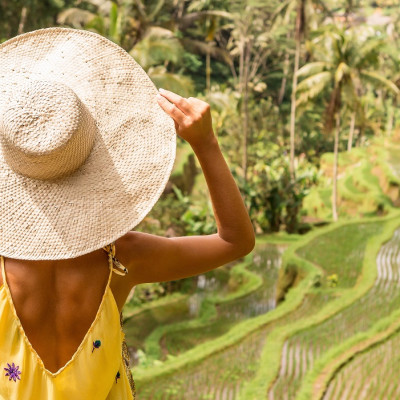
Expert tips on safety in Indonesia
Is Indonesia safe? Rest assured. Indonesia is one of the most popular travel destinations in Asia. Like most other Southeast Asian countries, Indonesia, and especially Bali, is a very safe destination. Relying on your common sense and following a few safety rules will go a long way in ensuring that your vacation is stress-free.

Take care of your valuables
As in all other destinations, it is best leave your valuables in the safe of your hotel. If you are carrying expensive items, take care not to display them in public.
Stay away from Animals
Beware of stray dogs in Indonesia as many of these have rabies. The same applies to monkeys as well. In general, it is a good idea to keep away from all animals in Indonesia.
While climbing volcanoes is possible, make sure to check if these are currently active or dormant. On your private Indonesia tour, your local guide and Trip Coordinator will be able to advise you accurately about volcanoes. We will customize your itinerary whenever necessary.
Women travelers
Indonesia is a very safe destination for female travelers however, traveling alone at night is not recommended. Avoid motorcycle taxis after dark. Do keep in mind that Indonesia is a Muslim country and dress conservatively when you are not at the beach.
Be extra careful while navigating traffic in Indonesia – the conditions can be quite chaotic compared to Western countries. Tourists should avoid riding in motorcycles even if you find locals using this mode of transport – these are known to cause accidents.
Please note: Despite careful research, we cannot assume complete liability for the information provided here. Further updated information is available at your local Foreign Office .

Is Indonesia Safe? Our Tips for Your Trip
Keeping you safe is our top priority. Our travel consultants are happy to advise on your security and safety in Indonesia. For all domestic flights, we only use airlines that meet our standards of safety. During your trip, your local guide is happy to help you with anything you need. Your Trip Coordinator is also available around the clock while you travel.
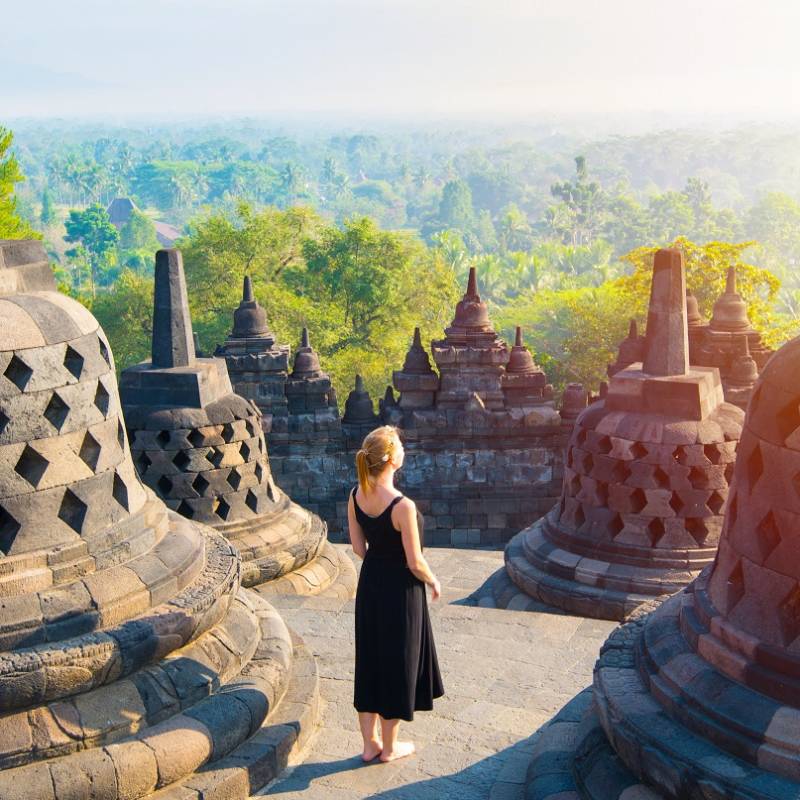
Popular Trips to Indonesia

Indonesia: Classic Sumatra
Discover the essence of Sumatra as you explore its history, culture and food. Marvel at landmarks such as the Tjong A Fie Mansion, Maimoon Palace and the Grand Mosque at Medan before heading into the Bukit Lawang region. Savor the local cuisine on a guided tour and keep an eye out for wild orangutans in…

Java, Indonesian Borneo & Bali Islands: Culture, Wildlife & Nature
Embark on an enthralling journey through Java, Indonesian Borneo, and Bali, where culture, wildlife, and nature unite harmoniously. Discover Yogyakarta’s historic temples, Borobudur and Prambanan, and experience the vibrant nightlife with a personalized tour. Venture to Tanjung Puting National Park to spot wild orangutans on a traditional riverboat. Witness the dramatic landscapes of Mount Bromo,…

Indonesia: Highlights of Bali & Flores
Unwind and relax at some of the most stunning beaches at Bali and Flores in Indonesia on this 13-day tour. Ubud, the cultural heart of Bali, beckons with its temples and museums. At the charming mountain settlement of Munduk, discover cascading waterfalls, lush forests and verdant paddy fields. Experience the thrill of spotting a komodo…
Best Places To Visit
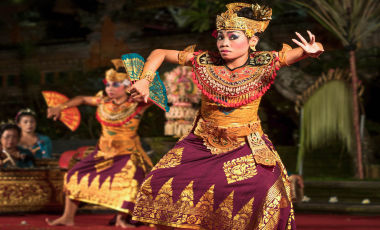
Ubud is the cultural heart of Bali. Home to the country’s royal family, the town is rich in art and at the center of Balinese craft and traditional dance.
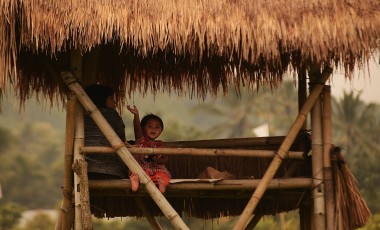
Munduk in Bali is undoubtedly one of the most charming mountain villages of Indonesia. With its lush hills that are dotted with jungles, paddy fields, fruit trees and other island plants, it is the ideal location to unwind within the harmony of nature.
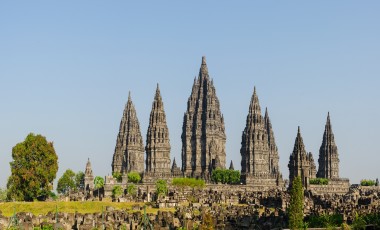
Yogyakarta in Java is a unique place for the appreciation of contrasts. Yogyakarta is best known for its two historic temples: Borobudur Temple, a 9th century Buddhist monument and UNESCO World Heritage site, and Prambanan Temple, dedicated to the divine Hindu Trimurti (trinity).
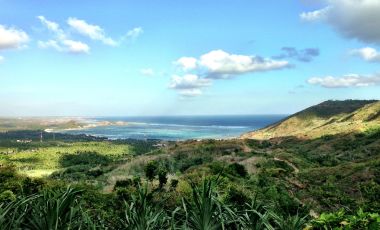
Despite being the same size as Bali, Lombok has managed to retain its privacy. If you seek authenticity, then venture to its black and white sandy beaches, lush forests, and fascinating trails through tobacco and paddy fields.
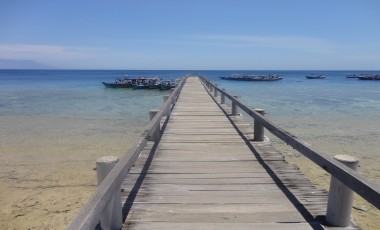
Pemuteran in Bali is the ultimate beach oasis! This hidden jewel is located on the northwestern tip of Bali and is only known to visitors who have been vacationing in Indonesia for years and prefer a quieter beach.
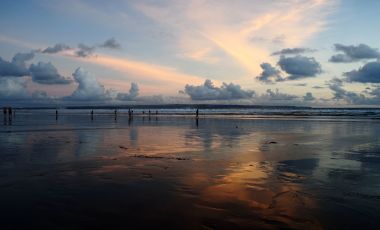
Seminyak is the hedonist hotspot of Bali! Located north of the airport, Seminyak boasts a marvellous beach along a stretch of coastline that has made Bali world-famous.
Best Time To Visit
The climate of Indonesia is unlike other Asian countries. Here is an overview from our destination experts about when to go to this country of 1000 islands.
Things To Do
Fiery volcanoes, magnificent temples and beautiful beaches – Indonesia is full of treasures. Follow this link to discover the top highlights, activities and attractions.
Travel Guide
In a country as diverse as Indonesia, it is important to learn some details before you visit. From language to currency, visa and health information, here are our top travel tips.
From the Blog

Top Indonesia Travel Tips from Enchanting Travels
Discover more about Indonesia from our Travel Consultant, Kathrin Mayr, who shares her top Indonesia travel tips after experiencing the nooks and crannies of the wonderful island nation! Indonesia – the name alone conjures up images of an exotic paradise with powdery white beaches, smoldering volcanoes, mystical cultures and above all, adventure!

Top 10 Best Ever Luxury Pools on Your Bali Holidays
We’ve made a list of our top 10 luxury swimming pools that’ll bring your dream Bali holidays to life. Come on over, and plunge right in!
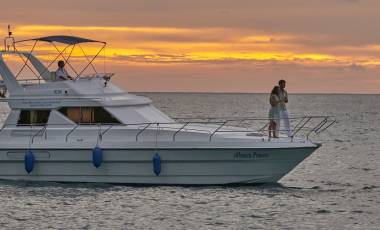
Top 10 Cruises in Asia that will make Your Vacation one to Remember
There is something truly unique about a luxury cruise down Asia’s magnificent and iconic rivers. Discover our top 10 favorites for your cruise of a lifetime!
What Our Guests Say

The Enchanting Difference
Authentic & unique.
Our award-winning, licensed local guides provide incredible insights and exclusive experiences for you.
Personalized & Private
Our experts completely customize your private tour to match your interests and preferences.
High-Quality Experiences
All our accommodations and services are personally tested by our team.
Fully Supported Travel
You’ll have a personal and dedicated trip coordinator, backed by 24/7 support in case of emergencies while you’re traveling.
Financial Protection & Flexibility
Your booking is flexible and completely secure with us.
Safe & Secure
Your safety and well-being are our top priorities.
Do you have a vacation in mind? Personalize your itinerary with our Trip Builder.
Cookies on GOV.UK
We use some essential cookies to make this website work.
We’d like to set additional cookies to understand how you use GOV.UK, remember your settings and improve government services.
We also use cookies set by other sites to help us deliver content from their services.
You have accepted additional cookies. You can change your cookie settings at any time.
You have rejected additional cookies. You can change your cookie settings at any time.
Register to vote Register by 18 June to vote in the General Election on 4 July.
- Passports, travel and living abroad
- Travel abroad
- Foreign travel advice
Regional risks
This section has safety advice for regions of Indonesia. It only covers regions where FCDO has specific advice.
You should also read FCDO’s overall travel advice and safety and security advice .
Mount Ibu, North Maluku
FCDO advises against all travel to within 7km of the crater of Mount Ibu in North Maluku. This is an exclusion zone put into place by the local authorities. Mount Marapi erupted on 13 May.
Mount Ruang, Northern Sulawesi
FCDO advises against all travel to within 7km of the crater of Mount Ruang in Northern Sulawesi. This is an exclusion zone put into place by the local authorities. Mount Ruang erupted on 16 April 2024.
Mount Marapi, Western Sumatra
FCDO advises against all travel to within 3km of the crater of Mount Marapi in West Sumatra. This is an exclusion zone put into place by the local authorities. Mount Marapi erupted in December 2023.
Mount Agung, Bali
In 2018, Mount Agung in East Bali erupted, emitting gas and ash which resulted in the closure of Bali’s airport and a number of nearby regional airports for a period of time. Climbers are recommended to limit activity around the crater. The alert level is subject to change at short notice.
Travellers to Bali may find information on travel during the volcanic activity useful.
Further disruption cannot be ruled out. The local authorities have indicated that Mount Agung continues to show signs of volcanic activity and the possibility of volcanic eruptions remains.
Mount Semeru, East Java
FCDO advises against all travel to:
- within 5 km of the crater of Mount Semeru in Lumajang Regency, East Java
- the southeast area of Mount Semeru along the Besuk Kobokan river, approximately 13km from the crater, and 500m from any Besuk Kobokan riverbank
These are exclusion zones put into place by the local authorities.
Mount Semeru erupted in 2022, emitting a 1,500 meters (4,921 ft) high ash cloud. Indonesian authorities have set an alert status of level 4 (of 4) and are warning of the potential for pyroclastic flows and lava flows along rivers, tributaries and valleys around Mount Semeru, especially along Besuk Kobokan, Besuk Bang, Besuk Kembar and Besuk Sat.
Mount Sinabung, North Sumatra
- within 5km of the crater of Mount Sinabung in Karo Regency, North Sumatra
This is an exclusion zone put into place by the local authorities. Mount Sinabung erupted in 2021, sending a large column of smoke and ash into the sky.
Aceh has emerged from a long period of internal conflict. Although violence against foreigners is rare, a British national was abducted in 2013 and there were 3 separate incidents in 2009 targeting foreigners. There have been reports of Sharia (religious) police harassing foreigners.
Be alert to the risk of politically motivated violence. Take particular care in remote areas. Keep up to date with local developments and avoid large crowds, especially political rallies.
Sharia law is in force in Aceh. See safety and security .
Central Sulawesi Province
The political situation in Central Sulawesi Province is unsettled. Take particular care in Palu, Poso and Tentena. Be alert to the risk of politically motivated violence.
There is conflict between the Indonesian security forces and terrorists, including attacks upon police and civilians in 2021. This conflict is predominantly in the Sigi, Parigi Moutong and Poso regions.
Maluku Province
Maluku Province has experienced unrest and violence between different religious and tribal groups. Take particular care in Ambon, including Haruku Island (Pulau Haruku).
Armed Papuan separatist groups are fighting for independence from Indonesia in the region of Papua. Violence has been steadily increasing since 2018. The Indonesian government has a heavy security presence throughout the region especially in Highland Papua, Central Papua provinces and along the border with Papua New Guinea. There are regular armed clashes between Papuan separatist groups (known as the TPNPB-OPM) and government security forces, mainly in the regions of Highland Papua and Central Papua.
Clashes have resulted in civilian deaths, including foreign nationals. In 2020, a New Zealand national was shot dead and a number of Indonesian nationals were wounded in a mining facility in Highland Papua province.
In February 2023:
- a New Zealand national was kidnapped by a separatist group in Nduga, Highland Papua Province
- the TPNPB-OPM issued a statement that foreigners in the Papua region would be targeted
There have been several instances of Papuan separatists attacking commercial aircraft servicing remote communities via small local airfields, especially in Highland Papua and Central Papua provinces. This includes aircraft which are regularly used by foreign nationals and those working in the region as the only viable means of transportation.
Political tensions have also led to violent demonstrations in cities across Papua, which have turned violent at short notice. Take local advice to help you avoid possible demonstrations and political rallies. Internet communications might be switched off in areas where demonstrations are planned. Make plans in advance in case you are affected.
If you’re planning to travel in the Highland Papua and Central Papua provinces be aware that the security situation is unpredictable and can change quickly, Take local advice to understand the current tensions, and how you can reduce your personal risks.
In 2022, the Indonesian government passed new legislation to reform the governance and administration of the Papua region. The existing provinces of Papua and West Papua have been reorganised into 6 provinces, which are now known as:
- Central Papua
- Highland Papua
- South Papua
- Southwest Papua
If you have travelled to the area previously make sure you check the updated map.
The UK Government has no permanent presence in the region. Consular services are delivered remotely from Jakarta. There are limited hospital facilities in the region. If you need emergency medical treatment, you are likely to be medically evacuated to Darwin in Australia.
Related content
Is this page useful.
- Yes this page is useful
- No this page is not useful
Help us improve GOV.UK
Don’t include personal or financial information like your National Insurance number or credit card details.
To help us improve GOV.UK, we’d like to know more about your visit today. Please fill in this survey (opens in a new tab) .
Is It Safe in Bali?
:max_bytes(150000):strip_icc():format(webp)/mike_borobudur-5b6d3ea446e0fb0025fcb683.jpg)
Bali—the Southeast Asian yoga oasis of "Eat, Pray, Love" fame—attracts more than 6 million international visitors per year. It's a haven for young, solo travelers on gap years and life-affirming sabbaticals, which proves how generally safe the Indonesian island is. That isn't to say, however, that Bali is entirely incident-free. Like any tourist-centric destination, it's also a magnet for pickpocketing and thievery. What's more, Balinese roads are notoriously dangerous in that they're chaotic and often times not well maintained. Being located in the Ring of Fire (an earthquake-prone fault line in the basin of the Pacific Ocean), the island is especially vulnerable to tsunamis as well.
Travel Advisories
The U.S. Department of State has issued travel warnings for Indonesia due to terrorism and natural disasters . "Terrorists may attack with little or no warning, targeting police stations, places of worship, hotels, bars, nightclubs, markets/shopping malls, and restaurants," the warning states. "Natural disasters such as earthquakes, tsunamis or volcano eruptions may result in disruptions to transportation, infrastructure, sanitation, and the availability of health services."
Is Bali Dangerous?
Although Bali is safe enough to visit for a short trip, earthquakes and tsunamis are a major concern. In 2018, Indonesia as a whole suffered from 2,000 natural disasters, claiming nearly 4,000 lives, displacing 3 million people, and leaving much of the country in a state of devastation. Because tourism accounts for more than a quarter of Bali's gross domestic product, your vacation may help boost the economy, but be aware of the risk of natural disasters and the damage they've already caused.
Additional risks to travelers include targeted crime like robberies and pickpocketing. Terrorism is a problem throughout the country, but the U.S. Department of State does not cite Bali as an epicenter of it. The roads are notably dangerous in that a quarter of Bali's reported crashes prove deadly, and to make matters worse, renting scooters has become a popular tourist activity with not much training or precaution involved. Foreigners are injured in traffic accidents in Bali (whether as pedestrians, passengers, or drivers themselves) all the time.
Is Bali Safe for Solo Travelers?
Bali is not only safe for solo travelers, it's somewhat of a mecca for lone vagabonds. With so many young backpackers holidaying on the island, there's a sort of safety in numbers. Whereas some other Southeast Asian countries—notably Thailand and Vietnam—have earned unfavorable reputations for their rambunctious backpacker party cultures, Bali (being a Hindu island) revolves less around drugs and alcohol, which helps keep the crime at bay. Remember to keep your possessions close to your person when you're out and lock up your belongings at the hotel or hostel to avoid theft, which can just as easily be perpetrated by fellow travelers.
Is Bali Safe for Female Travelers?
The "Eat, Pray, Love" narrative has boosted female travel (female solo travel, in particular) immensely, making Bali one of the top destinations for itinerant women. In general, Balinese people are perfectly friendly, hospitable, and apt to look after visitors, but sexual harassment is also prevalent. One group of men, dubbed the "Kuta cowboys" after Kuta Beach, is notorious for preying on women. They often hold tourist-facing beach jobs, but what they're actually attempting to sell is sex.
Safety Tips for LGBTQ+ Travelers
A high-profile UK rape case involving Indonesian exchange student Reynhard Sinaga, who was convicted in 2020 of drugging and raping more than 100 men in Manchester, sparked a series of LGBTQ+ raids throughout the country . The incident provoked homophobic attacks against the LGBTQ+ community, but it was particularly centered in Sinaga's home city of Jambi. Bali remains a major destination for LGBTQ+ travelers , thanks to its love-touting Hindu heritage and its diverse demographic, both different from the rest of the country. If you're worried about your safety as a queer traveler or couple, stick to the tourist-friendly areas of Bali where it's more widely accepted. Bali's gay organization, promoting sexual health in the LGBTQ+ community, is Gaya Dewata .
Safety Tips for BIPOC Travelers
Indonesia is not immune to racism, but it's mostly directed at Papuans, who have had a tense relationship with Indonesians since the takeover of West Papua in the 1960s. Otherwise, people of color are generally safe in the country, especially in the cultural melting pot that is Bali. If you fall victim to an act of discrimination during your visit, you should report it to the tourist police, who are stationed at Jl. Kartika Plaza No.170 in Kuta.
Safety Tips for Travelers
Bali is a safe place to visit, but be sure not to abandon your common sense. Travel in groups and take the necessary precautions to avoid danger.
- Macaque monkeys are commonplace around Bali, but don't be fooled by their cute appearance as they will not scruple from stealing shiny objects and food from unsuspecting tourists. Many a tourist have lost glasses, jewelry, and other belongings to these shifty beasts. Most close encounters with macaques happen around Pura Luhur Uluwatu and the Ubud Monkey Forest in Central Bali. You would also be wise not to smile at them as they interpret bared teeth as a sign of aggression.
- The beaches on the southwest part of Bali are known to have dangerous rip tides and undertows. Dangerous beaches are marked by red flags. Do not attempt to swim at red-flagged beaches.
- Ask your hotel about tsunami evacuation procedures; otherwise, find accommodations at least 150 feet above sea level and two miles inland.
- Despite the draconian anti-drug laws, tourists often get stealthy drug offers while walking on the streets, with disguised drug dealers slyly whispering offers of cheap marijuana or mushrooms to likely-looking travelers. If this happens to you, walk away. You're likely to find yourself entrapped in a drug sting.
- Apply high-SPF sunscreen to forestall the agony of UV-burned skin; SPF (sun protection factor) of no lower than 40 ought to be adequate for a Bali vacation.
- There are no traffic rules in Bali, only suggestions. Thus, crosswalks (when you can find them) don't get much respect, nor do the pedestrians treading on them.
U.S. Department of State . "Indonesia Travel Advisory."
Reuters . "Indonesia rights body condemns LGBT raids ordered by mayor after UK rape case." January 14, 2020.
Is It Safe in Colombia?
Is It Safe in Germany?
Is It Safe in Barbados?
Is It Safe in Thailand?
Is It Safe in Mexico?
Is It Safe in Guatemala?
Is It Safe in Puerto Rico?
Is It Safe in Jamaica?
Is It Safe in Iceland?
Is It Safe in Trujillo, Peru?
Is It Safe in Central America?
Is It Safe in Ireland?
Is It Safe in Finland?
Is It Safe in India?
Is Bangkok Safe?
Is It Safe in Kenya?
InDOnesia CARE: Cleanliness, Health, Safety, and Environmental Sustainability Protocols in Indonesian Tourism Destinations
Currently, most parts of Indonesia are entering the transition phase, an adaptation period towards the new normal. A new phase where several activities resume with less boundaries. Moments of slowly restarting the economy with the ease of restrictions in some public areas.
The Ministry of Tourism and Creative Economy introduced InDOnesia CARE, a symbol of support for Indonesia’s strong effort in implementing the cleanliness, health, safety, and environmental sustainability protocols across the tourism industry as mandatory precautions. All to assure travelers that InDOnesia CARE for your safety, health, hygiene and comfort.
About InDOnesia CARE
InDOnesia CARE is an initiative for Indonesia’s tourism establishment which implements cleanliness, health, safety, and environmental sustainability as first and foremost priority. InDOnesia CARE embodies the collective enthusiasm of Indonesian people that committed to care for others wellbeing wholeheartedly while also implementing contactless practice for mutual safety with high discipline.
InDOnesia CARE Logo Philosophy
InDOnesia CARE symbol highlighted “I DO CARE” to emphasize that Indonesia highly regards the cleanliness, health, safety, and environmental sustainability of its visitors.
InDOnesia CARE For Your Comfort
Several customized InDOnesia CARE protocols were prepared to be implemented well across the tourism and creative economy elements as an effort to elevate travelers comfort amidst the new normal transition period. Cleanliness, health, safety, and environmental sustainability are InDOnesia CARE main priorities with the hope of gaining support from visitors as they grow into wiser travelers.
New Updates on InDOnesia CARE
Find the latest information on InDOnesia CARE in customized booklets, informative articles and tutorial videos highlighting diverse sectors in tourism and creative economy. All information available on the InDOnesia CARE page will be regularly updated to guide you on your future travel planning during this new normal transition period. InDOnesia CARE for your comfortable visit.
Image Source : Biro Komunikasi Kemenparekraf
Suggested for you

We are Ensuring You Have a Safe Trip
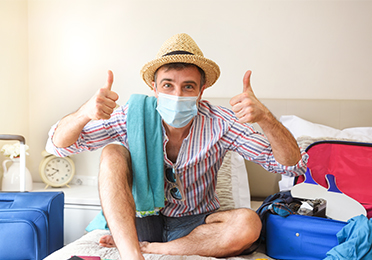
Getting Ready to Travel Again

6 Guides on Being A Responsible Traveler

Minister of Tourism and Creative Economy Encourages Tourism Stakeholders to Implement Strict Health Protocol to Welcome the “New Normal”

Visit our other website
This is the official website of the Ministry of Tourism, Republic of Indonesia. The contents listed on this website are intended for informational purposes rather than commercial. Any displayed sale is meant as a token of partnership and will always redirect you to our partners' sites.
Safety in Indonesia - 10 Tips For a Secure and Memorable Vacation
How safe is indonesia.

Safety Tips in Indonesia 1. Never go out alone at night even for a casual stroll. 2. Do not get swayed away by an unregistered guide. 3. Never accept any item from a stranger. 4. Being a predominantly Muslim country, Indonesia is quite conservative. Make sure you dress appropriately. 5. Never leave any personal belongings unattended in a public area. 6. Do not smoke in public places. Indonesia has strict anti-smoking laws. 7. Regularly follow local news even during your vacation. 8. While shopping make sure you bargain. Do not allow shopkeepers to exploit you. 9. Stay connected with your family members during your trip and keep them updated about your whereabouts so that in case of any emergency you can be located easily. 10. Do not carry any non-essential travel items during your trip like expensive ornaments or important documents other than IDs.

Emergency numbers Police/General Emergencies: 110 or 112 Ambulance and Medical Emergencies: 118 or 119 Fire fighter: 113Search and Rescue: 115 Natural Disaster Assistance: 129 International Call Operators: 101 and 107 Bureau of Public Communication of the Ministry of Tourism: +62 21 3838899
1. Transport

Trust only reliable agencies for transport - Hire a cab or vehicle from a credible travel agency, instead of hailing the ones on the streets. There is always a chance of exploitation of tourists by the cab drivers.
Avoid taxi-scams - There have been numerous taxi-scams, where the drivers reportedly force tourists to collect money from ATMs and give it to them. Tourists have also complained of situations where the drivers allegedly drive off before they can even get their luggage out.
- Take care of your luggage - Even if you are forced to take a random cab, make sure you know the rates properly and remember to take care of your luggage. The drivers' attitude and behaviour will probably be different from what you are used to, so adjust accordingly, because your life is in their hands the moment you sit in their taxi.
Risk Meter: Medium

Avoid tap water - It’s best to consume packaged drinking water in Indonesia. Locals do not drink tap water directly, so the government doesn’t work towards ensuring a certain quality standard in case of tap water. But tap water can be used for other activities such as showering. If necessary, you can always drink tap water after boiling it.
Do not eat cheap roadside food - Indonesian roadside foods are sold at low prices. If you’re having a meal from a ‘Warung’ or a family-run restaurant and the meal is extremely cheap, that’s fine. But if a random eatery sells you an entire meal platter for low prices, you should have second thoughts before consuming it.
Avoid peeled fruits - Street vendors in Indonesia mostly sell fruits that are ready to eat instantly. So they peel out the fruits hours ago and sell them, which might not always be healthy from a hygiene point of view. So it’s best you avoid it.
Avoid spicy sambal - Sambal is a spicy Indonesian sauce. It is offered with almost every Indonesian cuisine. However, you should avoid it if it is incredibly spicy as it might lead to stomach irritation or other health problems.
Do not consume suspicious raw meat - While beef is a popular meat item in Indonesian cities, some vendors might sell some other meat in the name of it. There have been reports of stalls selling illegal dog meat, therefore it is advisable that you eat from a familiar stall, to avoid health problems.
3. Natural Disasters
Risk Meter: High
Risk meter: Pick pocketing- High Mugging- Medium
5. Terrorism

Risk Meter: Medium
6. Women, Children and LGBTQ

Even though Indonesia is not the safest place for female solo travellers, but if cautious, one can avoid unwanted attention and risks of sexual assaults.
Solo female travellers can also follow these tips to ensure safety in Indonesia-
- Avoid places filled with bars and nightclubs in dingy alleys- Remember never to leave your drink unattended because it might lead to spiking, which is a prevalent practice in Indonesian Bars.
- Choose a hotel in the right area, which is full of tourists.
- Never accept offers from unregistered tour guides, if you are alone.
2. Children
3. lgbtq.
Risk Meter: Medium
7. Scams

- Drink spiking- Be careful when you’re in a bar and never accept drinks from strangers. People tend to mix drugs and other illegal items in alcohol and then forcefully engage in unlawful activities.
- Unlicensed tour guide- They exploit tourists by charging higher fees. Make sure you hire a guide from a well-known certified company.
- Money changing exploitation- Money changers exploit tourists by charging higher than the exchange rate. Be cautious while exchanging money. Also, avoid the money changers located in dark and dingy alleys.
- Forced ATM withdrawal by unknown locals -Sometimes you might encounter strange people who might threaten you to withdraw money. Make sure you have self-defence mechanisms if travelling solo.
Risk Meter: High
8. Civil Unrest

9. Diseases

Risk Meter : Medium
10. Accommodation

Important Laws

Places to Avoid
Additional tips while planning an indonesian trip .

This post was published by Asmita Sarkar
Share this post on social media Facebook Twitter
Indonesia Travel Packages
Compare quotes from upto 3 travel agents for free
Bali Best Tour Packages with Kuta & Seminyak - Bali Swing
Bali honeymoon package for 7 days - gili trawangan.
Bali Indonesia Tour Package with Scuba Diving
Couples Paradise Bali Gili Honeymoon Package
Singapore bali tour package - 6 nights, bali honeymoon package with stay at private pool villa suite & aromatherapy spa, related articles.

Travel Tips
62 Common Indonesian Phrases Every Traveller Should Know
Indonesia Travel Tips For a Smoother Holiday in the Archipelago!
Visa Policy For Indonesia: Everything You Need to Know About Applying
Travel Advice to Indonesia - 19 Tips to Create Your Experience of a Lifetime
Safety in Indonesia: Tips for a Safe and Enjoyable Trip
The Daunting Problem Associated With Smoking in Indonesia

Art & Culture
Languages of Indonesia - The Complete Guide
The 4 Major Styles of Architecture in Indonesia

Fairs & Festivals
18 Festivals of Indonesia to Witness the Colour and Tradition of the Nation
Dances of Indonesia- Get Enthralled by the Mesmerising Indonesian Dances
Culture of Indonesia – Explore the Vibrant Traditions, Cuisine and More!

List of 12 Airports in Indonesia

Currency of Indonesia - Indonesian Rupiah Exchange Rates & More

Experiences
5 Golf Courses in Bali for the Perfect Golfing Experience

Food & Drink
Coffee in Indonesia - Best Coffee and Cafes in Indonesia to Try
Music of Indonesia - 6 Beautiful Forms of Traditional Music in Indonesia
Religion in Indonesia - All About Indonesia's 5 Religions and It's Views on Atheism

7 Amazing Malls in Surabaya That Will Make Every Shopaholic Happy

Historical & Heritage
History of Indonesia - A Concise Guide to the Regional Facts and Significance!
25 Best Dishes of Street Food in Indonesia You Cant Pass On
Shopping in Indonesia - 11 Zones For All Your Indonesian Shopping Needs

Diving in Indonesia: 9 Best Sites to Explore the Heart of the Coral Triangle
28 Facts About Indonesia That Will Make You Want To Visit Right Away
9 Landscapes in Indonesia To Leave You In Awe!
Food of Indonesia - 25 Dishes That Represent Indonesia on A Plate

Wildlife & Nature
8 Unique Animals Native to the Wildlife in Indonesia

Nightlife in Indonesia - 8 Places To Seal the Perfect Indonesian Night!
5 Incredible Places For Skydiving in Indonesia
Renting a Car in Indonesia - Operators to Help You Explore The Country At Your Own Pace
Casinos in Indonesia - Your Guide to Gambling Laws in Indonesia
Comments on this post
Browse package collections, indonesia package collections.
Indonesia Honeymoon Packages
Top Listed Packages
Wonderful Adventure Bali Package Deal - 6 Nights 7 Days
Budget Bali Indonesia Tour Package from India
Stunning All Inclusive Bali Package - 5 Nights
Top Places in Indonesia

Get the best offers on Travel Packages
Compare package quotes from top travel agents
Compare upto 3 quotes for free
- India (+91)
*Final prices will be shared by our partner agents based on your requirements.
Log in to your account
Welcome to holidify.
Forget Password?
Share this page
Things to know before visiting the Gili Islands
Apr 21, 2024 • 6 min read
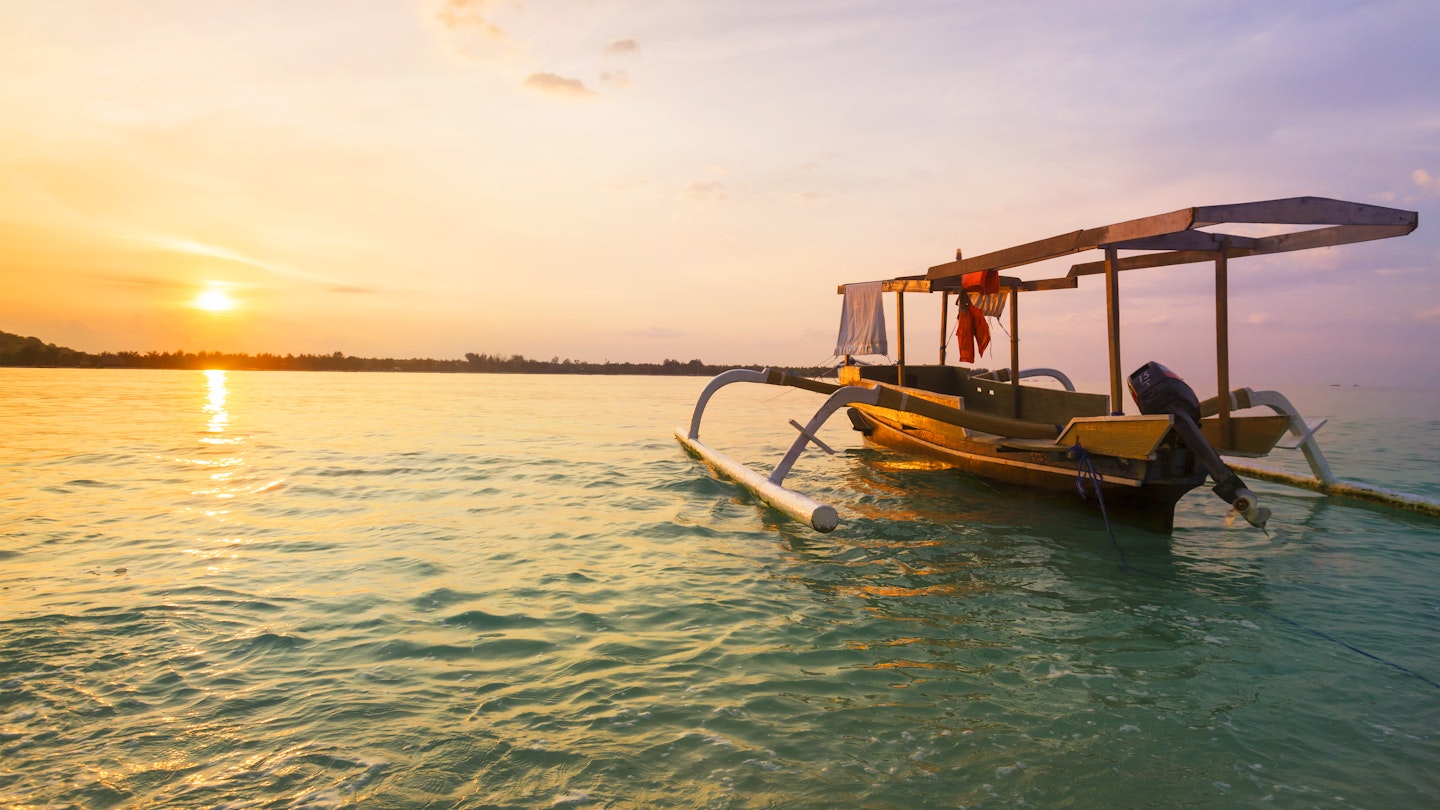
Whichever island you're on, head to the west coast for the best sunset views © Marcos Welsh / Getty Images
As far as tiny, picturesque islands go, the Gili Islands have it all and then some. Glassy waters full of colorful marine life, local tradition and culture, a rowdy nightlife scene, and also plenty of places to completely relax under the sun – it's the real deal.
These three islands – Gili Trawangan , Meno and Air – are generally safe and fairly easy to navigate. As a first-time visitor though, you'll want a quick travel guide on a few specifics regarding trip planning, respectful etiquette, and safety before you arrive.
Take note of these 11 tips for a smooth journey around the Gili Islands.
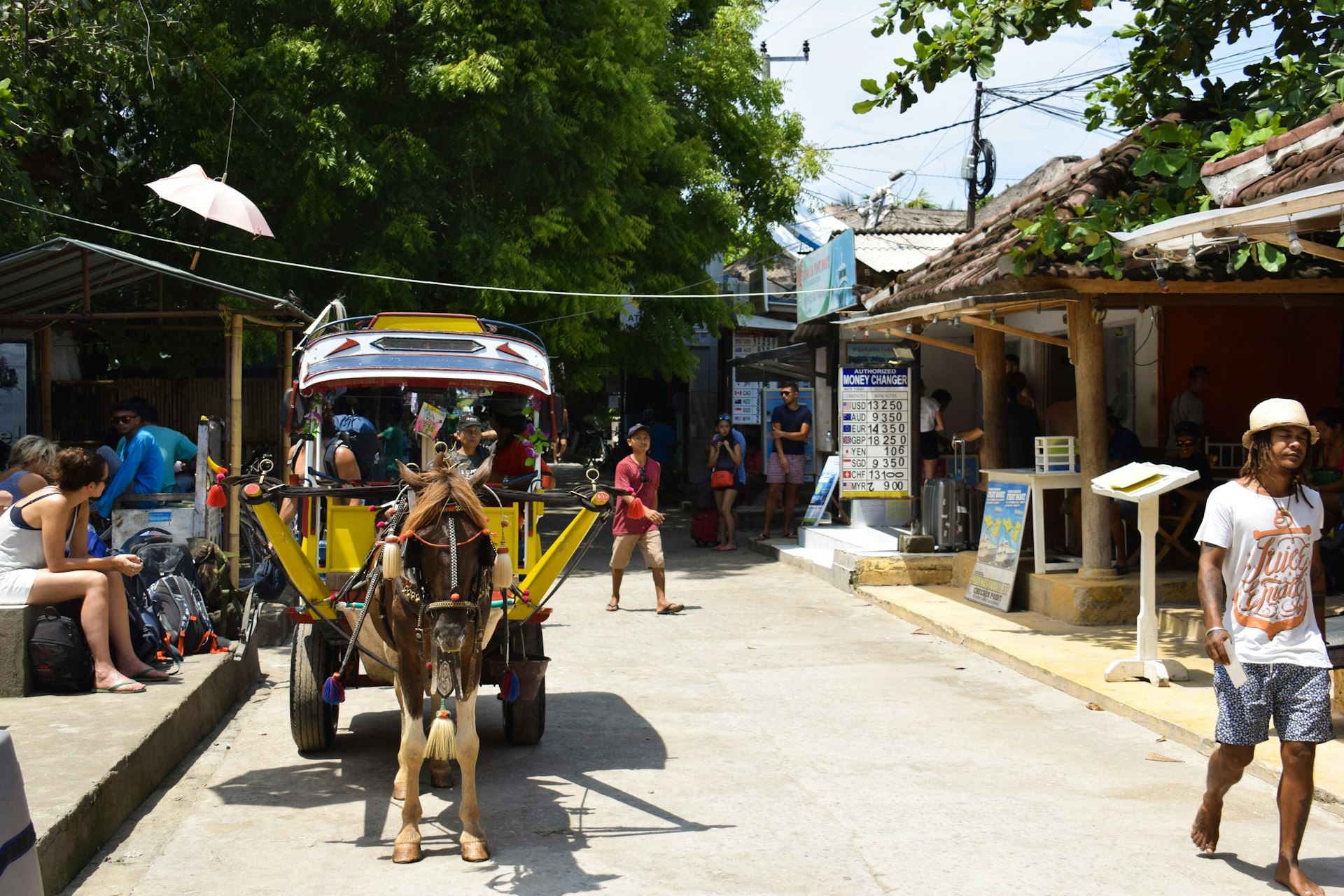
1. Pack light, or at least skip the giant suitcase
We've been there and witnessed it: giant suitcases piled into the back of the Gili boats, later being lugged around on dusty laneways by sweaty, regretful travelers under the hot sun. Trust us on this one: packing light is the way to go for the Gili Islands. Either leave your suitcase at accommodations in Bali or use a service such as Bali Store Luggage to take care of it while you're island hopping. Between the logistics of getting on and off the Gili boats, plus the fact that the Gili Islands don't have any motorized vehicles – you're much better off bringing only what's comfortable to carry on your back.
2. Decide how to split your time between the three islands (or just wing it)
Whether you enjoy a quick weekend getaway or slowly move through all three islands over the course of a week, deciding how to split your time in advance is advantageous. Each island brings a different personality, with Gili Trawangan being notorious for parties and nightlife. Gili Meno, in the middle, draws a more laidback crowd – those seeking tranquility (and a decent number of honeymooners). To the east, Gili Air falls somewhere in the middle of the chill scale, where it's easy to bliss out in silence or get social at one of the island's many cheerful beach bars.
Even though the islands are small, you can have a completely different experience depending on where you go and what you do. Plan accordingly.
3. Team up with other travelers to share boats between islands
It's possible to take public boats between all three Gili Islands, but they don't run very frequently – usually just a couple times per day – and plans are subject to change. If you're looking to travel on the fly, or completely on your own schedule, the best way to move between the Gili Islands is to team up with other travelers and share a private boat transfer. Walk down to the port and chat up some of the friendly boatmen waiting for your business, preferably with a friend or two to split the cost. Expect to pay around 300,000Rp for the entire boat for a one-way, depending on your negotiation abilities.
4. Dress and behave respectfully
While you explore the Gili Islands, you might encounter a few signs that say "no swimwear in the village" – or simply a picture of a bikini with a big red no symbol on top of it. Most residents of the Gili Islands are Muslim, and dressing modestly is important for traveling respectfully. There's no issue rocking swim trunks or a bikini when you're actually at the beach – but cover up when you're heading inland, especially when passing through residential areas. Keep a big t-shirt and sarong in your bag, and you'll be good to go.
5. Check the calendar for any holidays
There are two holidays to be aware of, both bring different experiences in the Gili Islands: Ramadan, a Muslim holiday, and Nyepi, a Balinese holiday. Ramadan is usually around March or April where people fast from sunrise to sunset each day for a month. You can still travel to the Gili Islands, but be advised that some businesses will close earlier and parties are limited during this time. During Nyepi, Bali's day of silence which typically falls the first or second week of March, the entire island shuts down – leading many travelers to head to the Gili Islands where businesses remain open. This can make things pretty busy for two or three days over Nyepi.
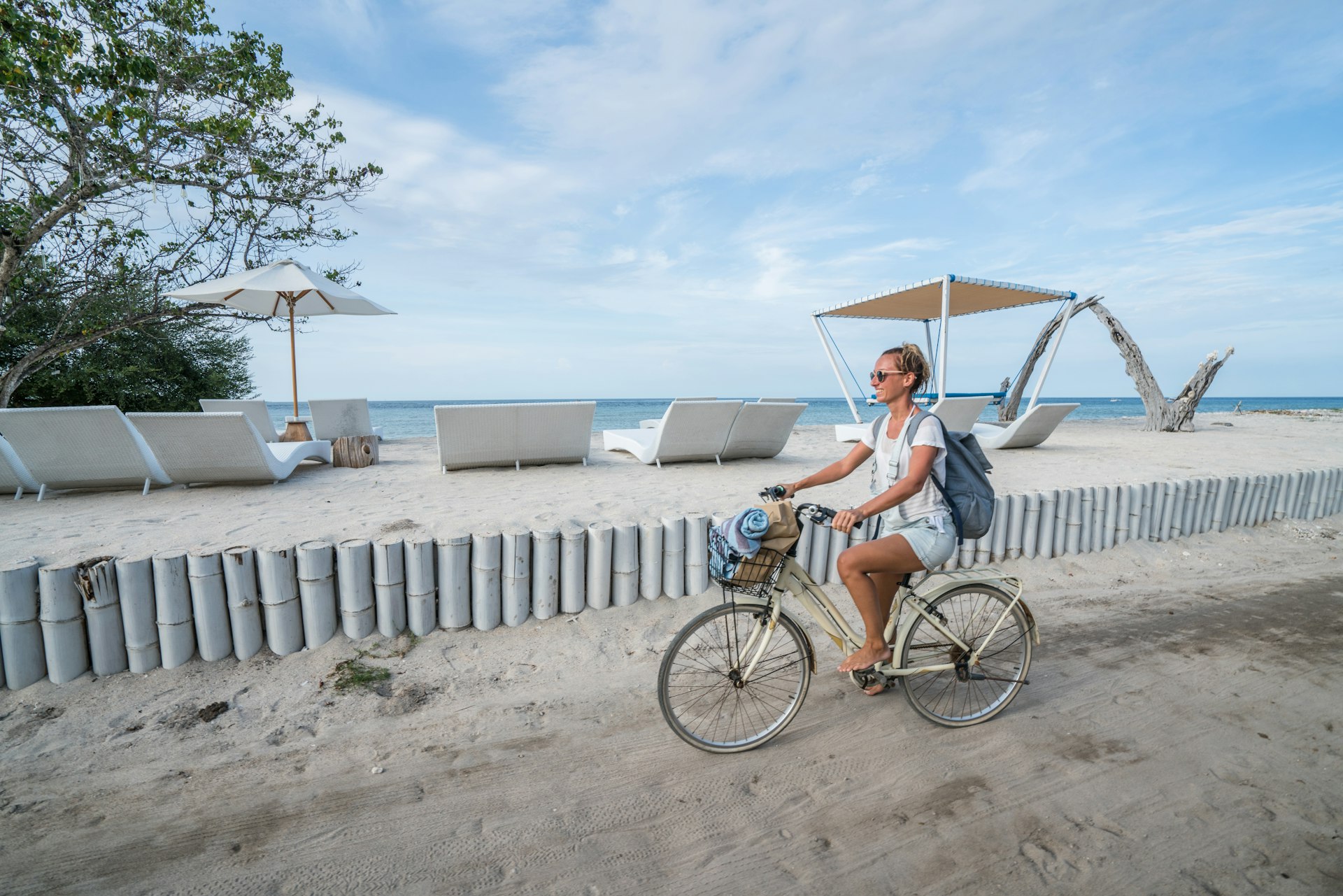
6. Lock up your bicycle when you're not using it
You won't find any motorized vehicles on the Gili Islands, where the best method of transportation is either via foot or bicycle. Petty theft isn't all that common – but locking your bike whenever you're not using it is a best practice just in case. Insurance for bike theft isn't really a thing here, so if someone were to roam off with it, you'd be on the hook for covering the cost. Most folks simply put the lock around their tire rather than fastening it to a stationary object.
7. Always drink purified water
Tap water is not safe for consumption across Indonesia so always only drink water you’ve either purified yourself; you have purchased in a sealed bottle; or have refilled your reusable from a clean water source to stay hydrated. A lot of people brush their teeth with the tap water without experiencing any issues, but if you're really concerned, use bottled water for that too.
8. Watch out for mosquitos
Catching dengue fever is the biggest risk from mosquito bites here – not to mention uncomfortable itchiness. Mosquitos are a year-round experience in the Gili Islands, slightly less so during the dry season from roughly June until October. The best way to prevent bites or mosquito-induced illness is by preparing yourself with bug spray, especially around dusk.
9. Drugs are illegal in Indonesia
You might've heard stories of magic mushrooms in the Gilis from other travelers – and it's true, several beachside cafes openly advertise the sale of magic mushrooms despite the fact that Indonesia has strong anti-drug laws. It's not uncommon to get offers for "magic shakes" or mushrooms while walking on the street, either. Do beware: Indonesia has extremely strict laws against illicit substances, including mushrooms.
Intoxication or possession is punishable by lengthy imprisonment (or worse!). According to Indonesia's tourism board , "Possession is punishable by 4 to 12 years of imprisonment. There is also IDR 800 million to 8 billion (US$89,600 to US$896,000) worth of fines."
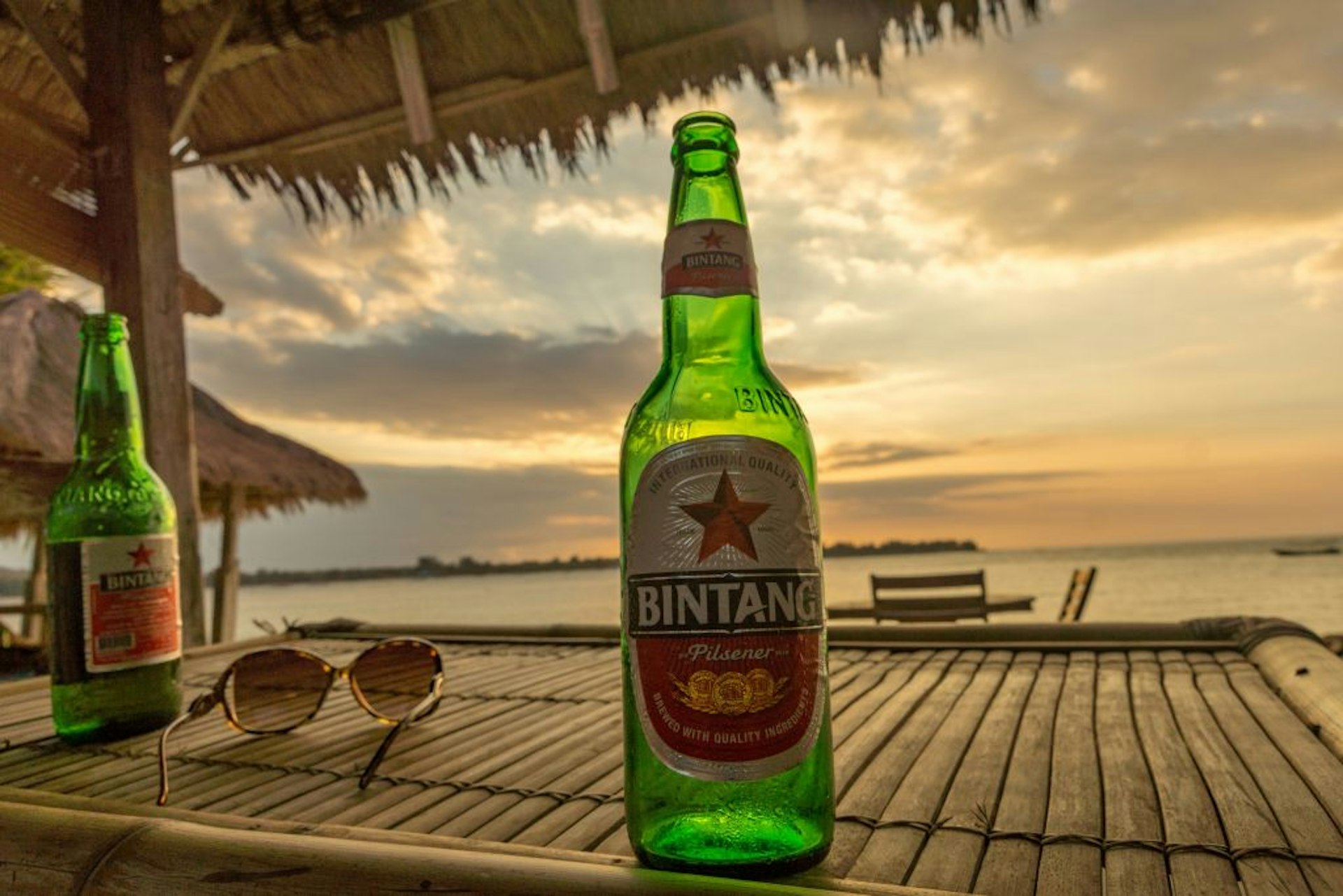
10. Stick to beer and wine if you want to drink
Throughout the years, there have been countless reports of travelers in Indonesia becoming ill due to methanol poisoning from alcoholic spirits. The consumption of this illegal tainted alcohol – which has occurred even in fancy, upscale resorts – can cause severe illness, blindness, or even death. Methanol-tainted alcohol is typically the result of cost cutting, oftentimes far earlier in the supply chain before bars and restaurants have any say in the matter. The safest way to get a buzz is by drinking beer or wine, so load up on the Bintang beers or get champagne tipsy all day long.
11. Head west for sunset
When the fiery sun begins to descend closer to the horizon, make your way west. Regardless of whether you're on Gili Trawangan, Gili Meno, or Gili Air – the best sunset views are on the west coast, accompanied by views of Bali's towering Gunung Agung volcano off in the distance. It's the best way to slip into the evening, typically accompanied by sherbet-colored hues in the sky and good vibes.
Explore related stories
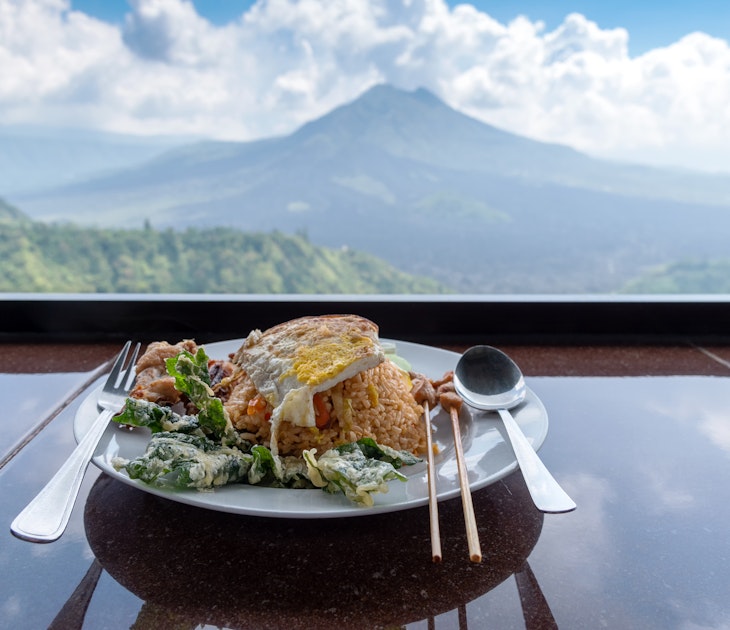
Tips & Advice
Apr 29, 2024 • 6 min read
Explore Indonesia’s diverse culinary landscape across the world's largest island nation, from satay to the globally renowned beef rendang.

Apr 22, 2024 • 6 min read
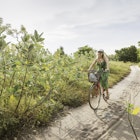
Apr 18, 2024 • 5 min read
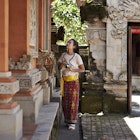
Jan 18, 2024 • 8 min read
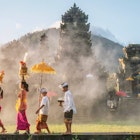
Jan 17, 2024 • 6 min read

Jan 2, 2024 • 8 min read
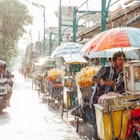
Dec 7, 2023 • 10 min read
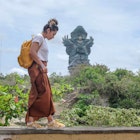
Dec 2, 2023 • 7 min read
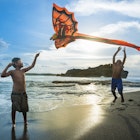
Nov 28, 2023 • 5 min read
You are using an outdated browser. Upgrade your browser today or install Google Chrome Frame to better experience this site.
Global Measles
- Many international destinations are reporting increased numbers of cases of measles.
- Travelers are at risk of measles if they have not been fully vaccinated at least two weeks prior to departure or have not had measles in the past and travel internationally.
- The majority of measles cases imported into the United States occur in unvaccinated U.S. residents who become infected during international travel.
- All international travelers should be fully vaccinated against measles with the measles-mumps-rubella (MMR) vaccine, including an early dose for infants 6–11 months, according to CDC’s measles vaccination recommendations for international travel .
- Travelers should seek medical care if they develop a rash, high fever, cough, runny nose, or red, watery eyes. Measles is highly contagious. Travelers with suspected measles should notify the healthcare facility before visiting so staff can implement precautions to prevent spread within the facility.
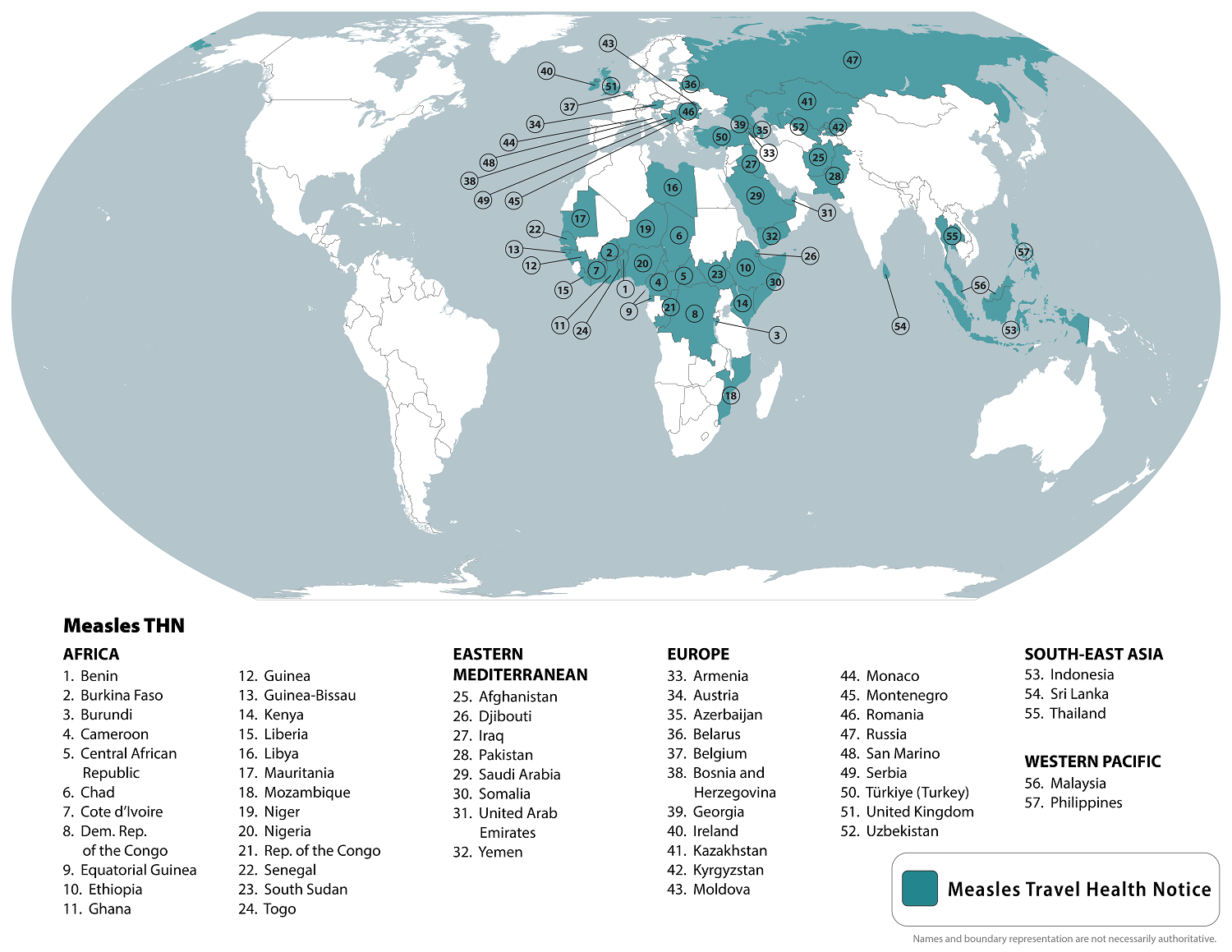
Measles is a highly contagious virus that lives in the nose and throat mucus of an infected person. It can spread to others through coughing and sneezing .
The measles virus can live for up to two hours in an airspace or on a surface after an infected person leaves an area. If other people breathe the contaminated air or touch the infected surface, then touch their eyes, noses, or mouths, they can become infected. People can spread measles up to four days before and four days after a rash.
Signs and symptoms of measles include maculopapular rash, high fever, and a cough, runny nose, or red, watery eyes.
Measles can be severe in all age groups and can lead to serious complications, such as pneumonia (infection of the lungs) and death. Several groups are more likely to suffer from measles complications, including children younger than five years of age, adults older than 20 years of age, pregnant women, and people with compromised immune systems, such as from leukemia or HIV infection. Common complications are ear infections and diarrhea. Serious complications include pneumonia and encephalitis (infection of the brain).
What is the current situation?
Measles is an ongoing risk around the world. Health officials in the countries listed below have reported large measles outbreaks.
- Afghanistan
- Burkina Faso
- Central African Republic
- Cote d’Ivoire
- Democratic Republic of the Congo
- Equatorial Guinea
- Philippines
- Republic of the Congo
- Saudi Arabia
- South Sudan
- United Arab Emirates
Measles spreads rapidly and may become a risk to travelers in places not included on the list above. CDC recommends all travelers are fully vaccinated against measles when traveling to any international destination.
What can travelers do to protect themselves and others from measles?
Travelers are at risk of measles if they have not been fully vaccinated two weeks prior to departure and travel internationally.
Vaccination with a measles-containing vaccine is the best way to make sure that you are protected. Infants 6 through 11 months of age should receive one dose of MMR vaccine. Infants who had one dose of MMR vaccine before their first birthday should follow the recommended schedule and get another dose at 12–15 months and a final dose at 4–6 years. Children 12 months of age and older, teenagers, and adults who do not have presumptive evidence of immunity against measles should get two doses of MMR vaccine separated by at least 28 days. If the child received a first dose with measles-mumps-rubella-varicella (MMRV), they should wait 3 months before their second dose.
If you are not sure if you or your travel companions are fully protected against measles, schedule an appointment to see your clinician at least 6 weeks before traveling so that you have enough time to get vaccinated.
Some people should not get a measles-containing vaccine or should wait. If you don’t think you can safely receive a measles-containing vaccine, talk to your clinician and consider making alternative travel plans.
What can clinicians do?
A self-report of measles vaccination or self-reported history of measles infection is not adequate evidence of protection. Clinicians should vaccinate anyone 6 months or older traveling overseas who does not have written documentation of vaccination or other evidence of measles immunity . Infants aged 6–11 months should be vaccinated with one dose before travel*. For international travelers 12 months or older, 2 doses at least 28 days apart are recommended.
*Infants who get one dose of MMR vaccine before their first birthday should be revaccinated according to the routine ACIP schedule (one dose at 12 through 15 months of age and a final dose at 4–6 years).
Traveler Information
- CDC Measles Homepage
- Travelers’ Health Measles Website
- Humanitarian Aid Workers
- Measles: Plan for Travel
- Measles, Mumps, Rubella (MMR) Vaccine Information Statement
- Measles, Mumps, Rubella, Varicella (MMRV) Vaccine Information Statement
Clinician Information
- Measles (Rubeola) in the CDC Yellow Book (Health Information for International Travel)
- Advisory Committee on Immunization Practices (ACIP) Recommendations for MMR Vaccine and MMRV Vaccine
- Measles Information for Healthcare Professionals
- Guidance on Measles during the Summer Travel Season
File Formats Help:
- Adobe PDF file
- Microsoft PowerPoint file
- Microsoft Word file
- Microsoft Excel file
- Audio/Video file
- Apple Quicktime file
- RealPlayer file
- Zip Archive file
Exit Notification / Disclaimer Policy
- The Centers for Disease Control and Prevention (CDC) cannot attest to the accuracy of a non-federal website.
- Linking to a non-federal website does not constitute an endorsement by CDC or any of its employees of the sponsors or the information and products presented on the website.
- You will be subject to the destination website's privacy policy when you follow the link.
- CDC is not responsible for Section 508 compliance (accessibility) on other federal or private website.

COMMENTS
Read the entire Travel Advisory. Do Not travel to: The provinces of Central Papua (Papua Tengah) and Highland Papua (Papua Pegunungan) due to civil unrest. Terrorists continue plotting possible attacks in Indonesia. Terrorists may attack with little or no warning, targeting police stations, places of worship, hotels, bars, nightclubs, markets ...
Much of Indonesia is safe to travel. Around 5,889,031 tourists arrived in the country by 2022 as stated in Indonesia's statistical report, and travellers mostly had a positive experience.. Visiting Indonesia is fantastic - it's an amazing place.. Made up of an awesome 17,508 islands, the archipelago that makes up Indonesia would take any traveller an age to explore.
I am an Indonesian and have been living in Indonesia with occasional travels abroad. Having been travelling within Indonesia, I would say the travel safety outline is almost 100% correct. Larger cities are less safe and smaller towns are mostly very safe. With the exception of certain provinces which have seen conflicts.
Follow the advice of the local authorities, remain particularly vigilant and maintain a high level of security awareness in crowded places and at large gatherings. Recent attacks include: in 2022 ...
Still current at: 7 June 2024 Updated: 20 May 2024 Latest update: FCDO now advises against all travel to within 7km of the crater of Mount Ibu in Northern Marapi ('Warnings and insurance' and ...
Indonesia does not accept the 12-page U.S. emergency passport for entry into Indonesia. BLANK PASSPORT PAGES: Two blank visa pages required for entry stamp. TOURIST VISA REQUIRED: Yes, Visa or Visa on Arrival. VACCINATIONS: None. CURRENCY RESTRICTIONS FOR ENTRY: 100,000,000 Indonesian rupia (approx. $7,000 USD)
The Ministry of Tourism and Creative Economy introduced InDOnesia CARE, a symbol of support for Indonesia's strong effort in implementing the cleanliness, health, safety, and environment protocols across the tourism industry as mandatory precautions. All to assure travelers that InDOnesia CARE for your safety, health, hygiene and comfort.
Petty crime, such as pickpocketing and purse snatching, occurs throughout Indonesia, specifically in tourist areas, such as Bali and Lombok. Criminals sometimes force people to withdraw cash from ATMs. ... Avoid non-essential travel. Your safety and security could be at risk. You should think about your need to travel to this country, territory ...
Latest FCDO travel advice for Indonesia including on entry requirements, safety and security and local laws and customs.
30 November 2023. New International Travel Regulations to Enter Indonesia as of 1 February 2022. As an immediate follow-up to prevent the spread of SARS-COV-2 B.1.1.529 from South Africa and some other countries in the world, COVID-19 Task Force issued the Circular of the Head of the COVID-19 Handling Task Force Number 4 of 2022 regarding International Travel Health Protocol during the Corona ...
From getting ready before you go to important etiquette and safety information, here are 15 things you need to know to help you plan your trip to Indonesia. 1. Pick the best season depending on where you're going. Most visitors to Bali do their best to avoid the rainy season (normally November to March), but there is really no bad time to visit ...
Entry to the marine park is 50,000 IDR per person, though children under 10 enter free. 4. Broaden your taste buds. Indonesia is home to 17,000 islands and over 260 million people. The country is brimming with diverse cultures, traditions, and beliefs.
Location: Indonesia Event: Government Announces New Travel Restrictions Effective September 19, 2021, the Government of Indonesia (GOI) introduced new Effective September 19, 2021, the Government of Indonesia (GOI) introduced new travel requirements and COVID-19 testing procedures which will affect all travelers arriving to or traveling within Indonesia.
In this article, we will explore various aspects of safety in Indonesia, including how to research potential risks and areas to avoid, how to prepare for a safe trip, and what measures to take to stay safe while in the country. ... Websites such as the official Indonesia Tourism website, local news outlets, and travel forums can provide ...
Indonesia is one of the most special places to visit in Southeast Asia.. Most well-known for its popular island of Bali, Indonesia is nestled in the Indian and Pacific Oceans and is composed of over 17,000 islands. With its idyllic beaches, impressive volcanoes, glittering temples, flavorful food, and welcoming locals, there are countless reasons to visit this beautiful and vibrant archipelago.
Latest update: The Bali Provincial Government has introduced a new tourist levy of IDR 150,000 per person to foreign tourists entering Bali. The tourist levy is separate from the e-Visa on Arrival or the Visa on Arrival. Cashless payments can be made online prior to travel or on arrival at designated payment counters at Bali's airport and seaport.
How to Avoid Crime & Corruption When Visiting Indonesia. Crime can be a major problem throughout Indonesia, though it's most serious in large cities such as Kuta and Jakarta. Check out how you can try to avoid trouble and stay safe. Is Indonesia safe for travelers? Here's our help, advice and support for planning a successful trip and traveling ...
Indonesia is one of the most popular travel destinations in Asia. Like most other Southeast Asian countries, Indonesia, and especially Bali, is a very safe destination. Relying on your common sense and following a few safety rules will go a long way in ensuring that your vacation is stress-free.
You should also read FCDO's overall travel advice and safety and security advice. Mount Ibu, North Maluku FCDO advises against all travel to within 7km of the crater of Mount Ibu in North Maluku.
Although Bali is safe enough to visit for a short trip, earthquakes and tsunamis are a major concern. In 2018, Indonesia as a whole suffered from 2,000 natural disasters, claiming nearly 4,000 lives, displacing 3 million people, and leaving much of the country in a state of devastation. Because tourism accounts for more than a quarter of Bali's ...
- Keep all valuables in a travel safe. - If your money or valuables are stolen, make an official report directly at POLDA Bali (+62 361 227 711) the main police headquarters in Denpasar, instead of the local police office. - There's also a special police force for tourism known as PAM OBVIT Bali which works on the well-being of foreigners.
InDOnesia CARE is an initiative for Indonesia's tourism establishment which implements cleanliness, health, safety, and environmental sustainability as first and foremost priority. InDOnesia CARE embodies the collective enthusiasm of Indonesian people that committed to care for others wellbeing wholeheartedly while also implementing ...
Locals are mostly welcoming of tourists and are always ready to help you. But there are certain things you should look out for to ensure your safety. Safety Tips in Indonesia. 1. Never go out alone at night even for a casual stroll. 2. Do not get swayed away by an unregistered guide.
These three islands - Gili Trawangan, Meno and Air - are generally safe and fairly easy to navigate. As a first-time visitor though, you'll want a quick travel guide on a few specifics regarding trip planning, respectful etiquette, and safety before you arrive. Take note of these 11 tips for a smooth journey around the Gili Islands.
Travelers are at risk of measles if they have not been fully vaccinated at least two weeks prior to departure or have not had measles in the past and travel internationally. The majority of measles cases imported into the United States occur in unvaccinated U.S. residents who become infected during international travel.